It may seem a little incongruous this week, but I want to suggest some happy books. Fun, well-written, upbeat, and very inspiring.
I know that most of us are absorbed in the drama of this moment in our church season – reading the gospels, going to extra church services, focusing on Christ and his execution, longing for hope. We 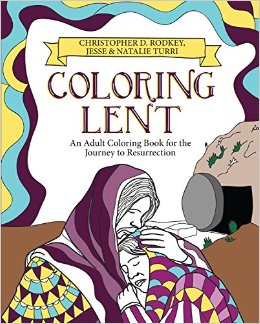 continue to recommend books from Rowan Williams’
continue to recommend books from Rowan Williams’ 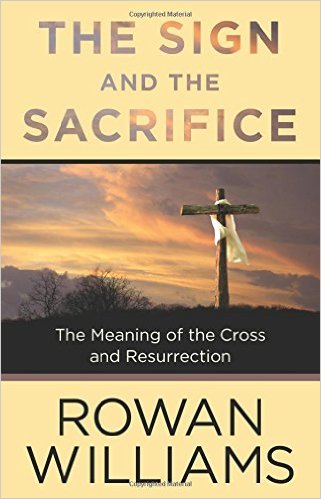 The Sign and the Sacrifice: The Meaning of the Cross and Resurrection (WJK; $15.00) to one by our UCC pastor friend Chris Rodkey, his lectionary-based Coloring Lent: An Adult Coloring Book for the Journey to Resurrection (Chalice Press; $12.99) an adult coloring book that includes some thoughtful and provocative meditations and great art.
The Sign and the Sacrifice: The Meaning of the Cross and Resurrection (WJK; $15.00) to one by our UCC pastor friend Chris Rodkey, his lectionary-based Coloring Lent: An Adult Coloring Book for the Journey to Resurrection (Chalice Press; $12.99) an adult coloring book that includes some thoughtful and provocative meditations and great art.
These next days and following we really, really recommend A Glorious Dark: Finding Hope in the Tension Between Belief and Experience by A.J. Swoboda (Baker; $14.99) which is perfect to read on Holy Saturday. I’ve been pondering 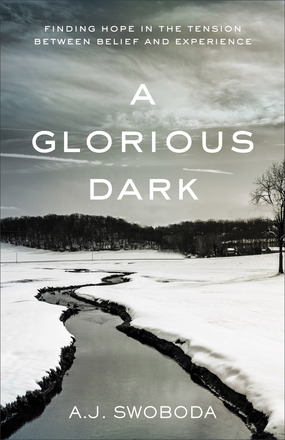 Into Your Hand: Confronting Good Friday by Walter Brueggemann (Cascade; $11.00) which were a set of sermons Walt preached at St. Timothy’s Episcopal Church in Cincinnati one long Good Friday afternoon. We suggest classic books about the atonement, justification, Christ’s suffering, and, of course, the Resurrection. I know many of us are in the thick of this hard stuff.
Into Your Hand: Confronting Good Friday by Walter Brueggemann (Cascade; $11.00) which were a set of sermons Walt preached at St. Timothy’s Episcopal Church in Cincinnati one long Good Friday afternoon. We suggest classic books about the atonement, justification, Christ’s suffering, and, of course, the Resurrection. I know many of us are in the thick of this hard stuff.
I know many of us are also deep in the thick of hard stuff happening in the world. We are faced with hard policy choices about the budget, the terrible gutting of environmental projects, some services to the poor being cut even as we plan to spend more on armaments. The ongoing brutality of the Assad regime breaks our heart and the bombing of Egyptian churches on Palm Sunday reminds us what we all know – these are painful times for many and God calls us to at least try to figure out how to be responsible citizens in the midst of the injustices. In an increasingly globalized world, we know even more than we used to, and Jesus calls us to be faithful and good neighbors, complex as things may be. As Robert Benson put it in his last book, swiping a good line, Punching Holes in the Dark: Living in the Light of the World.
Even debating what we should say and do, what policies we should promote, where to put our limited energies, is itself a matter that causes many of us great tension. May God help us as we talk together as church friends, citizens, neighbors about what should be done.
Hearts & Minds continues to attempt to be a resource center for faithful Christian thinking and living, from your own personal growth to church and congregational renewal to nurturing Christian citizenship that helps us work on issues of peace, justice, racial reconciliation, environmental stewardship, and the like. I will continue to attempt reviews about social concerns that we hope are helpful – as some say we did well a few weeks ago in our review of Rod Dreher’s important The Benedict Option and in my assessment of what one friend has called Princeton Seminary’s Kuyper/Keller-gate. (You can see my list of books by and about Abraham Kuyper and Timothy Keller, here.) Keller, by the way, spoke at that event last week mostly about the importance of Lesslie Newbigin, commending his profound little book Foolishness to the Greeks: The Gospel and Western Culture. We’ve promoted that for years, have included it in our displays at book tables for conferences for decades. Nice to hear Tim so astutely describe its importance to mainline denominational folks and conservative evangelicals alike.
BUT SOMETIMES INSIGHT COMES IN FUN PACKAGES
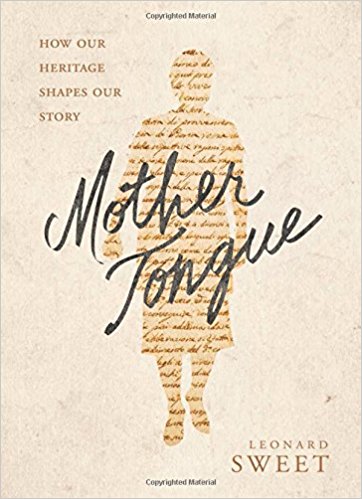 Mother Tongue: How Your Heritage Shapes Your Story Leonard Sweet (NavPress) $15.99 This remarkable book deserves a bigger review than I can give it here, but I can tell you this much: if you have liked any of Len Sweet’s many books or are all curious about his colorful approach to faith and discipleship and congregational renewal, this book is one you simply have to read. He has described it as his most personal and he seems to be feeling a bit vulnerable about it all.
Mother Tongue: How Your Heritage Shapes Your Story Leonard Sweet (NavPress) $15.99 This remarkable book deserves a bigger review than I can give it here, but I can tell you this much: if you have liked any of Len Sweet’s many books or are all curious about his colorful approach to faith and discipleship and congregational renewal, this book is one you simply have to read. He has described it as his most personal and he seems to be feeling a bit vulnerable about it all.
Sweet’s the literary critic, you know, a flamboyant, handsome guy who is known for using screens and digital stuff, postmodern in some quirky Victorian way, a “post-modern pilgrim” as one of his books is called. His playful use of words is unsurpassed and his gift of weaving quotes from the most random sources into a coherent evangelistic message is legendary. Where did he come from? How in the world did somebody who wrote seminal works about semiotics — okay, I’m trying to keep up, but I suppose he’ll just roll his eyes at my pedestrian alliteration there — and who danced the Soul Salsa (noting, cleverly that older folks will think of a condiment but younger folks will think of a dance!) harness this trend-mesitering into a call for radical church renewal? He offered remarkable insights about the coming waves of post-modernity in Soul Tsunami – waves, get it? – and he gave us stunning 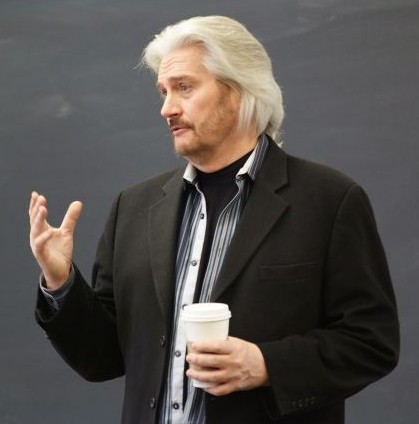 new metaphors for doing church. Aqua Church remains a must-read in my view, and hope you’ll order it from us if you haven’t read it yet. He has a clear-headed but really interesting book on using digital culture for renewal, perfectly called called Viral. Who tells Protestants that we should stop with our individualistic, modernist slogans like “Here I Stand” and replace them with “There We Go”? Who writes books about clever, contemporary preaching and authors books like his recent Bad Habits of Jesus? What kind of edgy, outlier is he?
new metaphors for doing church. Aqua Church remains a must-read in my view, and hope you’ll order it from us if you haven’t read it yet. He has a clear-headed but really interesting book on using digital culture for renewal, perfectly called called Viral. Who tells Protestants that we should stop with our individualistic, modernist slogans like “Here I Stand” and replace them with “There We Go”? Who writes books about clever, contemporary preaching and authors books like his recent Bad Habits of Jesus? What kind of edgy, outlier is he?
Well, here’s the thing: his mother was kicked out of her own denomination, the Primitive Methodist church (for whom she was a passionate preacher and evangelist) because she accepted and wore a wedding ring offered by her husband (Len’s father) who was a more liberal sort of holiness guy, a mere Free Methodist. If he was a Marine Corp type of Methodist she must have been part of the Navy Seal commandos, fit and serious. They were both hardcore and – as Len says in the first chapter of this book mostly about his mother – not only was she removed from her church for wearing this tiny bit of forbidden jewelry, they later got kicked out of the Free Methodist congregation for having a black and white television (or what the preacher called a hell-a-vision.) So, this Christ and culture stuff runs deep in a kid who was forcibly removed from a Wednesday night prayer service. What should the church do about the world?
The lovely, exciting, well-written, and very moving Mother Tongue accomplishes at least two big things (and, for a Len Sweet book, this is underestimating it: there is always a whole bunch of stuff going on at once, and all of his books repay repeated readings!)
Firstly, it is somewhat of a biography or at least tribute to his colorful mother. There has been, he eventually tells us, some remorse shown from what is now the Wesleyan denomination about the mistreatment of Mabel Boggs Sweet, and she is now honored with a plaque somewhere. And, man, she deserves it, because this book is loaded with fascinating stories, good teaching, interesting stuff she taught and stood for. She was a Christian leader and she took her Godly role in pushing her sons into the ways of righteousness very, very seriously.
He tells us that they were Appalachian people, his father from the mountains in upstate New York , his mother from West Virginia, where they spent some of the summers. Len ended up living in Ohio (in what Len informs us is really a West Virginia city) and his mother lived with him there, although often returned to her West Virginia homeland. Do you know that road that memoirist J.D. Vance writes about, that well-worn road from Ohio rust belt towns back home to Appalachia, so regularly traveled in the mid to late 20th century? This road, or one like it, tells the Boggs-Sweet story, too, and Leonard and his brothers (one who is a Presbyterian pastor, by the way – what in the heck happened to him I often wondered) — were raised as Appalachian kids. They ran free in forests and open lots and they came home to supper as mom yelled out the door. They were disciplined sternly and loved well and the Bible and the church and the work of advancing God’s Kingdom played a central part of their self identity. Going to church camp and revivals and camp meetings were non-negotiable. His mother is a more legendary character than I can say and their upbringing is more interesting than I can tell and this book offers just glimpses. But the glimpses are wonderful to read.
The book is about his mother, after all, but he shares in vulnerable ways episodes that are revealing, shaping, formative. I like very much the method of this madness where Sweet names a particular item, a bit of material culture as the scholars call it, to illuminate the story of Mabel Boggs Sweet and her TV watching fundamentalist husband and the boys that didn’t quite remind me of My Three Sons.
So, the chapters are given titles like this:
Ma’s Wedding Ring, Dad’s Hellevision
The Yellow-Painted Pot-Metal Boudoir Light
Rocks
Polio Braces
Yellow Cheese
Lye Soap
Grandfather’s Chair
Glover’s Mange Cure (yep, you read that right, mange cure.)
Potlucks
There are other chapters laden with Americana and old timey tales and what may be some exaggeration, but I bet not. These stories end up being parables that reveal the heart of this Godly woman, perhaps the sort of sturdy Christian disciple that we don’t find much anymore. As Sweet says, “Mother didn’t look for burning bushes. She was one.”
But it’s fun, too, just really nice storytelling. You won’t want to miss one on his mother’s prayer habits called “The Nautical Door.” Be sure to read “Mounds, Mars Bars, and the County Home” and “The Doctor’s Script.”
As the fabulous writer Karen Swallow Prior says, “I found myself hanging on every word in this tenderly written and carefully crafted tribute…”
 I said there are at least two big things going on here. Yes, Mother Tongue is a tribute to Leonard Sweet’s mother and a window into his own formation; anyone wanting to know how Sweet himself has been shaped and why he tends to see things as he does, calling on churches to be creative in seeking renewal, more disciplined and committed, well this will help. But also, there is this broad call to us all to understand our roots, to know where we’ve come from and to wonder, as the cover puts asks, “How Our Heritage Shapes Our Story.” (Sweet, you may recall, has a very interesting look at the heritage of the United Methodist Church called The Greatest Story Never Told: Revive Us Again (Abingdon; $18.99) that might wisely be read after Mother Tongue. Or, for the more stout and convicted that there should be some connection between ancient and future ways, see a book he edited, Postmodern and Wesleyan?: Exploring the Boundaries and Possibilities (Beacon Hill; $15.99.)
I said there are at least two big things going on here. Yes, Mother Tongue is a tribute to Leonard Sweet’s mother and a window into his own formation; anyone wanting to know how Sweet himself has been shaped and why he tends to see things as he does, calling on churches to be creative in seeking renewal, more disciplined and committed, well this will help. But also, there is this broad call to us all to understand our roots, to know where we’ve come from and to wonder, as the cover puts asks, “How Our Heritage Shapes Our Story.” (Sweet, you may recall, has a very interesting look at the heritage of the United Methodist Church called The Greatest Story Never Told: Revive Us Again (Abingdon; $18.99) that might wisely be read after Mother Tongue. Or, for the more stout and convicted that there should be some connection between ancient and future ways, see a book he edited, Postmodern and Wesleyan?: Exploring the Boundaries and Possibilities (Beacon Hill; $15.99.)
Of course we must always contextualize our faith, relate the “old, old story” to the realities of our own age. But how we do that is the big issue, isn’t it? We can learn much from Mabel Bogg Sweet’s sage teachings, but Len’s own telling of the tale – what he has recalled and why he told it and why it is important to us – is a major contribution. This book says that “you will be challenged to steward your faith so that those who follow may likewise be rooted, established, and in pursuit of God’s call on their own lives.” That is, in listening in to Sweet tell his story we are invited to ponder our own. As we see how he frames his own upbringing and offers just a little insight on how this might effect him (and us) today, we learn to do the same. It is wise to attend to our own roots and places and background and heritage, so see how it might shape us today.
Isn’t that one of the reasons we tell these tales of our loved ones, pass the faith stories on, as the Bible commands, from generation to generation? God, apparently, loves history. God obviously loves storytelling. I suspect strongly that God loves Mother Tongue.
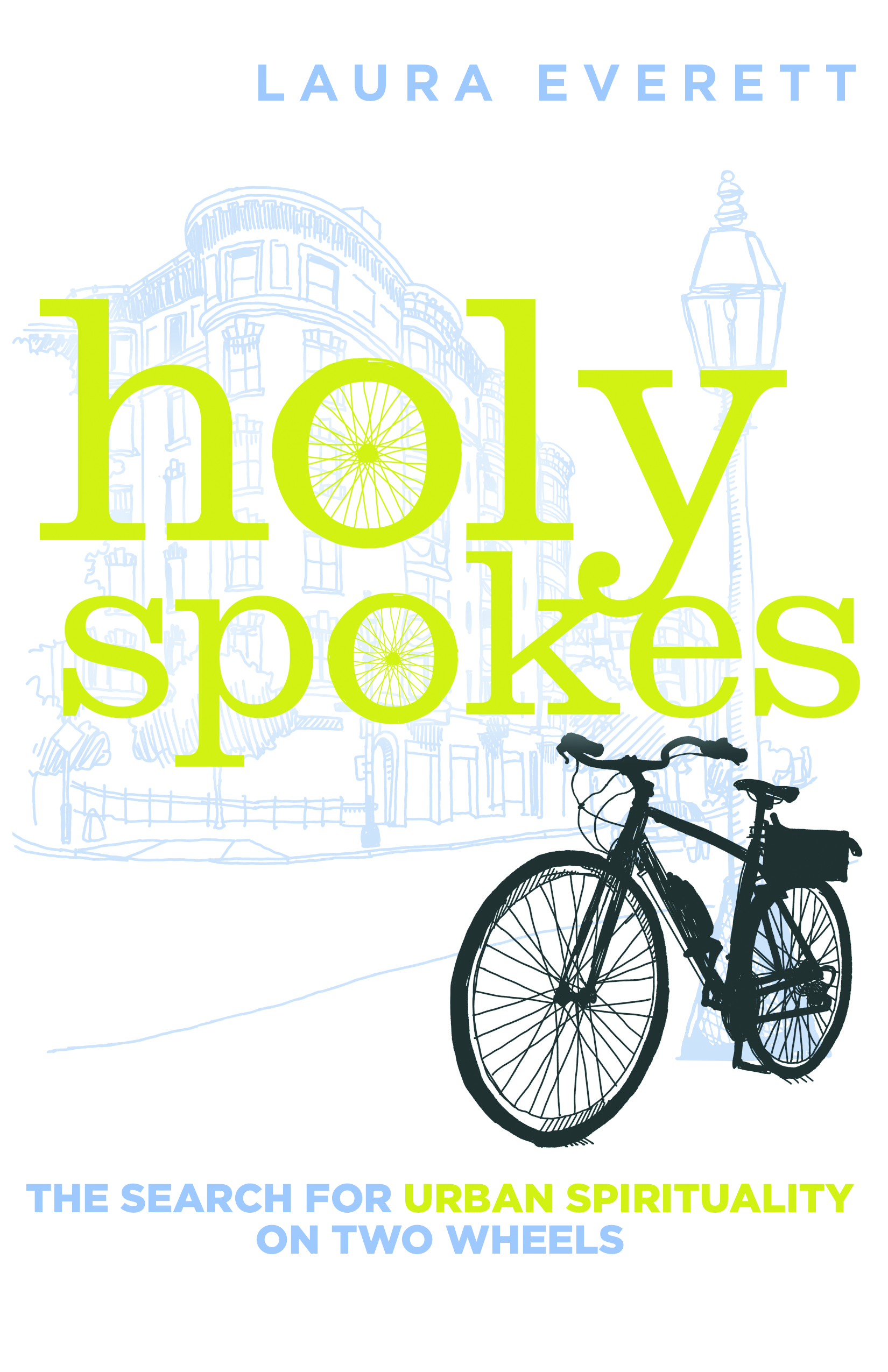 Holy Spokes: The Search for Urban Spirituality on Two Wheels Laura Everett (Eerdmans) $22.99 I don’t even bike and I was eager to see this; the book-lovin’ folks at Eerdmans in bike-friendly Grand Rapids had assured us this was going to be a huge book this spring, that it would be very interesting, a lot of fun, and very well written.
Holy Spokes: The Search for Urban Spirituality on Two Wheels Laura Everett (Eerdmans) $22.99 I don’t even bike and I was eager to see this; the book-lovin’ folks at Eerdmans in bike-friendly Grand Rapids had assured us this was going to be a huge book this spring, that it would be very interesting, a lot of fun, and very well written.
Now that it is here, I can only say “Amen!” even though it isn’t what I would call gospel-focused or evangelical. Well, it is loaded with evangelical zeal about the gospel of cycling. Everett is a pretty serious cyclist and urbanist. I enjoyed her descriptions of different sorts of cycling enthusiasts — the hard-core fixed gear guys in Boston are called “Freds” – and cheered as she deepened her own commitments to ride more and ruminated on her life choices. The author is the Director of the Massachusetts Council of Churches and tells us very little about her work or life outside of her transportation choices (I really wanted more!) but, my, my, does she tell us about her transportation.
As with any embedded study of a serious hobby or sub-culture, there’s some amazing passion, insider baseball, and quirky writing about stuff that many of us wouldn’t know was so darn interesting. From the inevitable sore bum to the dangers to the sexist hassles, Everett tells us more than you might first want to know about the history of bikes, the different weights and kinds, or how chains work, and, a bike enthusiast or not, on every page, you will be sighing and smiling, wanting more. Holy Spokes is a page-turner – believe it or not – and a very holy book.
I happen to think it would be holy even if it were written in mostly a secular approach; she gets how practices are formative, how a sense of place makes us better people, how it is a virtuous thing to know notice stuff, and to know a bit about the very ground on which you walk (or ride.) Her love for life and her honesty about her journey is so real (but never sentimental) that it is beautiful. The title of the book is not just a bit of cleverness. For Laura Everett, and many of the people she introduces us to in this memoir/reflection, her spokes really are holy.
And here is how she helps us get it: the book is, although a study of urban biking, of two-wheeled transportation, it is, as the subtitle says, a book about spirituality. Every chapter starts with an important quote from Brother Lawrence’s enduring Practicing the Presence of God (or from a letter by or about him, one even from a sermon preached at his eulogy in 1666.) Everett has obviously worked with this classic spirituality book and it shows; in every chapter readers will learn how to apply the humble monk’s insights about finding God in the ordinary. Her weaving through frantic traffic, getting “doored” in downtown Boston, or wondering what to wear in below freezing temps is a bit different than Lawrence’s tales of peeling potatoes. But it works. Her urban spirituality is deeply shaped by this monastic rule, this daily practice, this ordinary spirituality.
The book’s chapters, even though they’ve got that Brother Lawrence quote and includes his teaching, is, in fact, truly about biking. The chapter titles are based on various parts of her bike, with some sort of metaphor attached to each. Here are the names of the chapters and what insight she offers, just to give you a sense of how nifty this is:
Frame – Rule of Life
Wheels – Habit
Saddle – Endurance
Tires and Tubes – Border-Crossing
Lights – Visibility
Fork – Rest
Handlebars – Adaptation
Gears — Pacing
Chain — Embodiment
Helmet — Particularity
Brakes – Limitations
You — Joy
There are very handsome line drawings throughout – reminding me of an old classic monastic cookbook we used to have – showing off that part of the bike. This is going to bless cyclists and mere watchers, those who find God in the great outdoors and those of us who live this part of life vicariously through entertaining and wise books just like this. It is a beautiful book.
There is an appendix that shows a Blessings of the Bike service and, movingly, a litany for a Ghost Bike service, marking those killed on the roadways.
As Publishers Weekly put it, Holy Spokes is:
Fresh and delightful… With a window into cycling culture, Everett never loses her focus on her belief that commuting by bicycle can be a cosmic and soul-enriching good.
Or listen to William Lamar, who says of it:
For anyone who has longed to look at the beating heart of their city through the lens of faith, Laura Everett provides a winsome, two-wheeled tour.
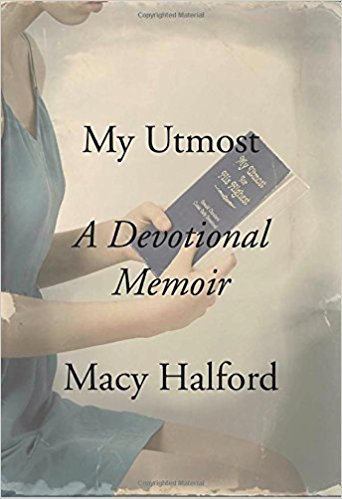 My Utmost: A Devotional Memoir Macy Halford (Knopf) $26.95 This remarkable book has brought me much pleasure, has caused me to ponder–about my life, faith, Christian growth, and the curiosities of Oswald Chambers (author of My Utmost for His Highest, a staple here) who was a much more complicated and curious person than I ever, ever knew. Ms. Halford wonderfully tells the story of her own fascination with Chambers and his famous devotional. This would be good even if it were not so well written, but it just glows at times, making it a truly luminous, artful and sophisticated read. But more, there’s this: Halford’s memoir tells of her growing up in a fundamentalist Texas family, heading off to Barnard College, and landing a prestigious writing job in Manhattan at The New Yorker. Her taking inspiration from this old evangelical chestnut in the city that never sleeps, working with folks who (we can only imagine) never heard of any daily devotional, is quite a plot for a story, no?
My Utmost: A Devotional Memoir Macy Halford (Knopf) $26.95 This remarkable book has brought me much pleasure, has caused me to ponder–about my life, faith, Christian growth, and the curiosities of Oswald Chambers (author of My Utmost for His Highest, a staple here) who was a much more complicated and curious person than I ever, ever knew. Ms. Halford wonderfully tells the story of her own fascination with Chambers and his famous devotional. This would be good even if it were not so well written, but it just glows at times, making it a truly luminous, artful and sophisticated read. But more, there’s this: Halford’s memoir tells of her growing up in a fundamentalist Texas family, heading off to Barnard College, and landing a prestigious writing job in Manhattan at The New Yorker. Her taking inspiration from this old evangelical chestnut in the city that never sleeps, working with folks who (we can only imagine) never heard of any daily devotional, is quite a plot for a story, no?
There’s a great chapter telling of an awkward meeting she attended in the city (mostly to appease her evangelically Baptist mother) with some other evangelical women who work “in Christian publishing”- some of it very conservative and very cheesy – which has a spot-on feel about how a thoughtful, less theologically dogmatic, maybe less pious, if still God-haunted, serious professional in the elite field of letters and literature relates to these other zealous, pleasant, mostly Southern women who so earnestly want to pray for her witness in her job among the pagans. (“Do you review Christian books in your job there?” they want to know.) Halford has very little in common with these women – her faith seems somehow different than theres, her expression of faith is certainly different, and her intellectual, social, and political convictions are much different – but then one of them quotes by memory a bit from Oswald Chambers. Another knows his work well, and Macy bonds immediately. How curious.
She is, admittedly, not where she once was, but continues to read this Godly devotional each day as she has since she was 15. She is alarmed when it becomes known that then-President Bush, waging an unpopular war in the Middle East and generally despised by the elite among whom she works, said that My Utmost for His Highest was his favorite book. (We’ve learned a bit about her life by this time, in the fashion of a good memoir, about her early days, her churchy memories, her baptism at church camp, the awkwardness of being an evangelical involved in a rather rowdy theater group where there was drinking and more.)
Eventually, she leaves her job at The New Yorker to work full time on her story, mostly working around the question of how it is that some are so deeply the writing of the late 1800s Scottish preacher. She moves to Paris, and, oh my, that’s interesting.
 I won’t spoil too much, but besides the good writing, the story of a Christian woman finding her way in the work world, discerning her call to be a writer, the element of a subtly told faith journey, telling how a young adult comes to clarify her own faith, once she has moved beyond her fundamentalist past, there is much here to supplement other biographies of Chambers. The book is as much about him as it is about her. The allusive Oswald Chambers was a mystic, an artist, a preacher, a colorful writer, an eccentric thinker – influenced as he was by romanticism and in tune with Scottish characters like George MacDonald. Chambers died while serving as a chaplain among British soldiers in World War I in Northern Africa. His
I won’t spoil too much, but besides the good writing, the story of a Christian woman finding her way in the work world, discerning her call to be a writer, the element of a subtly told faith journey, telling how a young adult comes to clarify her own faith, once she has moved beyond her fundamentalist past, there is much here to supplement other biographies of Chambers. The book is as much about him as it is about her. The allusive Oswald Chambers was a mystic, an artist, a preacher, a colorful writer, an eccentric thinker – influenced as he was by romanticism and in tune with Scottish characters like George MacDonald. Chambers died while serving as a chaplain among British soldiers in World War I in Northern Africa. His 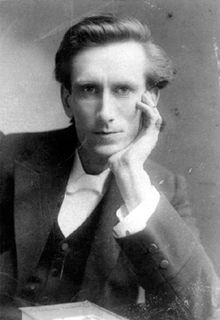 legacy lives on as one of the best-selling authors in all of history. That such a fascinating, artful, intellectually rigorous, missionary zealot is so popular among ordinary and often culturally conservative American evangelicals – some who would blanch if they knew of the artists he admired, the philosophy he read, the books he loved – is a wonderment.
legacy lives on as one of the best-selling authors in all of history. That such a fascinating, artful, intellectually rigorous, missionary zealot is so popular among ordinary and often culturally conservative American evangelicals – some who would blanch if they knew of the artists he admired, the philosophy he read, the books he loved – is a wonderment.
That a very prominent, respected secular publishing house (Alfred Knopf) published this evangelical memoir about a young woman’s study of Oswald Chambers, is also a wonderment. (How did that even happen?) It received a wonderful, insightful review in The New York Times just a week or so ago. And, I suspect that most Christian bookstores won’t stock this, which, although perhaps ironic, is part of the sub-sub-text of this very book. How do Christian books make a difference in people’s lives and how to those raised in the strict confines of a deep sub-culture learn to navigate the wider world? Mr. Chambers helped Marcy Halford, and now her story helps us all. What a book.
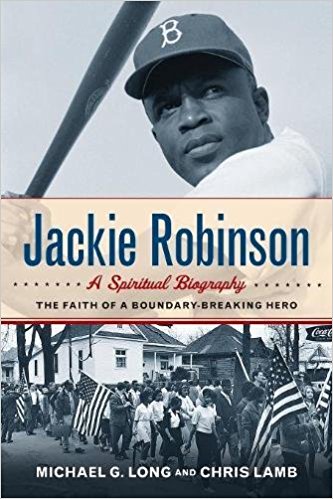 Jackie Robinson: A Spiritual Biography –The Faith of a Boundary-Breaking Hero Michael Long & Chris Lamb (WJK) $ I don’t have to say much about this; we all know who Jackie Robinson is, and we may also know that there haven’t been quite enough voices really telling his remarkable story that well. This is the best book, I have reason to believe, that has yet been done about the great black player who also was an outspoken critic of racial segregation and early advocate for civil rights. He was a hero to many and he paid up, using his fame as a way to speak wisely about this hard, hard, stuff.
Jackie Robinson: A Spiritual Biography –The Faith of a Boundary-Breaking Hero Michael Long & Chris Lamb (WJK) $ I don’t have to say much about this; we all know who Jackie Robinson is, and we may also know that there haven’t been quite enough voices really telling his remarkable story that well. This is the best book, I have reason to believe, that has yet been done about the great black player who also was an outspoken critic of racial segregation and early advocate for civil rights. He was a hero to many and he paid up, using his fame as a way to speak wisely about this hard, hard, stuff.
You may know that Michael Long – a central Pennsylvania religion prof near us at Elizabethtown College – has a real knack for drawing on primary sources to create biographies that are more than pop studies or overviews, but are rigorously informed by behind the scenes stuff that few have bothered to study. For instance, he did a biography of the Rev. Mr. Fred Rogers based mostly on his own letters and private correspondence called Peaceful Neighbor: Discovering the Countercultural Mister Rogers. He has previously released an amazing collection of Jackie Robinson’s letters called First Class Citizenship: The Civil Rights Letters of Jackie Robinson. (That was actually named one of the best books of the year by Publishers Weekly.)
Chris Lamb, by the way, is a professor of journalism so knows a thing or two about researching, writing, and telling a good story. And he’s written about this, too, including Blackout: The Untold Story of jack Robinson’s First Spring Training and Conspiracy of Silence: Sportswriters and the Long Campaign to Desegregate Baseball (which was called one of the best baseball books of all time by the Huffington Post.) That these too socially conscious sports fans have both written niche books about Jackie Robinson before makes them perfectly suited to create this, what should be considered the definitive book on the great man. The last page, telling about his funeral procession from Harlem (saying what songs the choir sang, and the old spiritual performed by the great Roberta Flack) into Brooklyn is the perfect ending to a great biography.
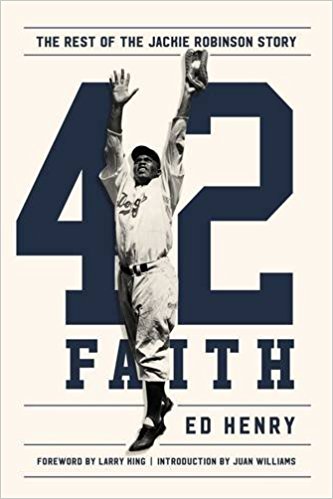 If you are a real fan, follow this insightful one up with another very good one that just came out, 42 Faith: The Rest of the Jackie Robinson Story written by Ed Henry (Thomas Nelson; $24.99.) It has a great cover, a nice hardback heft, and has gotten some good advanced buzz. The author is a lifetime baseball fan, and a world-class reporter. In fact, Henry has been the primary Fox News Reporter covering the White House throughout the Obama years. He has also served in the prestigious post of president of the White House Correspondents’ Association from 2012-2013, after being elected in an unopposed election by his peers in the White House press corps. Prior to joining FNC, Henry was at CNN from 2004-2011, where he served as the network’s senior White House correspondent. Henry began his career working for Pulitzer Prize-winning investigative journalist Jack Anderson.
If you are a real fan, follow this insightful one up with another very good one that just came out, 42 Faith: The Rest of the Jackie Robinson Story written by Ed Henry (Thomas Nelson; $24.99.) It has a great cover, a nice hardback heft, and has gotten some good advanced buzz. The author is a lifetime baseball fan, and a world-class reporter. In fact, Henry has been the primary Fox News Reporter covering the White House throughout the Obama years. He has also served in the prestigious post of president of the White House Correspondents’ Association from 2012-2013, after being elected in an unopposed election by his peers in the White House press corps. Prior to joining FNC, Henry was at CNN from 2004-2011, where he served as the network’s senior White House correspondent. Henry began his career working for Pulitzer Prize-winning investigative journalist Jack Anderson.
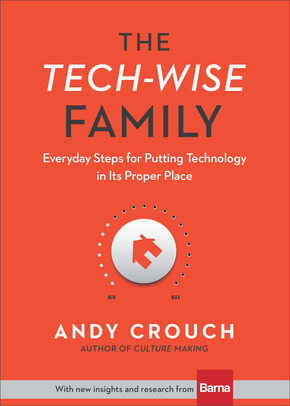 The Tech-Wise Family: Everyday Steps for Putting Technology in Its Proper Place Andy Crouch (Baker Books) $13.99 Well, what can I briefly say about this brand new book by one of the most important writers in contemporary Christianity? You know how much I insist we should all read — a couple of times! – his Culture Making, his reflection on power, Playing God, and his little, very wise book about human flourishing through embracing risk and strength, simply called Strong and Weak.
The Tech-Wise Family: Everyday Steps for Putting Technology in Its Proper Place Andy Crouch (Baker Books) $13.99 Well, what can I briefly say about this brand new book by one of the most important writers in contemporary Christianity? You know how much I insist we should all read — a couple of times! – his Culture Making, his reflection on power, Playing God, and his little, very wise book about human flourishing through embracing risk and strength, simply called Strong and Weak.
This fabulous new book, which starts with a foreword by Andy and Catherine’s teenage daughter, Amy, is a reflection on the deeper meaning of life in these techy days. Yes, it offers some good advice for parents about making good choices and “reclaiming real life in a world of devices.” There is stuff about family life and models for how to get kids on board, uniting around certain limits and practices and appropriate uses of technology. Although not as lengthy or dour as books like Amusing  Ourselves To Death or The Shallows, this is one of those great books that meanders through a lot of great truth. There are chapters like “Shaping Space” and “The Deep End of the (Car) Pool” and “The Good New About Boredom.” There is a chapter on embodiment (okay, it’s about sex) and a lovely chapter called “Why Singing Matters” and a powerful one called “In Sickness and Health.”
Ourselves To Death or The Shallows, this is one of those great books that meanders through a lot of great truth. There are chapters like “Shaping Space” and “The Deep End of the (Car) Pool” and “The Good New About Boredom.” There is a chapter on embodiment (okay, it’s about sex) and a lovely chapter called “Why Singing Matters” and a powerful one called “In Sickness and Health.”
This is much, much more than a book about limiting screen time, as the beautiful writer Shauna Niequist says. Just listen to this:
To be honest, before I opened this book I expected to be challenged on the topic of screen time for my kids. I was, certainly. What I did not expect was to be offered a vision for family life and faith and character so compelling and inspiring that it made me weep, made me reconsider many aspects of our home, made me profoundly thankful for this beautiful and important book.
A nother helpful bit of The Tech-Wise Family, besides its wise rumination on walking through ordinary days with a deeper sense of family living in a particular place with particular habits and postures, there is some brand new data presented with some fresh insights from the Barna Group. Sort of like their wonderful little Frames books, these considerable essays surround info-graphics and comment a bit on some of the latest data about technology, our habits, and our deepest longings as found by this useful research project.
nother helpful bit of The Tech-Wise Family, besides its wise rumination on walking through ordinary days with a deeper sense of family living in a particular place with particular habits and postures, there is some brand new data presented with some fresh insights from the Barna Group. Sort of like their wonderful little Frames books, these considerable essays surround info-graphics and comment a bit on some of the latest data about technology, our habits, and our deepest longings as found by this useful research project.
Besides these helpful and interesting charts and colorful info-graphics there are occasional “Realty Checks” portions that give us an honest look through a real window into the Crouch household. He is a broad social thinker and good cultural critic and a wise theological voice – if often positive, inviting us to a pro-active approach of doing good stuff rather than merely avoiding the bad – so these little bits from the Crouch household brings it all down to where you and I live. This is just one more feature making this a very, very useful little book.
If you follow Mr. Crouch’s work carefully you will know he’s a thinker, a fine writer, musician, speaker, and – among other influences – has been informed by the Montana Catholic philosopher Dr. Albert 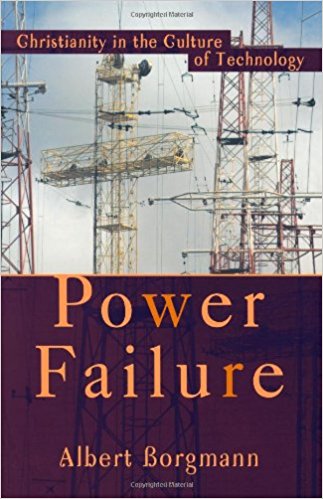
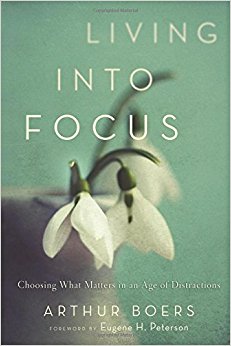 Borgmann. Borgmann’s work (somewhat influenced, perhaps, by his friendship with Presbyterian Eugene Peterson) has become very important to many of us, from his engagement with post-modernity, his worries about the way technology has shaped the quintessential American character, and how, to navigate this well, we need to discover attentive focal practices, as he calls them. (See the wonderful book about all that by called Living Into Focus: Choosing What Matters in an Age of Distractions by Art Boers. See also Professor Borgmann’s most overtly Christian reflection on our technological age called Power Failure: Christianity in the Culture of Technology.)
Borgmann. Borgmann’s work (somewhat influenced, perhaps, by his friendship with Presbyterian Eugene Peterson) has become very important to many of us, from his engagement with post-modernity, his worries about the way technology has shaped the quintessential American character, and how, to navigate this well, we need to discover attentive focal practices, as he calls them. (See the wonderful book about all that by called Living Into Focus: Choosing What Matters in an Age of Distractions by Art Boers. See also Professor Borgmann’s most overtly Christian reflection on our technological age called Power Failure: Christianity in the Culture of Technology.)
Well, Andy has absorbed much of all of this and he himself says this in an afterward to The Tech-Wise Family where he notes the influence of “the life work of Albert Borgmann, especially his 1987 book Technology and the Character of Contemporary Life: A Philosophical Inquiry.”
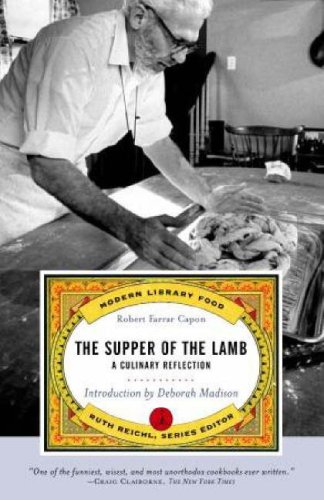 But Andy then says this:
But Andy then says this:
Dr. Borgmann’s work is, entirely appropriately, far from light reading, so you may want to warm up with one book that influenced him and has delighted and directed our own family: Robert Farrar Capon’s The Supper of the Lamb. Although published nearly fifty years ago, Capon’s theological cookbook is still the ideal summons to something better than our technological shallows – in the kitchen and everywhere else. Bon appetit – and bon courage.
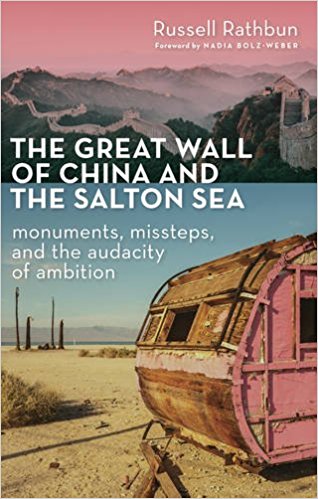 The Great Wall of China and the Salton Sea: Monuments, Missteps, and the Audacity of Ambition Russell Rathbun (Eerdmans) $21.99 I loved this book I’m going to re-read it. I described it briefly before here at BookNotes, but just have to suggest it again – in an allusive, odd-ball way, it offers much great wisdom in one helluva read. Here is what I said, suggesting it as a Lenten read, actually. Okay, maybe that was a stretch, and if I had time, I’d love to just write a whole new review, since I’m so taken with this book. But, for now, here ya go:
The Great Wall of China and the Salton Sea: Monuments, Missteps, and the Audacity of Ambition Russell Rathbun (Eerdmans) $21.99 I loved this book I’m going to re-read it. I described it briefly before here at BookNotes, but just have to suggest it again – in an allusive, odd-ball way, it offers much great wisdom in one helluva read. Here is what I said, suggesting it as a Lenten read, actually. Okay, maybe that was a stretch, and if I had time, I’d love to just write a whole new review, since I’m so taken with this book. But, for now, here ya go:
Oh, man-o-man, this deserves a longer review and I hope I can get back to this to tell you even more about how I liked it so. I’ve been pondering this since I lost a bit too much sleep staying up reading (you’ve heard that phrase “I couldn’t put it down,” right?) This is an odd book, about an odd topic, and it is hard to say if it is creative nonfiction, a memoir of sorts, a travelogue, a family history, or some crazy-eyed, made-up novel. I say this mostly because a book he wrote a decade ago, a kind of novel called Post Rapture Radio, was so genre bending and spectacular (don’t get me started on how that wonderfully messed with my mind.) Since that dive into the deep end of the creative waters, Rathbun remains a pastor at the non-traditional House of Mercy (serving along side the excellent wordsmith and preacher herself, Debbie Blue) in Saint Paul, MN. That dear Nadia Bolz-Weber wrote a great introduction to this makes sense. She’s a fine, rather non-conventional pastor of a church for the “accidental saints” and other assorted odd-ball, unchurched, so a soul-mate of RR, I suppose, and a great storyteller. So she gets him.
But more importantly, as Nadia says in the preface, and as Debbie Blue says on the back cover blurb (sharing space with, I can’t not tell you, Gordon Gano of the Violent Femmes) Russell Rathbun loves people, loves stories, loves that liminal place where story and words and history collide, even as he “hilariously unravels tales of our folly.” Which is to say (stay with me here) this is a Lenten book for those who don’t want a Lenten book. It is very enjoyable but, without being heavy handed, it is a study of the somewhat dark and twisted side of human foibles.
The plot line, such as it is, is simple: he criss-crosses across the globe visiting the legendary Salton Sea in Southern California’s desert and the Great Wall of China, the only two man-made objects (or so he heard growing up) that one can see from outer space.
He then launches into some remarkable re-telling of Bible stories, not only the flooding narrative from Noah and Ark et. al., but also the Tower of Babel story in Genesis 11. I’m not spoiling much (you can read it in the subtitle) to say that at the end of the day, this entertaining romp through his travels trying to visit these wild, storied, places, ends up being a book about hubris. Or, as Bolz-Weber says, since there is “no purity in the world,” it is about “the ambiguity of ambition.”
Rathbun’s reporting from China is riveting and his quick history of the rise of Chairman Mao and, importantly, his wife and the notorious Gang of Four is worth the price of the book. It tells you more about his fluency in pop culture to note that he also talks about the 1980s punk band of that name.
Years ago I read a book by one of my favorite writers, Dennis Covington, called Redneck Riviera which is about Covington trying to find out why his late father had some dumb deed to some swamp land in Florida. He was, apparently, ripped off and done wrong, and Covington decides to make it right, tracking down the Floridian long-ago deed dealers. Rathbun’s search isn’t quite that dramatic or dangerous and his story is more gentle and more haunting — but there are similarities: why did his modest, farmer grandfather end up with a deed to some luxury lot on the edge of the Salton Sea? It doesn’t make sense. What was going on there, and why did it end up to be so much of nothing? What sort of American dreams were shaping the development there and how did it go so wrong? I think his answers are different than Covington’s and they are closer to home.
And besides that stuff about hubris and ambition and pride and our human condition, there’s joy. As the stellar review in Publishers Weekly put it, it is “an explication of the mundane inside notions of the colossal or the grand, and a model of how to truly live and appreciate the world.”
Morgan Meis, a writer who contributes to the New Yorker, says,
I want to read everything Russell Rathbun has written — he’s funny and honest and attuned to the tragic and absurd. His prose made me laugh out loud, and it has made me cry. I cannot recommend The Great Wall of China and the Salton Sea more highly.
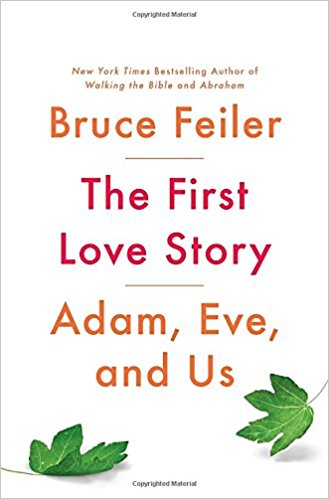 The Very First Love Story: Adam, Even, and Us Bruce Feiler (Penguin Press) $28.00 I am sure I don’t have to tell you who Feiler is or what a fun writer he is. He edits the “This Life” column for The New York Times and became famous for doing embedded sorts of creative nonfiction, such as the one where he joins the circus or the one about his journeys to the far East called Learning to Bow. His Council of Dads was a heart-warming, tear-jerking powerhouse – he was diagnosed with a terminal cancer and gathered a group of dads to promise to help raise his daughter after he was gone. His most famous, certainly among church folk, was Walking the Bible where he searched for his own long-lost Jewish faith by, literally, trekking around the Holy Land. The similar interfaith hike to hang out with Arabs, Jews, and ancient Christians in the Middle East called Abraham was remarkable, too. We highly recommend them all as just wonderful books to have and enjoy and from which to learn much.
The Very First Love Story: Adam, Even, and Us Bruce Feiler (Penguin Press) $28.00 I am sure I don’t have to tell you who Feiler is or what a fun writer he is. He edits the “This Life” column for The New York Times and became famous for doing embedded sorts of creative nonfiction, such as the one where he joins the circus or the one about his journeys to the far East called Learning to Bow. His Council of Dads was a heart-warming, tear-jerking powerhouse – he was diagnosed with a terminal cancer and gathered a group of dads to promise to help raise his daughter after he was gone. His most famous, certainly among church folk, was Walking the Bible where he searched for his own long-lost Jewish faith by, literally, trekking around the Holy Land. The similar interfaith hike to hang out with Arabs, Jews, and ancient Christians in the Middle East called Abraham was remarkable, too. We highly recommend them all as just wonderful books to have and enjoy and from which to learn much.
This new one, full of wit and wisdom, is a study (if one can call this gregarious exploration a study) of the story of Adam and Eve; from there, he jumps in to the question of what this Biblical story has to do with modern love. Searching for intimacy, community, sex, family? He is the man. (His most recent book, The Secret of Happy Families was a witty compilation of the best wisdom that all the good self-help books about family life offer, so he’s been working this wheelhouse for a while.) The advanced praise of the brand new The First Love Story comes from sources far and wide, and sharp scholars, pundits, writers, and thought-leaders have weighed in, saying our revealing this portrait is and how, in the words of James Martin, this project can make “a seemingly hidebound topic come alive and the oldest Bible stories seem fresh, inspiring, and even exciting.”
And how about this for an extra feature: writer of Muslim-Christian relations, Resa Aslan says of The First Love Story, “Feiler’s book forces even the most experienced of religious scholars to rethink our understanding of sacredness and profanity.” Yes!
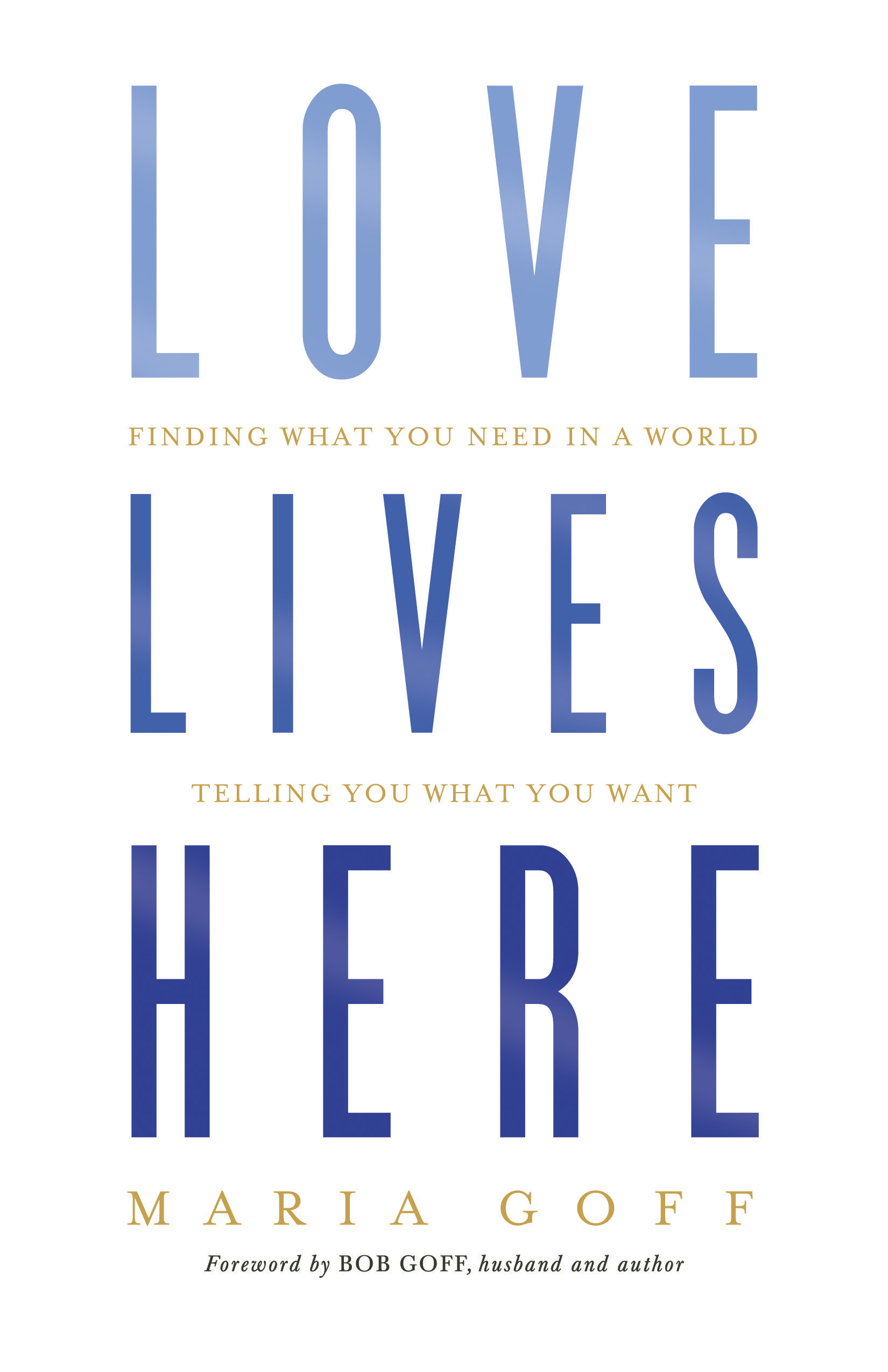 Love Lives Here: Finding What You Need in a World Telling You What You Want Maria Goff (Thomas Nelson) $17.99 I hate to pitch a book by a woman primarily in light of what her husband has done, but Bob Goff and Sweet Maria are such a couple, partners-in-crime, a pair — dare I say, a pair of wild cards? Bob Goff is one of the most popular and well-loved speakers traveling around conferences and events, hosting folks at his own gigs (sometimes he and Maria bring crews of folks to their own getaway lodge along the coast in British Columbia, just because they want folks to meet other folks, genuine, relational, loving service, yes, but also a bit of strategic planning, what is dully called networking. The Goffs turn hospitality into a gracious gift, yes, but sometimes as Kingdom asset. So and so should know so and so as they really ought to partner in this project or that trip or this ministry. Without it seeming forced, these capers they tell us about (and other people tell about in their own books, famously Donald Miller in A Million Years in a Thousand Days) bring good stuff into the world, and always with a belly laugh. If you know Bob, you know he sincerely says “How cool is that?” probably every single day. His book, loaded with these stories, is simply called Love Does.
Love Lives Here: Finding What You Need in a World Telling You What You Want Maria Goff (Thomas Nelson) $17.99 I hate to pitch a book by a woman primarily in light of what her husband has done, but Bob Goff and Sweet Maria are such a couple, partners-in-crime, a pair — dare I say, a pair of wild cards? Bob Goff is one of the most popular and well-loved speakers traveling around conferences and events, hosting folks at his own gigs (sometimes he and Maria bring crews of folks to their own getaway lodge along the coast in British Columbia, just because they want folks to meet other folks, genuine, relational, loving service, yes, but also a bit of strategic planning, what is dully called networking. The Goffs turn hospitality into a gracious gift, yes, but sometimes as Kingdom asset. So and so should know so and so as they really ought to partner in this project or that trip or this ministry. Without it seeming forced, these capers they tell us about (and other people tell about in their own books, famously Donald Miller in A Million Years in a Thousand Days) bring good stuff into the world, and always with a belly laugh. If you know Bob, you know he sincerely says “How cool is that?” probably every single day. His book, loaded with these stories, is simply called Love Does.
Well, it really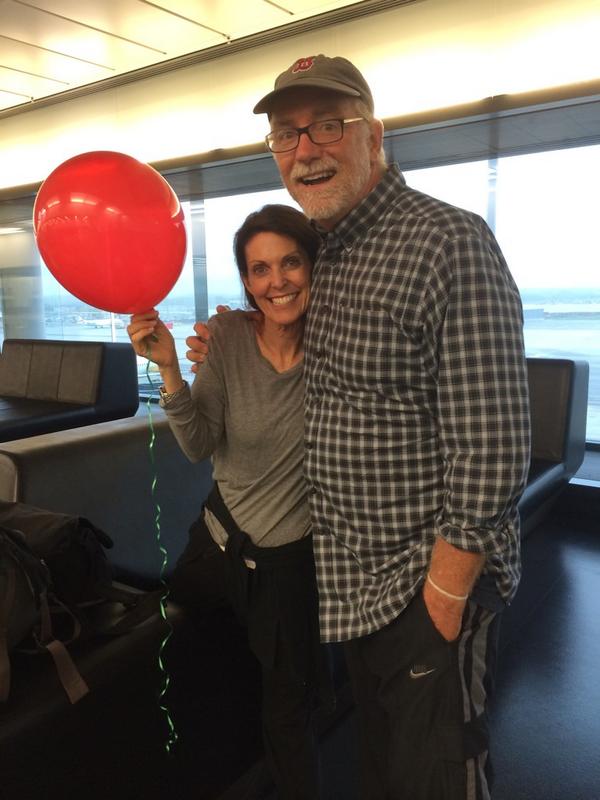 does. But Bob doesn’t do this cool stuff alone, and he is always clear about that. He tells of his wife’s role in his life sometimes, but it is, after all, her story, and we are all so, so glad she has allowed us into her journey in this new book.
does. But Bob doesn’t do this cool stuff alone, and he is always clear about that. He tells of his wife’s role in his life sometimes, but it is, after all, her story, and we are all so, so glad she has allowed us into her journey in this new book.
Maria is – shall we say – less extroverted than Bob, so this may not have come as naturally to her. But she is in on the capers, has stories to tell, travels of her own, mission projects, mentoring, surprising hardships and more. If one wants to know how “love does” in the Goff movement, read this. If you ever read yet another tweet from Bob from some war zone or ghetto or hard place where he is using his lawyering skills to help set policy in a developing country or his storytelling skills to encourage younger activists, or using his energies to create spaces of peace and justice in Africa, or fighting sexual trafficking in India, or starting another school, even in ISIS-occupied territory, well, just know you haven’t heard the half of it. Until now – Maria’s Love Lives Here really does tell the backstory, what goes down on the home front, and how she and her kids (now grown up) have been shaped by living with such a man. There wasn’t much of a road map for this kind of lifestyle, and Maria as much as Bob helped create this family, it’s stability and energy and ability to become a veritable tsunami of love around the world.
Okay, maybe that tsunami bit was a bit much. I admire Bob and Beth and I have so enjoyed being with Maria, if only briefly, — a quieter, classy, leader, obviously a truly caring friend, a mentor, wife and mom. How can one step into this kind of blend of reaching out, serving, and being a social entrepreneur that makes a difference in far away places like Uganda or Northern Iraq, and show so much enthusiastic care for so many folks? There’s even a story about Nepal. Who goes to Nepal?
However, this book is full of stories not just of the home-side backstory of Bob and his work – he negotiates business contracts sometimes at Disneyland — it is an example of Maria’s own kindness, her outreach and friendship with people far and wide. We could all be inspired to channel God’s grace just a bit more clearly just by hearing how a person like Maria manages all this, and how – even though she is a bit of an introvert – she pours herself out for others. Love Lives Here is a blast to read, fun and interesting, but it will sneak up on you, slowly giving you courage to reach out and be more. Sure, God has put some famous people into their lives, young writers, ethical entrepreneurs, missionary leaders, rock musicians, artist types and they have had the ability to pull of some amazing projects. Most of us don’t travel in those cool circles (or around the world.) Still, there is so much to learn, so much here to motivate us to be more hospitable and more caring, to turn our own houses into real homes.
I love what Shelly Giglio chief strategist for sixstepsrecords and co-founder, of thePassion Conferences, and fellow church planter of Passion City Church (and, let’s admit it, wife of a famous evangelical husband, leader, author, co-founded of the huge Passion events.)
She says:
Love Lives Here is every bit as warm and kind as you’d expect from an author known to most of the world as Sweet Maria. If you love the feeling of gaining a new best friend, read this book. If you’d ever wondered how a life some may consider quiet can incrementally impact the world, read this book.
A famous writer who brings a great gift of honest spiritual stuff is Shauna Niequist, whose stories are told in books like her recent Perfect Over Present. (Another look at some hard stuff in life is her under-rated Bittersweet.) She writes about how Maria befriended her, how their relationship meant a lot. Listen to her:
In a moment in my life when I was desperately looking for direction, God used my friendship with Maria to rekindle in me a long-held vision for hospitality that I’d allowed to be obscured by far less important things. This beautiful book will do that same sacred work for so many people. Maria is an example to me–the kind of mother I aspire to be, the kind of gatherer of people I aspire to be. I’m so very thankful for this lovely book, and the heart and wisdom written on every page.
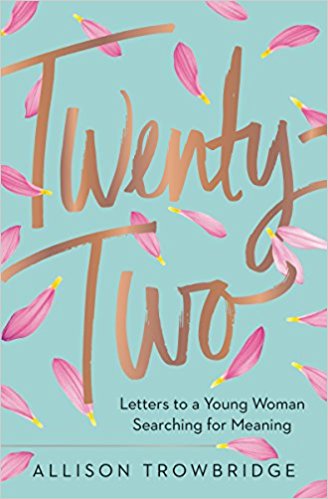 Twenty-Two: Letters to a Young Woman Searching for Meaning Allison Trowbridge (Thomas Nelson) $22.99 This very handsome hardback book is a set of letters by a vibrant young evangelical woman written to a fictional college woman named Tish who wants a mentor, wants to think about her college life but more, what comes next, and desires a thoughtful, informed, life. It offers great spiritual wisdom, is overtly Christian, but there’s stuff about travel, about internships, about jobs, and relationships, about reading fiction, just all kinds of sharp advise. Endorsements on the back are from some fairly conventional folks, but also real visionaries and activists like Bob Goff. It is a celebration of life, a conversation with a friend, a guide to life especially for younger women. Brand new. Thoughtful but also just really, really lovely.
Twenty-Two: Letters to a Young Woman Searching for Meaning Allison Trowbridge (Thomas Nelson) $22.99 This very handsome hardback book is a set of letters by a vibrant young evangelical woman written to a fictional college woman named Tish who wants a mentor, wants to think about her college life but more, what comes next, and desires a thoughtful, informed, life. It offers great spiritual wisdom, is overtly Christian, but there’s stuff about travel, about internships, about jobs, and relationships, about reading fiction, just all kinds of sharp advise. Endorsements on the back are from some fairly conventional folks, but also real visionaries and activists like Bob Goff. It is a celebration of life, a conversation with a friend, a guide to life especially for younger women. Brand new. Thoughtful but also just really, really lovely.
This would be ideal for any young adult woman, and may be a great gift for a college grad. Of course, our favorite book to give to a serious Christian transiting out of college is After College: Navigating Transitions, Relations and Faith by Erica Young Reitz and my own little collection of motivational and inspiration Kingdom speeches, Serious Dreams: Bold Ideas for the Rest of Your Life. But I’ll tell you more about those later. For any “anytime” gift, a great read, and a way to walk alongside a thoughtful young woman in her 20s, Allison Trowbridge’s Twenty-Two is a gem.
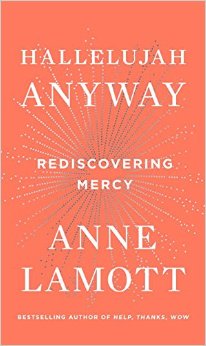 Hallelujah Anyway: Rediscovering Mercy Anne Lamott (Random House) $20.00 I wrote briefly about this the other day although I myself have shown great restraint in not reading this yet. It’s sitting here calling out to me, and after Easter I’ll so enjoy it, I’m sure. I hear she’s doing a speaking tour to promote the book and if you intend to hear her, you could get the book now, and not wait in line at the author gig. Anyway, if you’re an Annie fan, you’ll love this further collection of well written, casual, remarkably-told stories and essays. She is not Marilyn Robinson in her writing style, but she is full of important substance, honest self-revelation, interesting glimpses of memoir and creative writing. She’s blunt and funny and at times deeply moving. This is going to be one of the bigger books of the Spring, and we’re happy to alert you to it, now. As you can get from the subtitle, the theme of the book is mercy.
Hallelujah Anyway: Rediscovering Mercy Anne Lamott (Random House) $20.00 I wrote briefly about this the other day although I myself have shown great restraint in not reading this yet. It’s sitting here calling out to me, and after Easter I’ll so enjoy it, I’m sure. I hear she’s doing a speaking tour to promote the book and if you intend to hear her, you could get the book now, and not wait in line at the author gig. Anyway, if you’re an Annie fan, you’ll love this further collection of well written, casual, remarkably-told stories and essays. She is not Marilyn Robinson in her writing style, but she is full of important substance, honest self-revelation, interesting glimpses of memoir and creative writing. She’s blunt and funny and at times deeply moving. This is going to be one of the bigger books of the Spring, and we’re happy to alert you to it, now. As you can get from the subtitle, the theme of the book is mercy.
“I’m not sure I even recognize the ever-presence of mercy anymore, the divine and human: the messy, crippled, transforming, heartbreaking, lovely, devastating presence of mercy. But I have come to believe that I am starving to death for it, and my world is too.”
BookNotes

SPECIAL
DISCOUNT
ANY ITEM MENTIONED
10% off
order here
takes you to the secure Hearts & Minds order form page
just tell us what you want
inquire here
if you have questions or need more information
just ask us what you want to know
Hearts & Minds 234 East Main Street Dallastown, PA 17313
717-246-3333
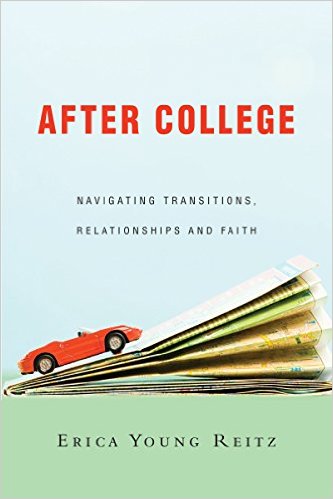 After College: Navigating Transitions, Relationships and Faith Erica Young Reitz (IVP) $16.00 I want to keep this review fairly brief so you can get right to ordering them, but I could go on and on and about this exceptionally well written book. Erica, as I have said often in this newsletter, is a very dear friend and a great young mom and esteemed campus minister, a good colleague in the work of the CCO. Her semester-long “Exit” program at Penn State University where she and her volunteer team mentors a class of college seniors to prepare them for their transition to life after college is exceptionally well received, with participants exclaiming how life-changing and helpful it has been. It was out of many years of doing this, this experience of teaching and equipping and encouraging college seniors as they prepared for “real life” that she wrote this book. She nicely tells real life stories, not only about college seniors and the immediate aftermath of their graduation but of former students in the years following their departure from the close-knit Christian fellowship group and community experienced in their college years. Erica has wisely followed-up her young friends, seeing what sort of church they found in their new towns, how they were doing in discerning their vocations and securing new jobs, and what kind of social and emotional needs they had as young twenty-somethings new to the workforce and perhaps to a new community.
After College: Navigating Transitions, Relationships and Faith Erica Young Reitz (IVP) $16.00 I want to keep this review fairly brief so you can get right to ordering them, but I could go on and on and about this exceptionally well written book. Erica, as I have said often in this newsletter, is a very dear friend and a great young mom and esteemed campus minister, a good colleague in the work of the CCO. Her semester-long “Exit” program at Penn State University where she and her volunteer team mentors a class of college seniors to prepare them for their transition to life after college is exceptionally well received, with participants exclaiming how life-changing and helpful it has been. It was out of many years of doing this, this experience of teaching and equipping and encouraging college seniors as they prepared for “real life” that she wrote this book. She nicely tells real life stories, not only about college seniors and the immediate aftermath of their graduation but of former students in the years following their departure from the close-knit Christian fellowship group and community experienced in their college years. Erica has wisely followed-up her young friends, seeing what sort of church they found in their new towns, how they were doing in discerning their vocations and securing new jobs, and what kind of social and emotional needs they had as young twenty-somethings new to the workforce and perhaps to a new community.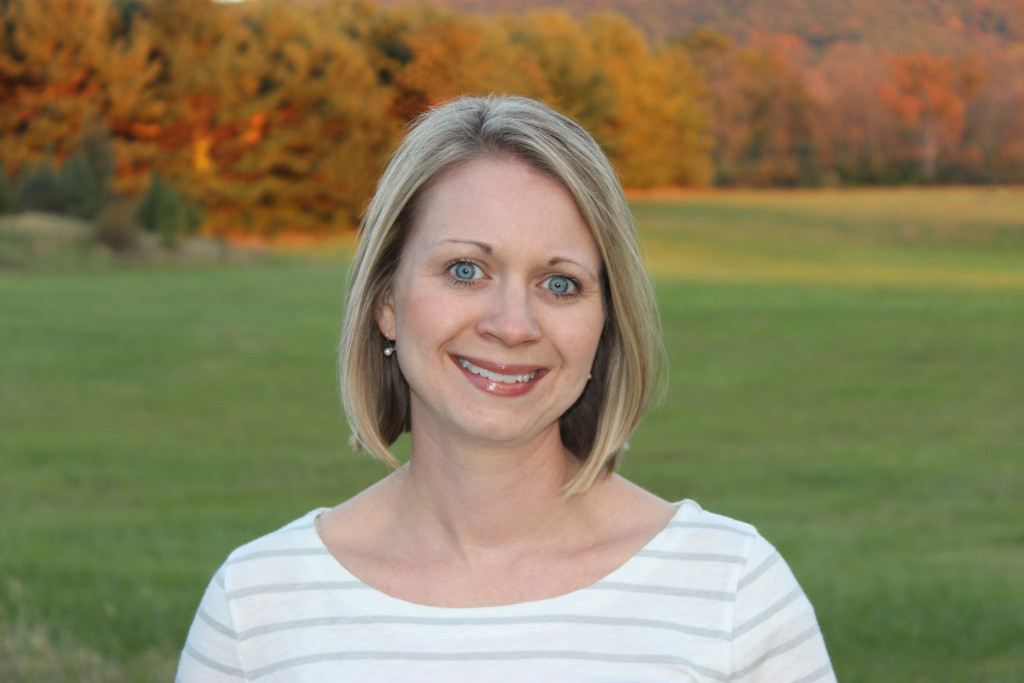 Erica is an excellent friend to young adults, and she is an excellent guide and counselor. The book is very practical and although I’ve suggested it has a fairly broad vision of full-gospel discipleship over all of life and wants to inspire young adults to make a Kingdom difference in their new jobs and churches, it isn’t breathy or visionary or at all pushy. After College is down to Earth with lovely writing, as if from a wise older sister offering common sense advice, inviting readers to consider just the right thing — pushing them a bit here, encouraging them just a bit there, doing a brilliant job at walking the tight-rope of being both serious and playful, didactic and storytelling, prophetic and pastoral.
Erica is an excellent friend to young adults, and she is an excellent guide and counselor. The book is very practical and although I’ve suggested it has a fairly broad vision of full-gospel discipleship over all of life and wants to inspire young adults to make a Kingdom difference in their new jobs and churches, it isn’t breathy or visionary or at all pushy. After College is down to Earth with lovely writing, as if from a wise older sister offering common sense advice, inviting readers to consider just the right thing — pushing them a bit here, encouraging them just a bit there, doing a brilliant job at walking the tight-rope of being both serious and playful, didactic and storytelling, prophetic and pastoral.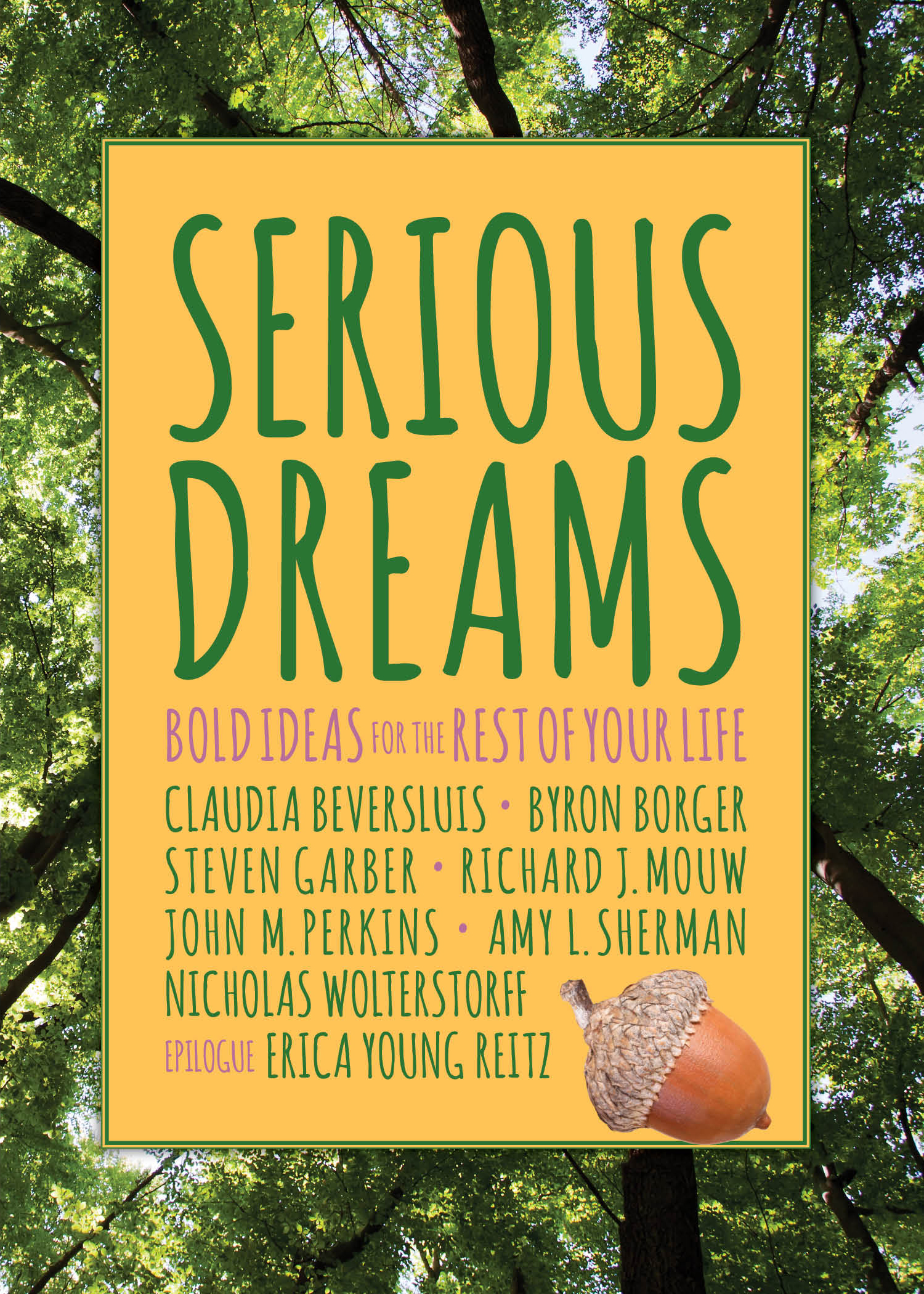 Serious Dreams: Big Ideas for the Rest of Your Life edited by Byron Borger (Square Halo Books) $13.99 Okay, just a few details, first. This is a pretty snazzy, compact-sized paperback with a vibrant cover and a nice-to-the-touch matte finish that includes a few little artsy touches inside–a silhouetted oak leaf, an iconic acorn decorating the reflection questions after each chapter, visually picking up the theme of the big trees on the cover. We are proud of how the design expertise of Ned Bustard at Square Halo enhanced the look and feel of this book, making it a nice gift without being overdone or merely a gifty keepsake.
Serious Dreams: Big Ideas for the Rest of Your Life edited by Byron Borger (Square Halo Books) $13.99 Okay, just a few details, first. This is a pretty snazzy, compact-sized paperback with a vibrant cover and a nice-to-the-touch matte finish that includes a few little artsy touches inside–a silhouetted oak leaf, an iconic acorn decorating the reflection questions after each chapter, visually picking up the theme of the big trees on the cover. We are proud of how the design expertise of Ned Bustard at Square Halo enhanced the look and feel of this book, making it a nice gift without being overdone or merely a gifty keepsake. 

 The Call: Finding and Fulfilling the Central Purpose of Your Life Os Guinness (Word Publishing) $17.99 This is eloquent and elegant and wise and mature, short chapters that can be read by those who want a deep and thoughtful reminder of their own sense of purpose as it aligns with God’s decisive call upon their lives. Nearly any book these days about vocation or any book about a Christian view of work draws on this at one point or another; it is a classic. It is one of my all time favorite books, and I highly recommend it for those who like fine writing, allusions and quotes from history and literature and some intense thinking about the significant of ultimate meaning.
The Call: Finding and Fulfilling the Central Purpose of Your Life Os Guinness (Word Publishing) $17.99 This is eloquent and elegant and wise and mature, short chapters that can be read by those who want a deep and thoughtful reminder of their own sense of purpose as it aligns with God’s decisive call upon their lives. Nearly any book these days about vocation or any book about a Christian view of work draws on this at one point or another; it is a classic. It is one of my all time favorite books, and I highly recommend it for those who like fine writing, allusions and quotes from history and literature and some intense thinking about the significant of ultimate meaning. Twenty-Two: Letters to a Young Woman Searching for Meaning (Thomas Nelson Publishing) $22.99 Did you see my BookNotes comments about this a week ago? This is a very handsome hardback designed as a set of letters to a young woman who is graduating from college. As I described it, this book is a
Twenty-Two: Letters to a Young Woman Searching for Meaning (Thomas Nelson Publishing) $22.99 Did you see my BookNotes comments about this a week ago? This is a very handsome hardback designed as a set of letters to a young woman who is graduating from college. As I described it, this book is a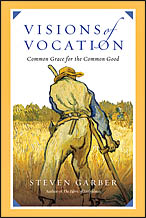 Visions of Vocation: Common Grace for the Common Good Steve Garber (IVP) $17.99 I won’t say again the many reasons we love this book but you may know that I’ve mentioned it here often. Steve is a fine, fine writer, a deep thinker, and a personable, intense friend to many. He loves little more – other than being with his family, hiking or bike riding, or reading or watching movies, that is – he loves little more than inviting people to earnest chat with “conversations with consequence.” He networks beautifully, bringing folks together to tell stories of grace and goodness, and of struggle and pain, of hope and the effort to make a difference. This book has emerged from his “come and see” pedagogy, his many stories of people doing life together, telling their stories of hanging in as God’s great grace allows. Can we care about the common good, remaining faithful over the long haul of our lives, not giving in to cynicism or “whatever”? This book allows careful readers to learn to love the things God loves, loving the world despite its deep sorrow. What an amazing, rich, thoughtful book, a perfect gift to honor a major life transition for anyone who is serious about the things that matter most. Here is one of the times I discussed it at BookNotes when it first came out.
Visions of Vocation: Common Grace for the Common Good Steve Garber (IVP) $17.99 I won’t say again the many reasons we love this book but you may know that I’ve mentioned it here often. Steve is a fine, fine writer, a deep thinker, and a personable, intense friend to many. He loves little more – other than being with his family, hiking or bike riding, or reading or watching movies, that is – he loves little more than inviting people to earnest chat with “conversations with consequence.” He networks beautifully, bringing folks together to tell stories of grace and goodness, and of struggle and pain, of hope and the effort to make a difference. This book has emerged from his “come and see” pedagogy, his many stories of people doing life together, telling their stories of hanging in as God’s great grace allows. Can we care about the common good, remaining faithful over the long haul of our lives, not giving in to cynicism or “whatever”? This book allows careful readers to learn to love the things God loves, loving the world despite its deep sorrow. What an amazing, rich, thoughtful book, a perfect gift to honor a major life transition for anyone who is serious about the things that matter most. Here is one of the times I discussed it at BookNotes when it first came out.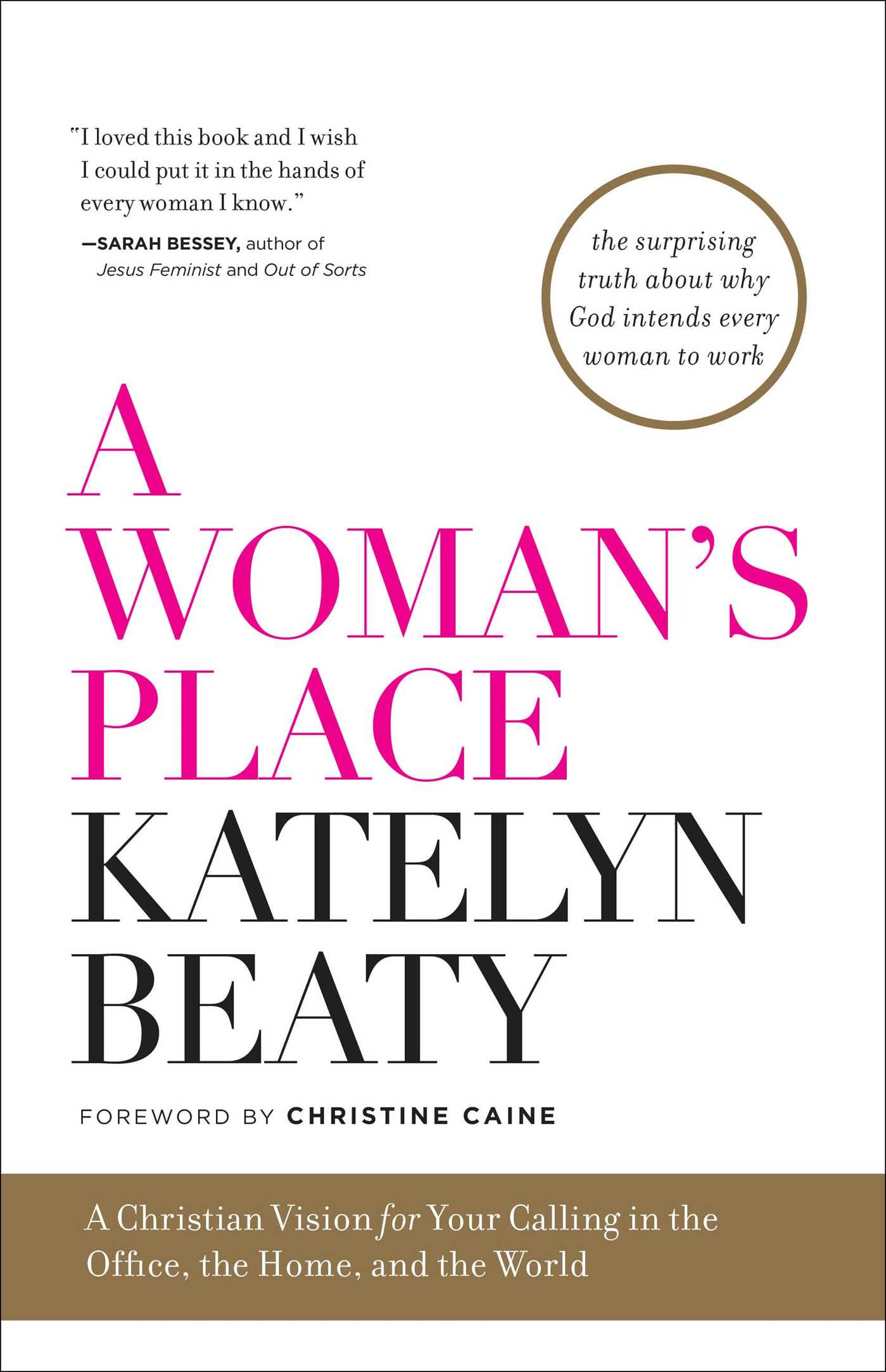 A Woman’s Place: A Christian Vision for Your Calling in the Office, the Home, and the World Katelyn Beaty (Howard Books) $22.99 I am sure you understand that we don’t think that any sort of graduate – let alone college graduates – should be given a little token gift that trivializes the momentous occasion of their matriculation or that trivializes the way the Christian faith can provide insight and comfort and vision for the seasons to come. This is a key time to offer something sturdy and vital so we gravitate to books about calling and career, about vocation and transformation, about lasting faith and discipleship There are many other books than the few I’ve listed above but, for what it is worth, there are none this good that are particularly about women’s callings into the workplace, making this book a rare treat and a real gift. It would make a great gift for a college woman.
A Woman’s Place: A Christian Vision for Your Calling in the Office, the Home, and the World Katelyn Beaty (Howard Books) $22.99 I am sure you understand that we don’t think that any sort of graduate – let alone college graduates – should be given a little token gift that trivializes the momentous occasion of their matriculation or that trivializes the way the Christian faith can provide insight and comfort and vision for the seasons to come. This is a key time to offer something sturdy and vital so we gravitate to books about calling and career, about vocation and transformation, about lasting faith and discipleship There are many other books than the few I’ve listed above but, for what it is worth, there are none this good that are particularly about women’s callings into the workplace, making this book a rare treat and a real gift. It would make a great gift for a college woman.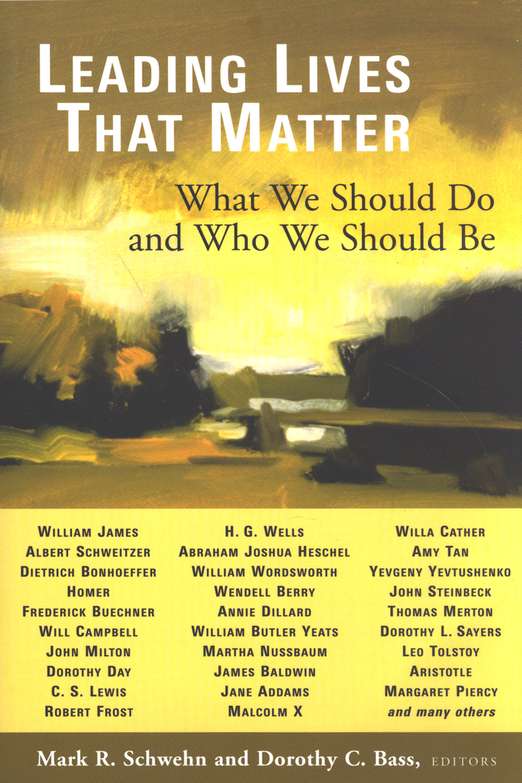 Leading Lives That Matter: What We Should Do and Who We Should Be edited by Dorothy Bass and Mark Schwen (Eerdmans) $31.00 What a hefty volume this is, almost 550 beautiful pages, chock-full of essays and articles and poems, a truly amazing collection. This a thick paperback book
Leading Lives That Matter: What We Should Do and Who We Should Be edited by Dorothy Bass and Mark Schwen (Eerdmans) $31.00 What a hefty volume this is, almost 550 beautiful pages, chock-full of essays and articles and poems, a truly amazing collection. This a thick paperback book
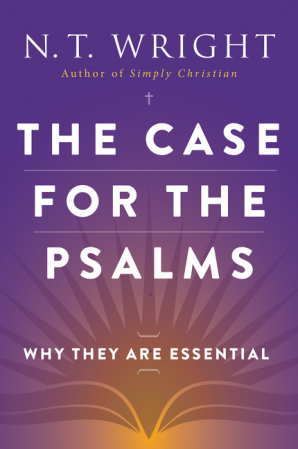 church about the Psalms and have read out loud large chunks of N. T. Wright’s wonderful paperback The Case for the Psalms: Why They Are Essential. His important overview of the Psalter is helpful to understand the Psalms — email me if you want a list of some other good resources — but a main point is that praying these poems over and over roots us in the story of God, a past of God’s great deeds, a present of great sorrow and turbulence, and a trust in the promises that have been somewhat fulfilled in the death and resurrection of David’s heir, Christ Jesus. And yet, the story isn’t over, and we even now live in a “now but not yet” sort of world. We have to work at “seeing” life through the lens of faith, relating God’s redemptive story to all of life. The Psalms are not the only place the Bible talks about thinking or work or pondering the great wonders of God, but they are evocative and helpful.
church about the Psalms and have read out loud large chunks of N. T. Wright’s wonderful paperback The Case for the Psalms: Why They Are Essential. His important overview of the Psalter is helpful to understand the Psalms — email me if you want a list of some other good resources — but a main point is that praying these poems over and over roots us in the story of God, a past of God’s great deeds, a present of great sorrow and turbulence, and a trust in the promises that have been somewhat fulfilled in the death and resurrection of David’s heir, Christ Jesus. And yet, the story isn’t over, and we even now live in a “now but not yet” sort of world. We have to work at “seeing” life through the lens of faith, relating God’s redemptive story to all of life. The Psalms are not the only place the Bible talks about thinking or work or pondering the great wonders of God, but they are evocative and helpful.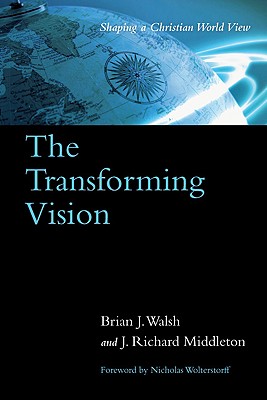 BUY The Transforming Vision: Shaping a Christian World View Brian Walsh & J. Richard Middleton (IVP Academic) $22.00 I have often said that this sweeping study of the history of the dualism between what we sometimes call “the sacred and the secular” and the secularizing rise of Enlightenment rationalism driven by the idols of scientism and faith in economic progress, literally changed my life. Anytime folks ask me for the most important books in our store, this one invariably comes up. This Biblically-informed call to a wholistic Christian worldview — good creation, radical fall, wholistic redemption, future restoration — came to influence N.T. Wright, and it mirrors the Biblical teaching of Al Wolter’s Creation Regained: The Biblical Basis for a Reformational Worldview, with whom they studied, but adds a lot of scholarship about the need for a a Christian social imagination, the Christian mind, an engagement with the ideas and structures of the culture, and even a rousing call at the end to consider reading interdisciplinary, even taking up Christian philosophy. I think Transforming Vision is an excellent example of thoughtful Christian scholarship for the sake of the common good and you will be know more about your world, your faith, and be more eager to read widely once you’ve processed it.
BUY The Transforming Vision: Shaping a Christian World View Brian Walsh & J. Richard Middleton (IVP Academic) $22.00 I have often said that this sweeping study of the history of the dualism between what we sometimes call “the sacred and the secular” and the secularizing rise of Enlightenment rationalism driven by the idols of scientism and faith in economic progress, literally changed my life. Anytime folks ask me for the most important books in our store, this one invariably comes up. This Biblically-informed call to a wholistic Christian worldview — good creation, radical fall, wholistic redemption, future restoration — came to influence N.T. Wright, and it mirrors the Biblical teaching of Al Wolter’s Creation Regained: The Biblical Basis for a Reformational Worldview, with whom they studied, but adds a lot of scholarship about the need for a a Christian social imagination, the Christian mind, an engagement with the ideas and structures of the culture, and even a rousing call at the end to consider reading interdisciplinary, even taking up Christian philosophy. I think Transforming Vision is an excellent example of thoughtful Christian scholarship for the sake of the common good and you will be know more about your world, your faith, and be more eager to read widely once you’ve processed it.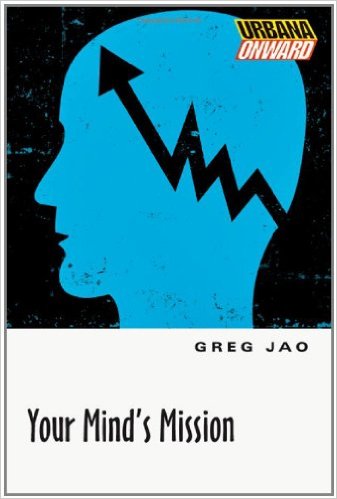 AND GET THIS FREE: Your Mind’s Mission Greg Jao (IVP) $7.00 I mention this to college students quite often, but, you know, I wish non-students would read it, too, as it offers a wholistic vision of a transformed worldview, a thoughtful process of learning to think well, and a call to see our ideas shaped in ways that they become missional.
AND GET THIS FREE: Your Mind’s Mission Greg Jao (IVP) $7.00 I mention this to college students quite often, but, you know, I wish non-students would read it, too, as it offers a wholistic vision of a transformed worldview, a thoughtful process of learning to think well, and a call to see our ideas shaped in ways that they become missional.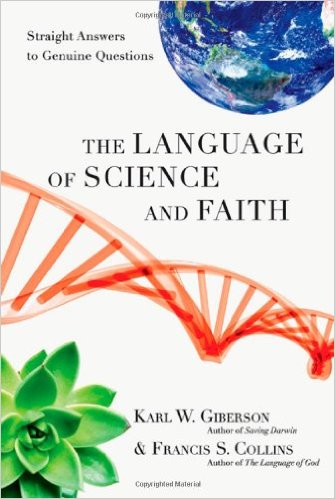 BUY The Language of Science and Faith: Straight Answers to Genuine Questions Karl W. Giberson & Francis S. Collins (IVP Books/BioLogos) $22.00 We have written from time to time about this book, always listing it on bibliographies we do about the sciences. We are fond of it and want to encourage you to get it, perhaps to share with someone who has somehow heard that religious people are disinterested in science, or that evangelicals are anti-science.
BUY The Language of Science and Faith: Straight Answers to Genuine Questions Karl W. Giberson & Francis S. Collins (IVP Books/BioLogos) $22.00 We have written from time to time about this book, always listing it on bibliographies we do about the sciences. We are fond of it and want to encourage you to get it, perhaps to share with someone who has somehow heard that religious people are disinterested in science, or that evangelicals are anti-science.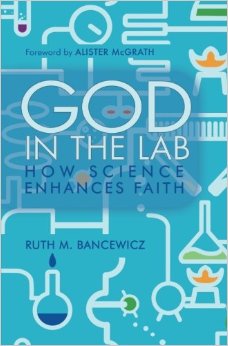 AND GET THIS FREE God in the Lab: How Science Enhances Faith Ruth M. Bancewicz (Monarch) $16.99 First published in the UK, we are so glad to stock this book, happy about it for several reasons. And we’re happy to send you a free one with a purchase of one of the above mentioned science books.
AND GET THIS FREE God in the Lab: How Science Enhances Faith Ruth M. Bancewicz (Monarch) $16.99 First published in the UK, we are so glad to stock this book, happy about it for several reasons. And we’re happy to send you a free one with a purchase of one of the above mentioned science books.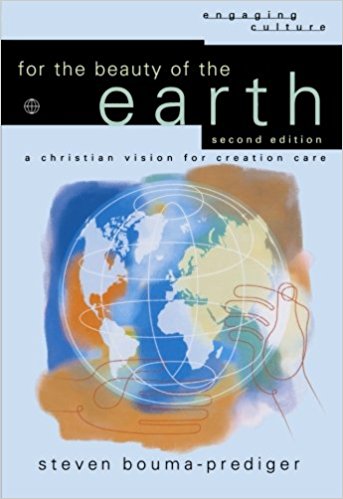 BUY For the Beauty of the Earth: A Christian Vision for Creation Care Steven Bouma-Prediger (Baker Academic) $26.00 It is hard to pick just one favorite book in this field. We often recommend for starters, Tending to Eden: Environmental Stewardship for God’s People by old friend Scott Sabin, and we have enjoyed telling readers that are new to the topic about Serving God, Saving the Planet: A Call to Care for Creation and Your Soul by Matthew Sleeth. We highly respect the seriously thoughtful work of Introducing Evangelical Ecotheology: Foundations in Scripture, Theology, History, and Praxis by Daniel Brunner, Jennifer Butler, and A.J. Swoboda. And anyone wanting to get behind all this with good, Biblically-informed thinking should make it a priority to work through Norman Wirzba’s potent little book edited by James K.A. Smith, From Nature to Creation: A Christian Vision for Understanding and Loving Our World. If you want a really, really practical, down-to-Earth Biblical overview, see one that Dr. Wirzba co-wrote with farmer Fred Bahnson called Making Peace with the Land: God’s Call to Reconcile with Creation. It is mostly about food and eating, and shows how a good creation-care theology can influence our day to day lifestyle.
BUY For the Beauty of the Earth: A Christian Vision for Creation Care Steven Bouma-Prediger (Baker Academic) $26.00 It is hard to pick just one favorite book in this field. We often recommend for starters, Tending to Eden: Environmental Stewardship for God’s People by old friend Scott Sabin, and we have enjoyed telling readers that are new to the topic about Serving God, Saving the Planet: A Call to Care for Creation and Your Soul by Matthew Sleeth. We highly respect the seriously thoughtful work of Introducing Evangelical Ecotheology: Foundations in Scripture, Theology, History, and Praxis by Daniel Brunner, Jennifer Butler, and A.J. Swoboda. And anyone wanting to get behind all this with good, Biblically-informed thinking should make it a priority to work through Norman Wirzba’s potent little book edited by James K.A. Smith, From Nature to Creation: A Christian Vision for Understanding and Loving Our World. If you want a really, really practical, down-to-Earth Biblical overview, see one that Dr. Wirzba co-wrote with farmer Fred Bahnson called Making Peace with the Land: God’s Call to Reconcile with Creation. It is mostly about food and eating, and shows how a good creation-care theology can influence our day to day lifestyle.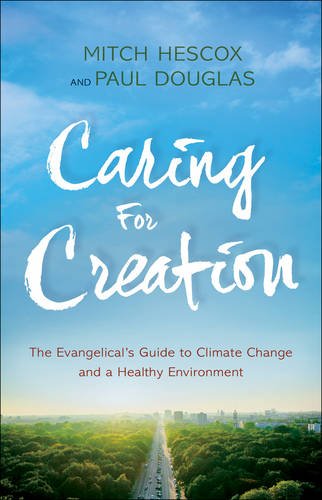 AND GET THIS FREE Caring for Creation: The Evangelicals Guide to Climate Change and a Healthy Environment Mitch Hescox & Paul Douglas (Bethany House) $14.99 Yep, these authors are the dynamic duo that we hosted in the store when this book first came out last fall, and we’re still smiling about how fun it was. Paul Douglas is a world-class meteorologist who happened to have invented some meteorology Doppler-type computer gadget that Stephen Spielberg used in Jurassic Park and Twister (and in which Paul made a cameo.) We have never had a Hollywood blockbuster actor in the store, but more importantly, his scientific discussion about global climate change and the energy crisis was fascinating, helpful, inspiring, even. To have a humble Christian man at the top of his professional field visiting with us and his friend and co-author Mitch Hescox — a United Methodist pastor, former global energy corporation executive, and now full time Director of the Evangelical Environmental Network — was one of the highlights of our year. You can read about it here.
AND GET THIS FREE Caring for Creation: The Evangelicals Guide to Climate Change and a Healthy Environment Mitch Hescox & Paul Douglas (Bethany House) $14.99 Yep, these authors are the dynamic duo that we hosted in the store when this book first came out last fall, and we’re still smiling about how fun it was. Paul Douglas is a world-class meteorologist who happened to have invented some meteorology Doppler-type computer gadget that Stephen Spielberg used in Jurassic Park and Twister (and in which Paul made a cameo.) We have never had a Hollywood blockbuster actor in the store, but more importantly, his scientific discussion about global climate change and the energy crisis was fascinating, helpful, inspiring, even. To have a humble Christian man at the top of his professional field visiting with us and his friend and co-author Mitch Hescox — a United Methodist pastor, former global energy corporation executive, and now full time Director of the Evangelical Environmental Network — was one of the highlights of our year. You can read about it here.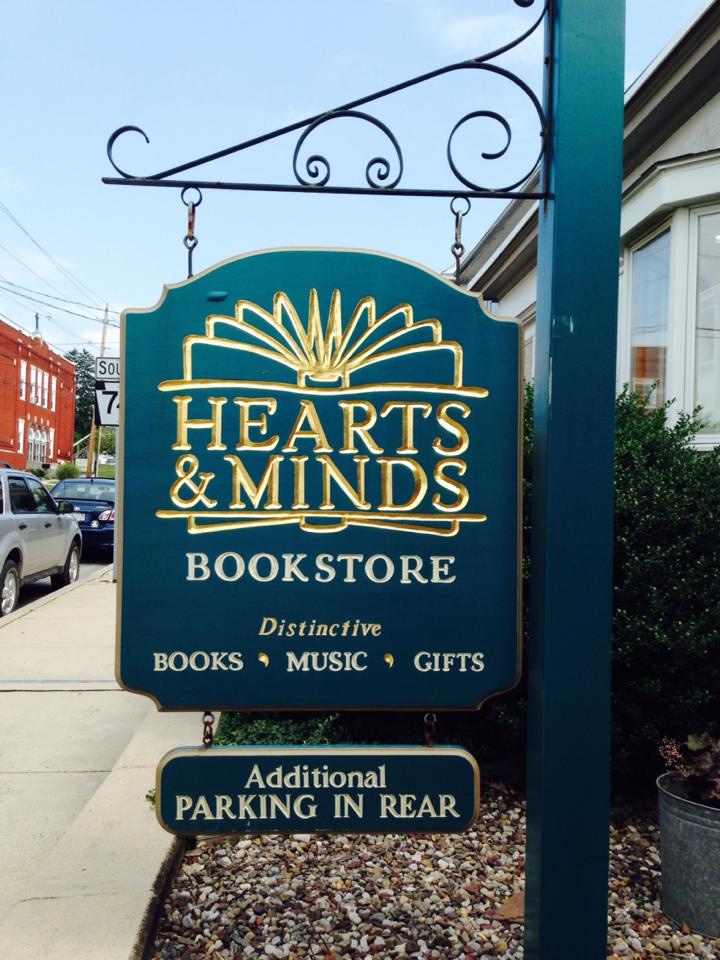
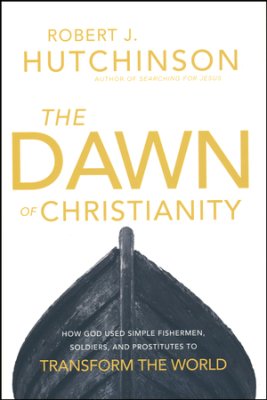 The Dawn of Christianity: How God Used Simple Fisherman, Soldiers, and Prostitutes to Transform the World Robert Hutchinson (Thomas Nelson) $24.99 Let’s start here – at the time of rise of Christianity, right after the resurrection of Christ. What a great time of year to dive into the fabulously interesting book which draws on the most recent discoveries and scholarship in archaeology of the first-century Near East. Hutchinson (who studied Hebrew in Israel and has an advanced degree in New Testament) asks “How did a beleaguered group of followers of a crucified rabbis become the founders of a world-changing faith?” Using both Christian and secular scholars, Hutchinson reconstructs these post-resurrection accounts, tells about the persecution of the earliest church (at the hands of, for instance, a religious terrorist named Saul of Tarsus) and shows how they thrived as the gospel moved from Antioch, Damascus to Athens and Rome. From ancient writers like Josephus and Philo and Eusebius to 20
The Dawn of Christianity: How God Used Simple Fisherman, Soldiers, and Prostitutes to Transform the World Robert Hutchinson (Thomas Nelson) $24.99 Let’s start here – at the time of rise of Christianity, right after the resurrection of Christ. What a great time of year to dive into the fabulously interesting book which draws on the most recent discoveries and scholarship in archaeology of the first-century Near East. Hutchinson (who studied Hebrew in Israel and has an advanced degree in New Testament) asks “How did a beleaguered group of followers of a crucified rabbis become the founders of a world-changing faith?” Using both Christian and secular scholars, Hutchinson reconstructs these post-resurrection accounts, tells about the persecution of the earliest church (at the hands of, for instance, a religious terrorist named Saul of Tarsus) and shows how they thrived as the gospel moved from Antioch, Damascus to Athens and Rome. From ancient writers like Josephus and Philo and Eusebius to 20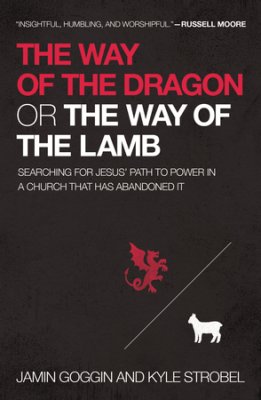 The Way of the Dragon or the Way of the Lamb? Searching for Jesus’s Path of Power in a Church That Has Abandoned It Jamin Goggin & Kyle Strobel (Nelson Books) $16.99 I have mentioned this before but want to suggest it again. There are oodles of basic Christian growth sorts of resources that help us in our interior lives, our understanding of the faith, books that strengthen our resolve to live well in the world. But few take seriously the fallen nature of our messed up world, the seductions and dysfunctions that surround us, and those that do often are very scholarly, or utterly pessimistic. (God bless Jacque Ellul, if you get my drift.) I benefited immensely from reading about this topic of how we should think about power and fallen institutions years ago – I recall the little book by Berkof called Christ and the Powers and a really important book by Marva Dawn which offered some friendly critique to Walter Wink and his impressive work on the principalities and powers. There is not enough discussion about this in most churches, not enough about what these authors call “The Way of the Dragon” let alone enough about the radical nature of Christ’s “Way of the Lamb.” Andy Crouch, of course, has written very wisely about power in Playing God and even in the his must-read book from a year ago, the brief Strong and Weak. There are many authors who write about Biblical nonviolence but, as much as I appreciate them, they somehow seem disconnected to the lives of ordinary middle class folks making their way through their typical lives.
The Way of the Dragon or the Way of the Lamb? Searching for Jesus’s Path of Power in a Church That Has Abandoned It Jamin Goggin & Kyle Strobel (Nelson Books) $16.99 I have mentioned this before but want to suggest it again. There are oodles of basic Christian growth sorts of resources that help us in our interior lives, our understanding of the faith, books that strengthen our resolve to live well in the world. But few take seriously the fallen nature of our messed up world, the seductions and dysfunctions that surround us, and those that do often are very scholarly, or utterly pessimistic. (God bless Jacque Ellul, if you get my drift.) I benefited immensely from reading about this topic of how we should think about power and fallen institutions years ago – I recall the little book by Berkof called Christ and the Powers and a really important book by Marva Dawn which offered some friendly critique to Walter Wink and his impressive work on the principalities and powers. There is not enough discussion about this in most churches, not enough about what these authors call “The Way of the Dragon” let alone enough about the radical nature of Christ’s “Way of the Lamb.” Andy Crouch, of course, has written very wisely about power in Playing God and even in the his must-read book from a year ago, the brief Strong and Weak. There are many authors who write about Biblical nonviolence but, as much as I appreciate them, they somehow seem disconnected to the lives of ordinary middle class folks making their way through their typical lives.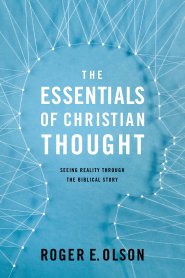 The Essentials of Christian Thought: Seeing the World Through the Biblical Story Roger E. Olson (Zondervan) $18.99 You probably know that we believe that one of the best things to read for living Christianly in the world, books that can help us grow in our faith, are what we sometimes call “worldview books.” Daily discipleship and basic Christian growth resources are best framed by the big picture of a Christian view of life and an overview of the redemptive story that unfolds in the great drama of the Bible. This book does just that and it is fantastic!
The Essentials of Christian Thought: Seeing the World Through the Biblical Story Roger E. Olson (Zondervan) $18.99 You probably know that we believe that one of the best things to read for living Christianly in the world, books that can help us grow in our faith, are what we sometimes call “worldview books.” Daily discipleship and basic Christian growth resources are best framed by the big picture of a Christian view of life and an overview of the redemptive story that unfolds in the great drama of the Bible. This book does just that and it is fantastic! 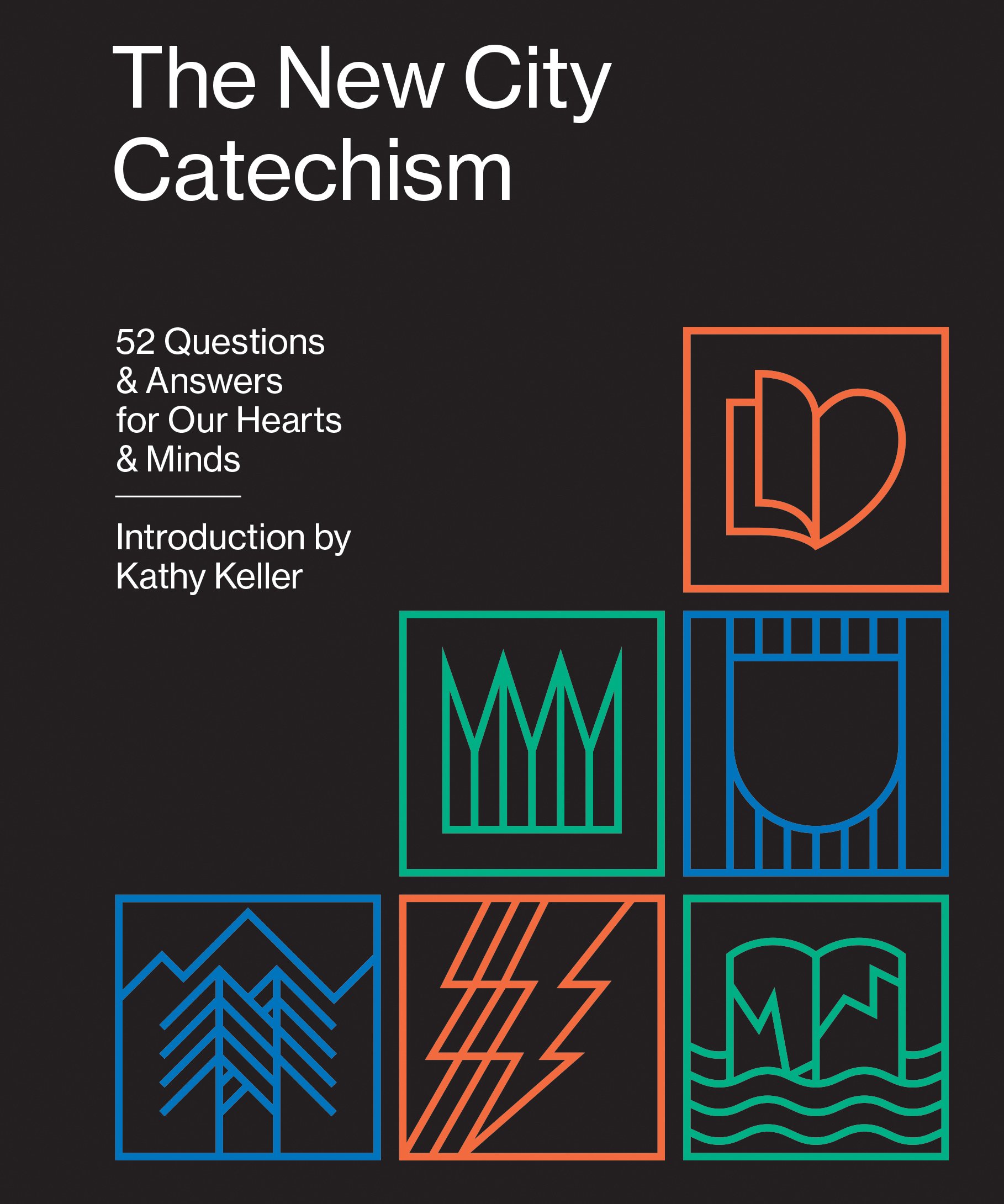 The New City Catechism: 52 Questions & Answers for our Hearts & Minds The Gospel Coalition with Introduction by Kathy Keller (Crossway) $7.99 This is a really cool little volume with classic evangelical truths portrayed in the once-popular Q & A format. Beth and I are members of the Presbyterian Church (USA) so we happily have a good handful of creedal statements in our Book of Confessions, including a newly added one about racism and human dignity that emerged from Reformed churches fighting apartheid. We crafted a fresh Q & A Catechism a few years ago but it didn’t quite take off; it indicated, though, the desire for contemporary Christians of a variety of types to return to this kind of easily memorized instruction. As Kathy Keller tells in her fascinating short introduction, even those working in hard, inner-city settings are finding success in teaching these pithy, theologically-sound answers. This is a very useful and timely idea and The New City Catechism is a very, very useful tool to use. Whether you are young or mature in your faith, whether you’ve studied a lot or not, this set of orthodox formulations – sounding a bit like the Heidelberg Catechism or some of the answers to the Shorter Westminster Catechism – is highly
The New City Catechism: 52 Questions & Answers for our Hearts & Minds The Gospel Coalition with Introduction by Kathy Keller (Crossway) $7.99 This is a really cool little volume with classic evangelical truths portrayed in the once-popular Q & A format. Beth and I are members of the Presbyterian Church (USA) so we happily have a good handful of creedal statements in our Book of Confessions, including a newly added one about racism and human dignity that emerged from Reformed churches fighting apartheid. We crafted a fresh Q & A Catechism a few years ago but it didn’t quite take off; it indicated, though, the desire for contemporary Christians of a variety of types to return to this kind of easily memorized instruction. As Kathy Keller tells in her fascinating short introduction, even those working in hard, inner-city settings are finding success in teaching these pithy, theologically-sound answers. This is a very useful and timely idea and The New City Catechism is a very, very useful tool to use. Whether you are young or mature in your faith, whether you’ve studied a lot or not, this set of orthodox formulations – sounding a bit like the Heidelberg Catechism or some of the answers to the Shorter Westminster Catechism – is highly 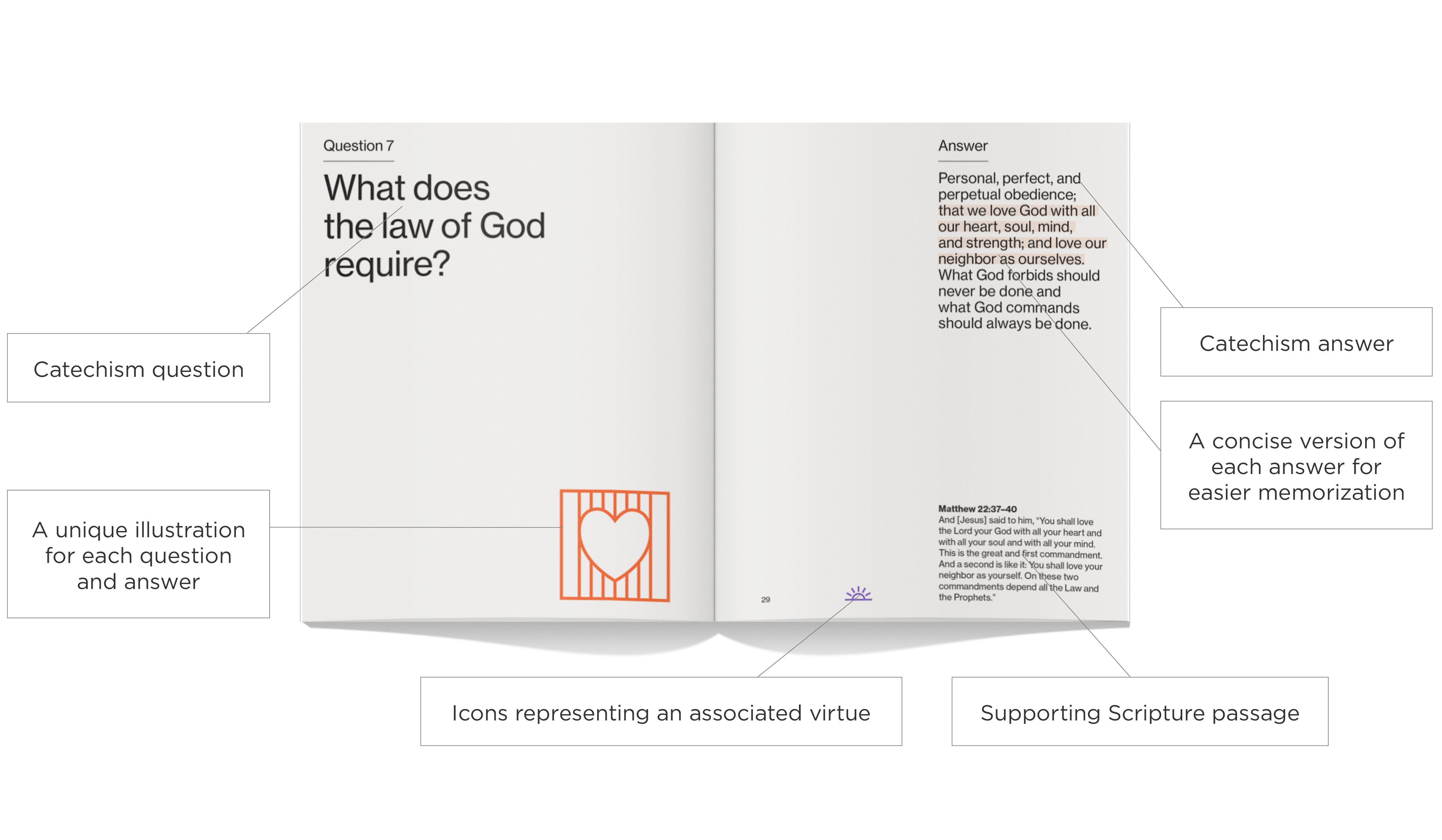 recommended.
recommended.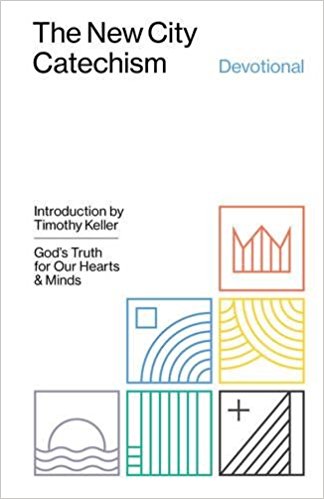 The New City Catechism Devotional: God’s Truth for our Hearts & Minds The Gospel Coalition, with Introduction by Timothy Keller (Crossway) $19.99 This hardback devotional has the same hip design and similar look – sans dust jacket, Helvetica type, two-color pages design – and is a perfect supplement to The New City Catechism. It has much to commend it. I might take issue with a thing or two, including the oddity that all the authors are men, but we’re eager to have our customers use it. Supplement it with stuff from your own tradition if you want, use it as conversation starters to determine if you agree with their formulations of the answers, but these are standard, mature, solid ruminations on these classic answers to key theological questions. If lack of theological awareness and superficiality of faith is a curse of our time, this could be an asset to rehabilitate weak knees and strengthen us all.
The New City Catechism Devotional: God’s Truth for our Hearts & Minds The Gospel Coalition, with Introduction by Timothy Keller (Crossway) $19.99 This hardback devotional has the same hip design and similar look – sans dust jacket, Helvetica type, two-color pages design – and is a perfect supplement to The New City Catechism. It has much to commend it. I might take issue with a thing or two, including the oddity that all the authors are men, but we’re eager to have our customers use it. Supplement it with stuff from your own tradition if you want, use it as conversation starters to determine if you agree with their formulations of the answers, but these are standard, mature, solid ruminations on these classic answers to key theological questions. If lack of theological awareness and superficiality of faith is a curse of our time, this could be an asset to rehabilitate weak knees and strengthen us all. The Sin of Certainty: Why God Desires Our Trust More Than Our “Correct” Beliefs Peter Enns (HarperOne) $15.99 This came out to much discussion a year ago and was just released in paperback last week so I can list it as “new” – at least new in paperback. I do not mean to be clever in listing this book after the important New City Catechism, although a cynic might think that I’m deconstructing the doctrinal Q & A approach in those books. Nope, I’m just balancing the two; Enns is quick to tell us that any reductionism that equates proper beliefs with real faith is not Biblically faithful. The strict Reformed theological tradition that he once was a part of left him with questions, fundamental things about what it means to trust God, what it means to truly know something, what the role of theological formulations play in faith formation. He’s a great storyteller and a passionate thinker who wants to call us to a more wholistic and deeper level sort of belief.
The Sin of Certainty: Why God Desires Our Trust More Than Our “Correct” Beliefs Peter Enns (HarperOne) $15.99 This came out to much discussion a year ago and was just released in paperback last week so I can list it as “new” – at least new in paperback. I do not mean to be clever in listing this book after the important New City Catechism, although a cynic might think that I’m deconstructing the doctrinal Q & A approach in those books. Nope, I’m just balancing the two; Enns is quick to tell us that any reductionism that equates proper beliefs with real faith is not Biblically faithful. The strict Reformed theological tradition that he once was a part of left him with questions, fundamental things about what it means to trust God, what it means to truly know something, what the role of theological formulations play in faith formation. He’s a great storyteller and a passionate thinker who wants to call us to a more wholistic and deeper level sort of belief.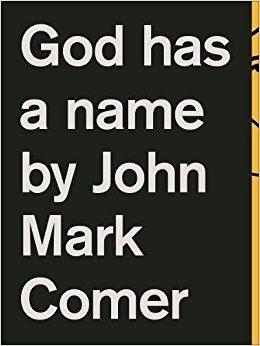 God Has a Name John Mark Comer (Zondervan) $16.99 I hope you recall how we’ve promoted Comer’s Garden City which is one of the coolest, most interesting, clarifying, and inspiring books we’ve seen in recent years. It has been a big seller at the Jubilee conference, for instance, and seems to resonate well with its intended audience (mostly younger, upbeat readers who want a big picture of the meaning of faith and service in the world.) This brand new one is paperback, but has some very hip design features, too (see that little orange slip on the inside edge of the cover?) Kudos to Zondervan for showing how books can look and feel just a little bit different these days with color and graphics and page weight…
God Has a Name John Mark Comer (Zondervan) $16.99 I hope you recall how we’ve promoted Comer’s Garden City which is one of the coolest, most interesting, clarifying, and inspiring books we’ve seen in recent years. It has been a big seller at the Jubilee conference, for instance, and seems to resonate well with its intended audience (mostly younger, upbeat readers who want a big picture of the meaning of faith and service in the world.) This brand new one is paperback, but has some very hip design features, too (see that little orange slip on the inside edge of the cover?) Kudos to Zondervan for showing how books can look and feel just a little bit different these days with color and graphics and page weight… This book carries oodles of endorsing blurbs by all sorts of great thinkers and writers, pastors and worship leaders.
This book carries oodles of endorsing blurbs by all sorts of great thinkers and writers, pastors and worship leaders. 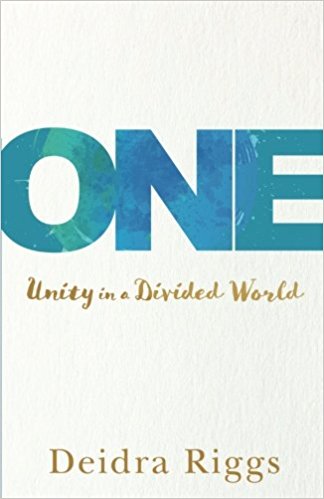 One: Unity in a Divided World Deidra Riggs (Baker Books) $14.99 I love this author – Deidra is a fine writer, a wise woman, an involved editor in a variety of important social media venues. She has worked at The High Calling blog, been a contributor to Dayspring’s (in)courage online community, and been a speaker for TEDx. She has been at the big Jubilee conference in Pittsburgh and has written a marvelous previous book called Every Little Thing: Making a Difference Right Where You Are which is a fabulous read that helps you, literally, do just what it promises. Although I suppose that one is mostly written for women, I really enjoyed it and found it wise and interesting and inspiring. Want to learn to live out your faith in little ways, day by day, taking up your mission in the world? She’s an ally and friend and understands your struggles.
One: Unity in a Divided World Deidra Riggs (Baker Books) $14.99 I love this author – Deidra is a fine writer, a wise woman, an involved editor in a variety of important social media venues. She has worked at The High Calling blog, been a contributor to Dayspring’s (in)courage online community, and been a speaker for TEDx. She has been at the big Jubilee conference in Pittsburgh and has written a marvelous previous book called Every Little Thing: Making a Difference Right Where You Are which is a fabulous read that helps you, literally, do just what it promises. Although I suppose that one is mostly written for women, I really enjoyed it and found it wise and interesting and inspiring. Want to learn to live out your faith in little ways, day by day, taking up your mission in the world? She’s an ally and friend and understands your struggles. One is more than a book on civility, although it moves in that direction, helping us learn to be more gracious in our disagreements in our public life. It is more than a book about theological unity within various denominations and faith traditions, although it has plenty of insight about our essential unity in Christ and how we should seek ways to make that clearer. It is more than a book on racial reconciliation although, as a black woman, she has much to say about this topic. That it carries endorsements on the back from the vital Jo Saxton and the important John Perkins speaks volumes.
One is more than a book on civility, although it moves in that direction, helping us learn to be more gracious in our disagreements in our public life. It is more than a book about theological unity within various denominations and faith traditions, although it has plenty of insight about our essential unity in Christ and how we should seek ways to make that clearer. It is more than a book on racial reconciliation although, as a black woman, she has much to say about this topic. That it carries endorsements on the back from the vital Jo Saxton and the important John Perkins speaks volumes. 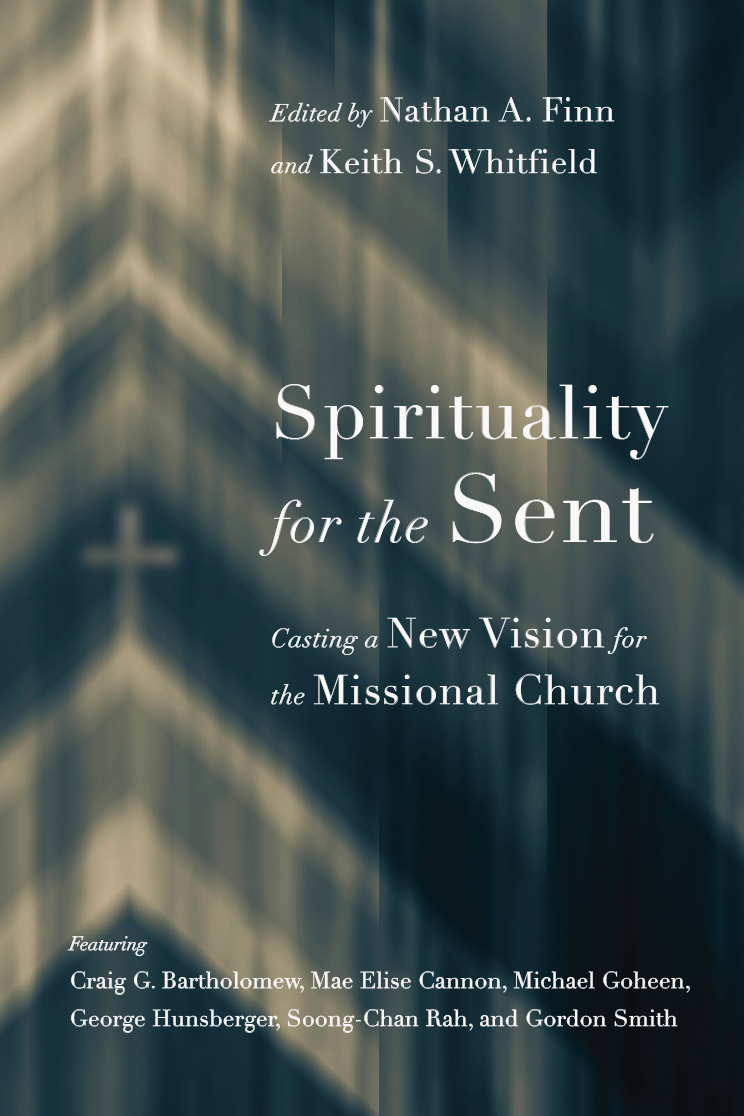 Spirituality for the Sent: Casting a New Vision for the Missional Church edited by Nathan A. Finn & Keith S. Whitfield (IVP Academic) $30.00 We wanted to include this amazing new book on this list even though it is a bit demanding and on a premier academic press. Still, it isn’t that hard, and I’m currently deep in reflection about it, reading it carefully, chapter by chapter. It is excellent.
Spirituality for the Sent: Casting a New Vision for the Missional Church edited by Nathan A. Finn & Keith S. Whitfield (IVP Academic) $30.00 We wanted to include this amazing new book on this list even though it is a bit demanding and on a premier academic press. Still, it isn’t that hard, and I’m currently deep in reflection about it, reading it carefully, chapter by chapter. It is excellent.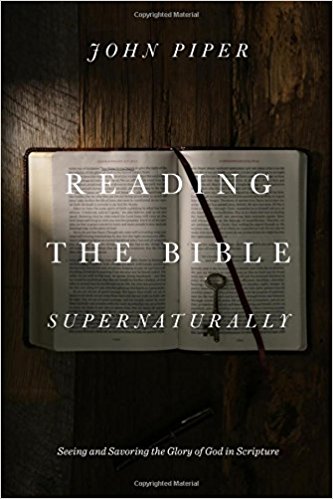 Reading the Bible Supernaturally: Seeing and Savoring the Glory of God in Scripture John Piper (Crossway) $32.99 Pastor Piper has retired from his position at Bethlehem Baptist but his writing career has perhaps reached a new zenith. He has over the years given us major works such as his hallmark Desiring God, Future Grace, and The Pleasures of God; he has written smaller volumes of deeply moving, passionate preaching in books like Seeking and Savoring Christ. He has done scholarly work on Jesus’s many demands (not enough have read his
Reading the Bible Supernaturally: Seeing and Savoring the Glory of God in Scripture John Piper (Crossway) $32.99 Pastor Piper has retired from his position at Bethlehem Baptist but his writing career has perhaps reached a new zenith. He has over the years given us major works such as his hallmark Desiring God, Future Grace, and The Pleasures of God; he has written smaller volumes of deeply moving, passionate preaching in books like Seeking and Savoring Christ. He has done scholarly work on Jesus’s many demands (not enough have read his 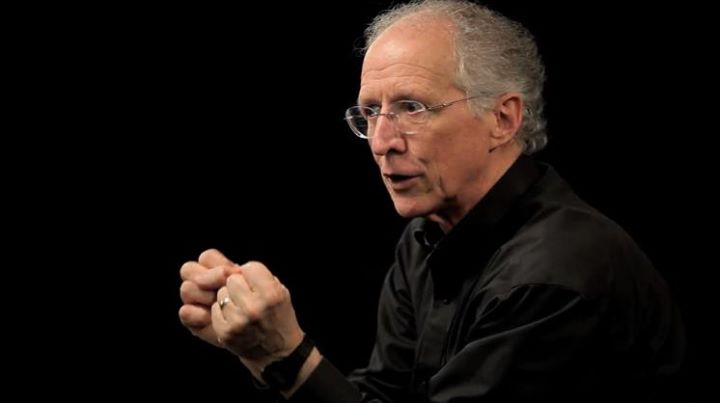
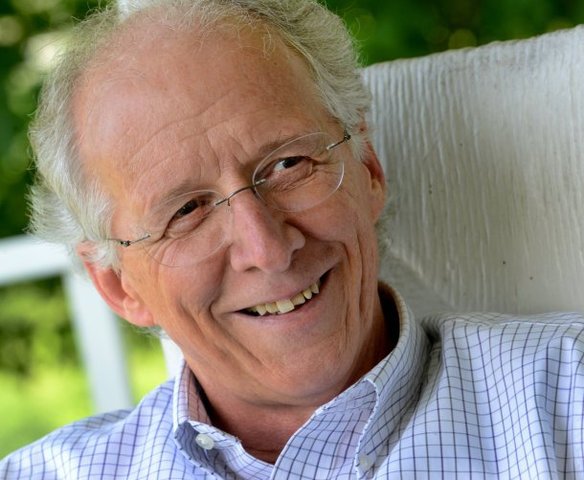 this kind of jolt, reminding us to pray for God’s blessing as we read, to grapple with the very holiness of the text, to dig and dig and, as one of my hero’s, Calvin Seerveld, put it, “take hold of God and pull.” (And to live with, as Piper himself says “paradoxes, pleasures, and the transformed life.” Reading this all will be a major project, but that’s okay — one doesn’t have to read it all at once — as Piper reminds us, “The Bible beckons us to look for a long time.” And, yes, good Baptist that he is, he has a few proof-texts.
this kind of jolt, reminding us to pray for God’s blessing as we read, to grapple with the very holiness of the text, to dig and dig and, as one of my hero’s, Calvin Seerveld, put it, “take hold of God and pull.” (And to live with, as Piper himself says “paradoxes, pleasures, and the transformed life.” Reading this all will be a major project, but that’s okay — one doesn’t have to read it all at once — as Piper reminds us, “The Bible beckons us to look for a long time.” And, yes, good Baptist that he is, he has a few proof-texts.  continue to recommend books from Rowan Williams’
continue to recommend books from Rowan Williams’  The Sign and the Sacrifice: The Meaning of the Cross and Resurrection (WJK; $15.00) to one by our UCC pastor friend Chris Rodkey, his lectionary-based Coloring Lent: An Adult Coloring Book for the Journey to Resurrection (Chalice Press; $12.99) an adult coloring book that includes some thoughtful and provocative meditations and great art.
The Sign and the Sacrifice: The Meaning of the Cross and Resurrection (WJK; $15.00) to one by our UCC pastor friend Chris Rodkey, his lectionary-based Coloring Lent: An Adult Coloring Book for the Journey to Resurrection (Chalice Press; $12.99) an adult coloring book that includes some thoughtful and provocative meditations and great art. Into Your Hand: Confronting Good Friday by Walter Brueggemann (Cascade; $11.00) which were a set of sermons Walt preached at St. Timothy’s Episcopal Church in Cincinnati one long Good Friday afternoon. We suggest classic books about the atonement, justification, Christ’s suffering, and, of course, the Resurrection. I know many of us are in the thick of this hard stuff.
Into Your Hand: Confronting Good Friday by Walter Brueggemann (Cascade; $11.00) which were a set of sermons Walt preached at St. Timothy’s Episcopal Church in Cincinnati one long Good Friday afternoon. We suggest classic books about the atonement, justification, Christ’s suffering, and, of course, the Resurrection. I know many of us are in the thick of this hard stuff. Mother Tongue: How Your Heritage Shapes Your Story Leonard Sweet (NavPress) $15.99 This remarkable book deserves a bigger review than I can give it here, but I can tell you this much: if you have liked any of Len Sweet’s many books or are all curious about his colorful approach to faith and discipleship and congregational renewal, this book is one you simply have to read. He has described it as his most personal and he seems to be feeling a bit vulnerable about it all.
Mother Tongue: How Your Heritage Shapes Your Story Leonard Sweet (NavPress) $15.99 This remarkable book deserves a bigger review than I can give it here, but I can tell you this much: if you have liked any of Len Sweet’s many books or are all curious about his colorful approach to faith and discipleship and congregational renewal, this book is one you simply have to read. He has described it as his most personal and he seems to be feeling a bit vulnerable about it all. new metaphors for doing church. Aqua Church remains a must-read in my view, and hope you’ll order it from us if you haven’t read it yet. He has a clear-headed but really interesting book on using digital culture for renewal, perfectly called called Viral. Who tells Protestants that we should stop with our individualistic, modernist slogans like “Here I Stand” and replace them with “There We Go”? Who writes books about clever, contemporary preaching and authors books like his recent Bad Habits of Jesus? What kind of edgy, outlier is he?
new metaphors for doing church. Aqua Church remains a must-read in my view, and hope you’ll order it from us if you haven’t read it yet. He has a clear-headed but really interesting book on using digital culture for renewal, perfectly called called Viral. Who tells Protestants that we should stop with our individualistic, modernist slogans like “Here I Stand” and replace them with “There We Go”? Who writes books about clever, contemporary preaching and authors books like his recent Bad Habits of Jesus? What kind of edgy, outlier is he? Holy Spokes: The Search for Urban Spirituality on Two Wheels Laura Everett (Eerdmans) $22.99 I don’t even bike and I was eager to see this; the book-lovin’ folks at Eerdmans in bike-friendly Grand Rapids had assured us this was going to be a huge book this spring, that it would be very interesting, a lot of fun, and very well written.
Holy Spokes: The Search for Urban Spirituality on Two Wheels Laura Everett (Eerdmans) $22.99 I don’t even bike and I was eager to see this; the book-lovin’ folks at Eerdmans in bike-friendly Grand Rapids had assured us this was going to be a huge book this spring, that it would be very interesting, a lot of fun, and very well written. My Utmost: A Devotional Memoir Macy Halford (Knopf) $26.95 This remarkable book has brought me much pleasure, has caused me to ponder–about my life, faith, Christian growth, and the curiosities of Oswald Chambers (author of My Utmost for His Highest, a staple here) who was a much more complicated and curious person than I ever, ever knew. Ms. Halford wonderfully tells the story of her own fascination with Chambers and his famous devotional. This would be good even if it were not so well written, but it just glows at times, making it a truly luminous, artful and sophisticated read. But more, there’s this: Halford’s memoir tells of her growing up in a fundamentalist Texas family, heading off to Barnard College, and landing a prestigious writing job in Manhattan at The New Yorker. Her taking inspiration from this old evangelical chestnut in the city that never sleeps, working with folks who (we can only imagine) never heard of any daily devotional, is quite a plot for a story, no?
My Utmost: A Devotional Memoir Macy Halford (Knopf) $26.95 This remarkable book has brought me much pleasure, has caused me to ponder–about my life, faith, Christian growth, and the curiosities of Oswald Chambers (author of My Utmost for His Highest, a staple here) who was a much more complicated and curious person than I ever, ever knew. Ms. Halford wonderfully tells the story of her own fascination with Chambers and his famous devotional. This would be good even if it were not so well written, but it just glows at times, making it a truly luminous, artful and sophisticated read. But more, there’s this: Halford’s memoir tells of her growing up in a fundamentalist Texas family, heading off to Barnard College, and landing a prestigious writing job in Manhattan at The New Yorker. Her taking inspiration from this old evangelical chestnut in the city that never sleeps, working with folks who (we can only imagine) never heard of any daily devotional, is quite a plot for a story, no?
 legacy lives on as one of the best-selling authors in all of history. That such a fascinating, artful, intellectually rigorous, missionary zealot is so popular among ordinary and often culturally conservative American evangelicals – some who would blanch if they knew of the artists he admired, the philosophy he read, the books he loved – is a wonderment.
legacy lives on as one of the best-selling authors in all of history. That such a fascinating, artful, intellectually rigorous, missionary zealot is so popular among ordinary and often culturally conservative American evangelicals – some who would blanch if they knew of the artists he admired, the philosophy he read, the books he loved – is a wonderment. Jackie Robinson: A Spiritual Biography –The Faith of a Boundary-Breaking Hero Michael Long & Chris Lamb (WJK) $ I don’t have to say much about this; we all know who Jackie Robinson is, and we may also know that there haven’t been quite enough voices really telling his remarkable story that well. This is the best book, I have reason to believe, that has yet been done about the great black player who also was an outspoken critic of racial segregation and early advocate for civil rights. He was a hero to many and he paid up, using his fame as a way to speak wisely about this hard, hard, stuff.
Jackie Robinson: A Spiritual Biography –The Faith of a Boundary-Breaking Hero Michael Long & Chris Lamb (WJK) $ I don’t have to say much about this; we all know who Jackie Robinson is, and we may also know that there haven’t been quite enough voices really telling his remarkable story that well. This is the best book, I have reason to believe, that has yet been done about the great black player who also was an outspoken critic of racial segregation and early advocate for civil rights. He was a hero to many and he paid up, using his fame as a way to speak wisely about this hard, hard, stuff.
 The Tech-Wise Family: Everyday Steps for Putting Technology in Its Proper Place Andy Crouch (Baker Books) $13.99 Well, what can I briefly say about this brand new book by one of the most important writers in contemporary Christianity? You know how much I insist we should all read — a couple of times! – his Culture Making, his reflection on power, Playing God, and his little, very wise book about human flourishing through embracing risk and strength, simply called Strong and Weak.
The Tech-Wise Family: Everyday Steps for Putting Technology in Its Proper Place Andy Crouch (Baker Books) $13.99 Well, what can I briefly say about this brand new book by one of the most important writers in contemporary Christianity? You know how much I insist we should all read — a couple of times! – his Culture Making, his reflection on power, Playing God, and his little, very wise book about human flourishing through embracing risk and strength, simply called Strong and Weak. Ourselves To Death or The Shallows, this is one of those great books that meanders through a lot of great truth. There are chapters like “Shaping Space” and “The Deep End of the (Car) Pool” and “The Good New About Boredom.” There is a chapter on embodiment (okay, it’s about sex) and a lovely chapter called “Why Singing Matters” and a powerful one called “In Sickness and Health.”
Ourselves To Death or The Shallows, this is one of those great books that meanders through a lot of great truth. There are chapters like “Shaping Space” and “The Deep End of the (Car) Pool” and “The Good New About Boredom.” There is a chapter on embodiment (okay, it’s about sex) and a lovely chapter called “Why Singing Matters” and a powerful one called “In Sickness and Health.” nother helpful bit of The Tech-Wise Family, besides its wise rumination on walking through ordinary days with a deeper sense of family living in a particular place with particular habits and postures, there is some brand new data presented with some fresh insights from the Barna Group. Sort of like their wonderful little Frames books, these considerable essays surround info-graphics and comment a bit on some of the latest data about technology, our habits, and our deepest longings as found by this useful research project.
nother helpful bit of The Tech-Wise Family, besides its wise rumination on walking through ordinary days with a deeper sense of family living in a particular place with particular habits and postures, there is some brand new data presented with some fresh insights from the Barna Group. Sort of like their wonderful little Frames books, these considerable essays surround info-graphics and comment a bit on some of the latest data about technology, our habits, and our deepest longings as found by this useful research project.
 Borgmann. Borgmann’s work (somewhat influenced, perhaps, by his friendship with Presbyterian Eugene Peterson) has become very important to many of us, from his engagement with post-modernity, his worries about the way technology has shaped the quintessential American character, and how, to navigate this well, we need to discover attentive focal practices, as he calls them. (See the wonderful book about all that by called Living Into Focus: Choosing What Matters in an Age of Distractions by Art Boers. See also Professor Borgmann’s most overtly Christian reflection on our technological age called Power Failure: Christianity in the Culture of Technology.)
Borgmann. Borgmann’s work (somewhat influenced, perhaps, by his friendship with Presbyterian Eugene Peterson) has become very important to many of us, from his engagement with post-modernity, his worries about the way technology has shaped the quintessential American character, and how, to navigate this well, we need to discover attentive focal practices, as he calls them. (See the wonderful book about all that by called Living Into Focus: Choosing What Matters in an Age of Distractions by Art Boers. See also Professor Borgmann’s most overtly Christian reflection on our technological age called Power Failure: Christianity in the Culture of Technology.)
 The Great Wall of China and the Salton Sea: Monuments, Missteps, and the Audacity of Ambition
The Great Wall of China and the Salton Sea: Monuments, Missteps, and the Audacity of Ambition The Very First Love Story: Adam, Even, and Us Bruce Feiler (Penguin Press) $28.00 I am sure I don’t have to tell you who Feiler is or what a fun writer he is. He edits the “This Life” column for The New York Times and became famous for doing embedded sorts of creative nonfiction, such as the one where he joins the circus or the one about his journeys to the far East called Learning to Bow. His Council of Dads was a heart-warming, tear-jerking powerhouse – he was diagnosed with a terminal cancer and gathered a group of dads to promise to help raise his daughter after he was gone. His most famous, certainly among church folk, was Walking the Bible where he searched for his own long-lost Jewish faith by, literally, trekking around the Holy Land. The similar interfaith hike to hang out with Arabs, Jews, and ancient Christians in the Middle East called Abraham was remarkable, too. We highly recommend them all as just wonderful books to have and enjoy and from which to learn much.
The Very First Love Story: Adam, Even, and Us Bruce Feiler (Penguin Press) $28.00 I am sure I don’t have to tell you who Feiler is or what a fun writer he is. He edits the “This Life” column for The New York Times and became famous for doing embedded sorts of creative nonfiction, such as the one where he joins the circus or the one about his journeys to the far East called Learning to Bow. His Council of Dads was a heart-warming, tear-jerking powerhouse – he was diagnosed with a terminal cancer and gathered a group of dads to promise to help raise his daughter after he was gone. His most famous, certainly among church folk, was Walking the Bible where he searched for his own long-lost Jewish faith by, literally, trekking around the Holy Land. The similar interfaith hike to hang out with Arabs, Jews, and ancient Christians in the Middle East called Abraham was remarkable, too. We highly recommend them all as just wonderful books to have and enjoy and from which to learn much.  Love Lives Here: Finding What You Need in a World Telling You What You Want Maria Goff (Thomas Nelson) $17.99 I hate to pitch a book by a woman primarily in light of what her husband has done, but Bob Goff and Sweet Maria are such a couple, partners-in-crime, a pair — dare I say, a pair of wild cards? Bob Goff is one of the most popular and well-loved speakers traveling around conferences and events, hosting folks at his own gigs (sometimes he and Maria bring crews of folks to their own getaway lodge along the coast in British Columbia, just because they want folks to meet other folks, genuine, relational, loving service, yes, but also a bit of strategic planning, what is dully called networking. The Goffs turn hospitality into a gracious gift, yes, but sometimes as Kingdom asset. So and so should know so and so as they really ought to partner in this project or that trip or this ministry. Without it seeming forced, these capers they tell us about (and other people tell about in their own books, famously Donald Miller in A Million Years in a Thousand Days) bring good stuff into the world, and always with a belly laugh. If you know Bob, you know he sincerely says “How cool is that?” probably every single day. His book, loaded with these stories, is simply called Love Does.
Love Lives Here: Finding What You Need in a World Telling You What You Want Maria Goff (Thomas Nelson) $17.99 I hate to pitch a book by a woman primarily in light of what her husband has done, but Bob Goff and Sweet Maria are such a couple, partners-in-crime, a pair — dare I say, a pair of wild cards? Bob Goff is one of the most popular and well-loved speakers traveling around conferences and events, hosting folks at his own gigs (sometimes he and Maria bring crews of folks to their own getaway lodge along the coast in British Columbia, just because they want folks to meet other folks, genuine, relational, loving service, yes, but also a bit of strategic planning, what is dully called networking. The Goffs turn hospitality into a gracious gift, yes, but sometimes as Kingdom asset. So and so should know so and so as they really ought to partner in this project or that trip or this ministry. Without it seeming forced, these capers they tell us about (and other people tell about in their own books, famously Donald Miller in A Million Years in a Thousand Days) bring good stuff into the world, and always with a belly laugh. If you know Bob, you know he sincerely says “How cool is that?” probably every single day. His book, loaded with these stories, is simply called Love Does.  does. But Bob doesn’t do this cool stuff alone, and he is always clear about that. He tells of his wife’s role in his life sometimes, but it is, after all, her story, and we are all so, so glad she has allowed us into her journey in this new book.
does. But Bob doesn’t do this cool stuff alone, and he is always clear about that. He tells of his wife’s role in his life sometimes, but it is, after all, her story, and we are all so, so glad she has allowed us into her journey in this new book. Hallelujah Anyway: Rediscovering Mercy Anne Lamott (Random House) $20.00 I wrote briefly about this the other day although I myself have shown great restraint in not reading this yet. It’s sitting here calling out to me, and after Easter I’ll so enjoy it, I’m sure. I hear she’s doing a speaking tour to promote the book and if you intend to hear her, you could get the book now, and not wait in line at the author gig. Anyway, if you’re an Annie fan, you’ll love this further collection of well written, casual, remarkably-told stories and essays. She is not Marilyn Robinson in her writing style, but she is full of important substance, honest self-revelation, interesting glimpses of memoir and creative writing. She’s blunt and funny and at times deeply moving. This is going to be one of the bigger books of the Spring, and we’re happy to alert you to it, now. As you can get from the subtitle, the theme of the book is mercy.
Hallelujah Anyway: Rediscovering Mercy Anne Lamott (Random House) $20.00 I wrote briefly about this the other day although I myself have shown great restraint in not reading this yet. It’s sitting here calling out to me, and after Easter I’ll so enjoy it, I’m sure. I hear she’s doing a speaking tour to promote the book and if you intend to hear her, you could get the book now, and not wait in line at the author gig. Anyway, if you’re an Annie fan, you’ll love this further collection of well written, casual, remarkably-told stories and essays. She is not Marilyn Robinson in her writing style, but she is full of important substance, honest self-revelation, interesting glimpses of memoir and creative writing. She’s blunt and funny and at times deeply moving. This is going to be one of the bigger books of the Spring, and we’re happy to alert you to it, now. As you can get from the subtitle, the theme of the book is mercy.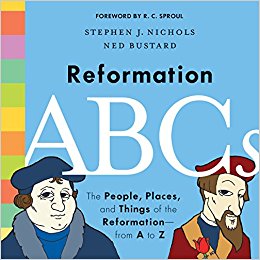 Reformation ABCs: The People, Places, and Things of the Reformation — from A to Z Stephen Nichols, illustrated by Ned Bustard (Crossway) $16.99 We cannot tell you how thrilled we are to tell you about this, although a fuller description will wait for some future list about the 500th anniversary of the start of the Protestant Reformation. Steve Nichols is one of our best popularizers of great insights from church history (seen especially in a good series of biographies he’s done, showing great insights from people in church history.) His book appropriating Bonhoeffer for daily Christian living is remarkably helpful. So I like Steve a lo. He serves currently as the President of Reformation Bible College and is the chief academic officer of Ligonier Ministries. Ned Bustard should be a name you recognize as he comes up from time to time here at BookNotes since he is the man guy managing Square Halo Books, known not only for doing my own book, Serious Dreams, but the widely acclaimed recent volume Deeper Magic: The Theology Behind the Writings of C.S. Lewis by Donald T. Williams (Square Halo; $16.99.) Ned’s last Square Halo Book release was co-edited with Greg Thornbury, Bigger on the Inside which pop culture aficionados will immediately recognize as a study of the long-running British TV show, Doctor Who. The subtitle is simply “Christianity and Doctor Who.” That’s Ned’s work on the cover of that one, too.
Reformation ABCs: The People, Places, and Things of the Reformation — from A to Z Stephen Nichols, illustrated by Ned Bustard (Crossway) $16.99 We cannot tell you how thrilled we are to tell you about this, although a fuller description will wait for some future list about the 500th anniversary of the start of the Protestant Reformation. Steve Nichols is one of our best popularizers of great insights from church history (seen especially in a good series of biographies he’s done, showing great insights from people in church history.) His book appropriating Bonhoeffer for daily Christian living is remarkably helpful. So I like Steve a lo. He serves currently as the President of Reformation Bible College and is the chief academic officer of Ligonier Ministries. Ned Bustard should be a name you recognize as he comes up from time to time here at BookNotes since he is the man guy managing Square Halo Books, known not only for doing my own book, Serious Dreams, but the widely acclaimed recent volume Deeper Magic: The Theology Behind the Writings of C.S. Lewis by Donald T. Williams (Square Halo; $16.99.) Ned’s last Square Halo Book release was co-edited with Greg Thornbury, Bigger on the Inside which pop culture aficionados will immediately recognize as a study of the long-running British TV show, Doctor Who. The subtitle is simply “Christianity and Doctor Who.” That’s Ned’s work on the cover of that one, too.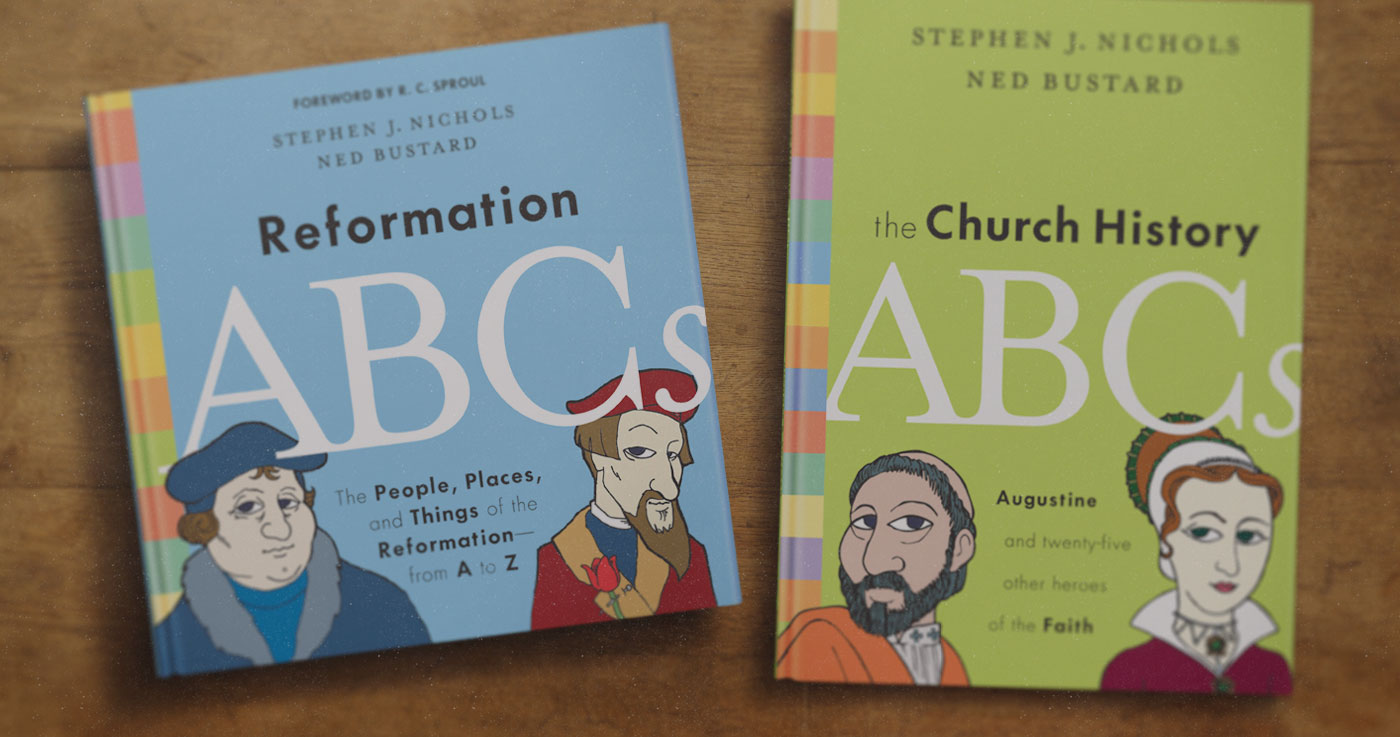
 But it is the artwork that makes this interesting book so incredibly wonderful. I anticipate it will get some award at the end of the year by Christian Publishing associations for being such a fabulously designed book. Bustard’s playful, colorful, and very well informed illustrations (sometimes cleverly overlaid with photographs) have so much going on in them that not only invites but demands repeated readings.
But it is the artwork that makes this interesting book so incredibly wonderful. I anticipate it will get some award at the end of the year by Christian Publishing associations for being such a fabulously designed book. Bustard’s playful, colorful, and very well informed illustrations (sometimes cleverly overlaid with photographs) have so much going on in them that not only invites but demands repeated readings. 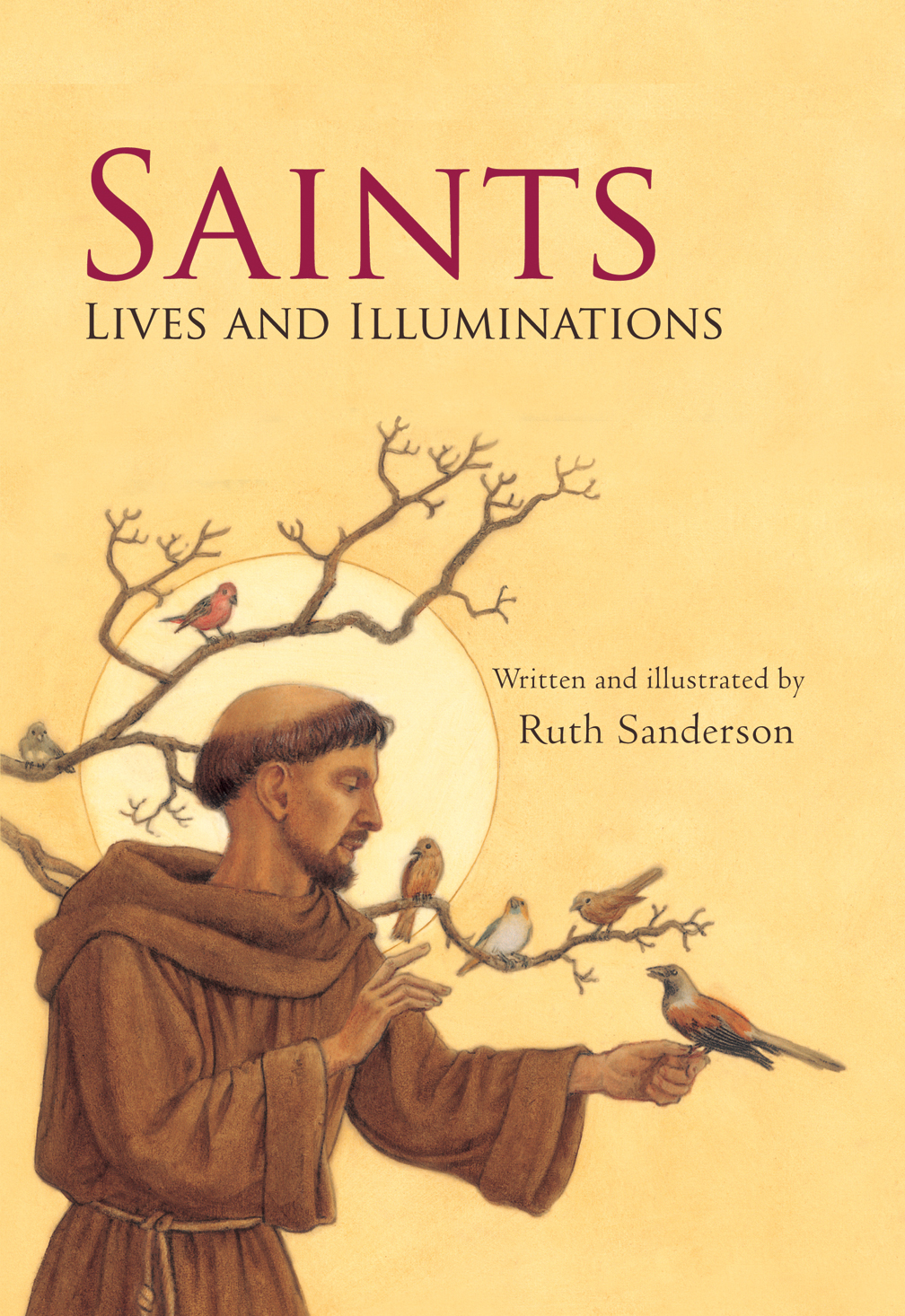 Saints: Lives and Illuminations Ruth Sanderson (Eerdmans Books for Young Readers) $16.00 This was once a large sized picture book and I really like how Eerdmans re-designed it as a 5 x 8 trim sized hardback. It’s really nice, and it could be appreciated by a sharp 7 or 8 year old, I think it is best for older elementary children, or any older age if they like nicely illustrated compendiums like this. This beautiful book tells the stories of over 70 men and women saints from various centuries. There’s a lovely watercolor picture (lavishly illuminated with a border giving it a look something like an icon or piece of medieval liturgical art) while the facing page tells the story of who that person was and what he or she was known to have done. It includes stories about first century leaders like Saint Stephen or Saint Christopher through the saints from early centuries such as Benedict and Scholastica and Paula and Jerome, St. Theresa of
Saints: Lives and Illuminations Ruth Sanderson (Eerdmans Books for Young Readers) $16.00 This was once a large sized picture book and I really like how Eerdmans re-designed it as a 5 x 8 trim sized hardback. It’s really nice, and it could be appreciated by a sharp 7 or 8 year old, I think it is best for older elementary children, or any older age if they like nicely illustrated compendiums like this. This beautiful book tells the stories of over 70 men and women saints from various centuries. There’s a lovely watercolor picture (lavishly illuminated with a border giving it a look something like an icon or piece of medieval liturgical art) while the facing page tells the story of who that person was and what he or she was known to have done. It includes stories about first century leaders like Saint Stephen or Saint Christopher through the saints from early centuries such as Benedict and Scholastica and Paula and Jerome, St. Theresa of 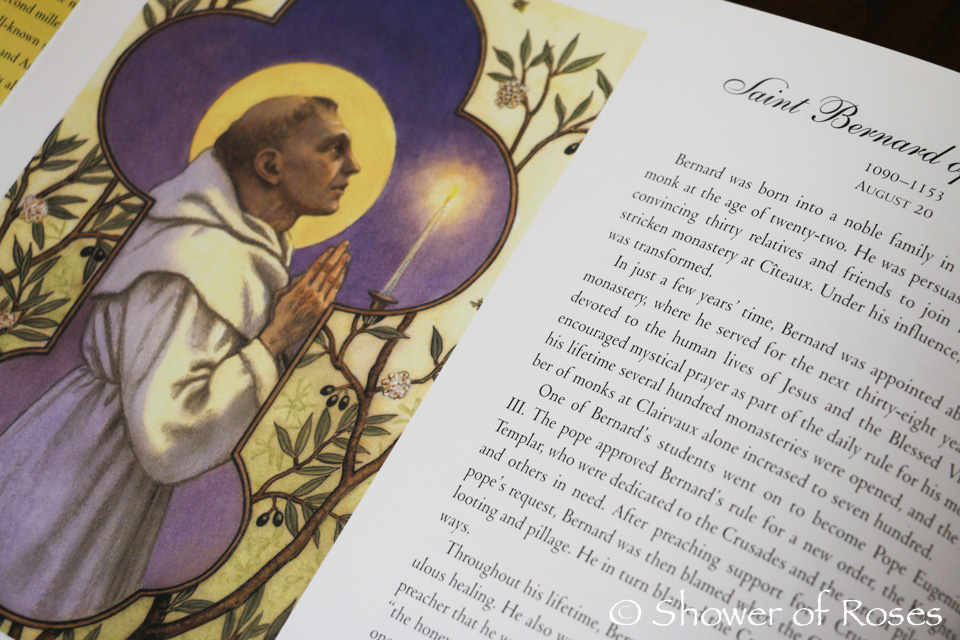 Lisieux, St. John of the Cross, up to famous ones like Brendan, Aquinas, Joan of Arc, Francis, Clare, (and some lesser known canonized ones like Rita and Maud.) The most recent ones included are the compassionate Maximilian Kolbe (who died under Hitler), the Pennsylvania saint Katherine Drexel, the mystical healer who cared for sinners and the suffering, Padre Pio and, of course, the Blessed Mother Theresa of Calcutta.)
Lisieux, St. John of the Cross, up to famous ones like Brendan, Aquinas, Joan of Arc, Francis, Clare, (and some lesser known canonized ones like Rita and Maud.) The most recent ones included are the compassionate Maximilian Kolbe (who died under Hitler), the Pennsylvania saint Katherine Drexel, the mystical healer who cared for sinners and the suffering, Padre Pio and, of course, the Blessed Mother Theresa of Calcutta.) 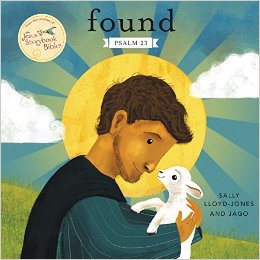 Found: Psalm 23 Sally Lloyd Jones, illustrated by Jago (Zonderkidz) $9.99 How glad we were to hear that the creative, stylized, modern art done by Jago would once again be teamed up with the wise and beautiful Bible storytelling of Sally Lloyd-Jones. Almost universally appreciated, and considered by many to be the best young children’s Bible, The Jesus Storybook Bible: Every Chapter Whispers His Name remains a staple of our children’s Bible department. The sequel, Thoughts to Make Your Heart Sing, while less intentionally showing the unfolding Biblical story with that Christ-centered, historical-redemptive approach of Jesus Storybook Bible it, too, is just brilliant. So both are great. This new one is a padded hardcover, almost like a bigger-than-usual board book, that nicely tells the famous 23rd Psalm. The lyrical text is drawn from the Jesus Story Book Bible but the engaging artwork and book design are completely new.
Found: Psalm 23 Sally Lloyd Jones, illustrated by Jago (Zonderkidz) $9.99 How glad we were to hear that the creative, stylized, modern art done by Jago would once again be teamed up with the wise and beautiful Bible storytelling of Sally Lloyd-Jones. Almost universally appreciated, and considered by many to be the best young children’s Bible, The Jesus Storybook Bible: Every Chapter Whispers His Name remains a staple of our children’s Bible department. The sequel, Thoughts to Make Your Heart Sing, while less intentionally showing the unfolding Biblical story with that Christ-centered, historical-redemptive approach of Jesus Storybook Bible it, too, is just brilliant. So both are great. This new one is a padded hardcover, almost like a bigger-than-usual board book, that nicely tells the famous 23rd Psalm. The lyrical text is drawn from the Jesus Story Book Bible but the engaging artwork and book design are completely new.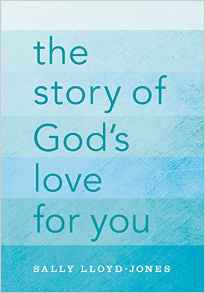 The Story of God’s Love for You Sally Lloyd-Jones (ZonderKidz) $14.99 Don’t you still like to give some special Easter gift to your older children or grandchildren? Do kids ever outgrow the joy of this little holiday tradition? I wanted to tell you again about this hand-sized hardback as it would fit perfectly in an Easter basket, gift-wrapped nicely or not. Here is what I wrote about this in our BookNotes newsletter blog when it first came out December of 2015:
The Story of God’s Love for You Sally Lloyd-Jones (ZonderKidz) $14.99 Don’t you still like to give some special Easter gift to your older children or grandchildren? Do kids ever outgrow the joy of this little holiday tradition? I wanted to tell you again about this hand-sized hardback as it would fit perfectly in an Easter basket, gift-wrapped nicely or not. Here is what I wrote about this in our BookNotes newsletter blog when it first came out December of 2015:
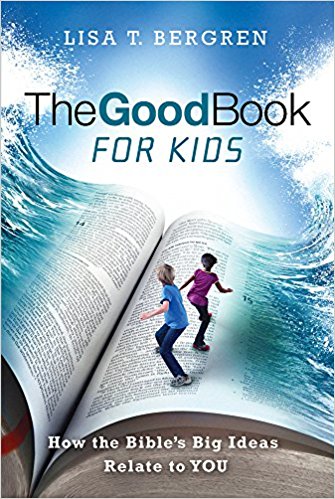 The Good Book for Kids: How the Bible’s Big Ideas Relate to You Lisa Bergren (Cook) $12.99 You will hear more, I hope, about this set of related products built around the abridged and adapted Bible called The Good Book that attempts to offer in a handful of chapters the key points of the unfolding Biblical drama. The adult version (which we also carry, of course) is hardback, has introductory comments, discussion questions, some key verses to study and more, although it’s main feature is that it really captures the key moments of the entire Bible, showing how they all build together into a coherent, easy-to-understand narrative with key, thematic, worldview-shaping, life-transforming concepts. This youth version (designed, they say, for ages 7 – 13) has five readings categorized in 8 units, so it can be used, daily, for 8 weeks, starting with Older Testament portions with units entitled “In the Beginning” and “God is Good When Life Gets Messy”, on to “God Is Big” and concluding “Tough Love, Troubled Times.” Four more weeks have daily Bible readings introducing the life of Jesus and the New Testament.
The Good Book for Kids: How the Bible’s Big Ideas Relate to You Lisa Bergren (Cook) $12.99 You will hear more, I hope, about this set of related products built around the abridged and adapted Bible called The Good Book that attempts to offer in a handful of chapters the key points of the unfolding Biblical drama. The adult version (which we also carry, of course) is hardback, has introductory comments, discussion questions, some key verses to study and more, although it’s main feature is that it really captures the key moments of the entire Bible, showing how they all build together into a coherent, easy-to-understand narrative with key, thematic, worldview-shaping, life-transforming concepts. This youth version (designed, they say, for ages 7 – 13) has five readings categorized in 8 units, so it can be used, daily, for 8 weeks, starting with Older Testament portions with units entitled “In the Beginning” and “God is Good When Life Gets Messy”, on to “God Is Big” and concluding “Tough Love, Troubled Times.” Four more weeks have daily Bible readings introducing the life of Jesus and the New Testament.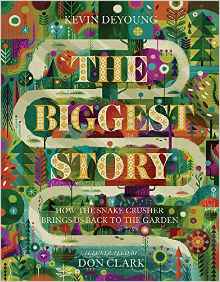 The Biggest Story: How the Snake Crusher Brings Us Back to the Garden Kevin DeYoung, illustrated by Don Clark (Crossway) $17.99 Oh my, this is the most creatively designed children’s religious book in recent history, and I so appreciate DeYoung’s overview of the Bible with this historical-redemptive vision — that Christ’s defeat of death at Easter is the outworking of the promises of Genesis 3. What a story, what a colorful book. Here is what I said in BookNotes when I reviewed it as a Christmas gift suggestion last year:
The Biggest Story: How the Snake Crusher Brings Us Back to the Garden Kevin DeYoung, illustrated by Don Clark (Crossway) $17.99 Oh my, this is the most creatively designed children’s religious book in recent history, and I so appreciate DeYoung’s overview of the Bible with this historical-redemptive vision — that Christ’s defeat of death at Easter is the outworking of the promises of Genesis 3. What a story, what a colorful book. Here is what I said in BookNotes when I reviewed it as a Christmas gift suggestion last year: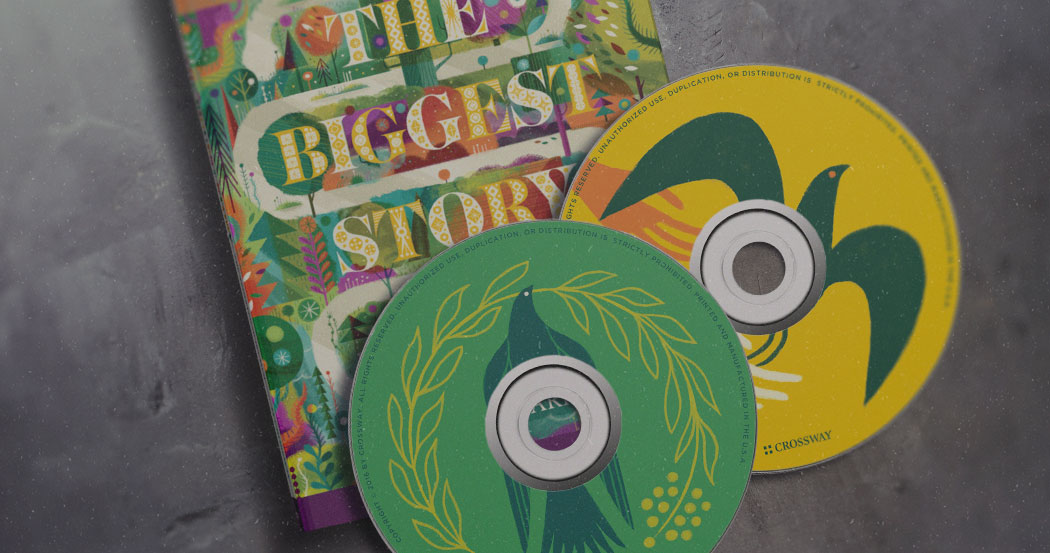
 The Garden, The Curtain, and the Cross: The True Story of Why Jesus Died and Rose Again Carl Laferton, illustrated by Catalina Echeverri (The Good Book Company) $14.99 Except maybe for the extraordinary hip art of the “snake-crusher” book by DeYoung and Don Clark, this is a fabulously cool, very colorful, very contemporary book that will delight young, hip parents as well as their design savvy kiddos. More importantly, it offers a solid, visionary, wholistic view of the unfolding drama of the Bible’s story of redemption — yep, in a few short pages it moves from the Garden of Eden to the rending of the curtain the temple on Good Friday, up to the glorious story of the resurrection. I’m struck by the gospel-centered focus of this whole series of very cool hardback children’s books from this company in the UK.
The Garden, The Curtain, and the Cross: The True Story of Why Jesus Died and Rose Again Carl Laferton, illustrated by Catalina Echeverri (The Good Book Company) $14.99 Except maybe for the extraordinary hip art of the “snake-crusher” book by DeYoung and Don Clark, this is a fabulously cool, very colorful, very contemporary book that will delight young, hip parents as well as their design savvy kiddos. More importantly, it offers a solid, visionary, wholistic view of the unfolding drama of the Bible’s story of redemption — yep, in a few short pages it moves from the Garden of Eden to the rending of the curtain the temple on Good Friday, up to the glorious story of the resurrection. I’m struck by the gospel-centered focus of this whole series of very cool hardback children’s books from this company in the UK. 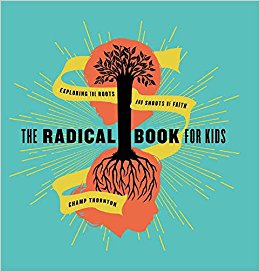 The Radical Book: Exploring the Roots and Shoots of Faith Champ Thornton (New Growth Press) $24.99 We are on a roll, here, presenting non-traditional looking religious books, designed with hip, urbane parents in mind, that offer a wild visual appeal with a creative but utterly faithful approach to gospel-centered faith and whole-life discipleship for kids. This book is simply remarkable, big, heavy, glorious, very entertaining and useful.
The Radical Book: Exploring the Roots and Shoots of Faith Champ Thornton (New Growth Press) $24.99 We are on a roll, here, presenting non-traditional looking religious books, designed with hip, urbane parents in mind, that offer a wild visual appeal with a creative but utterly faithful approach to gospel-centered faith and whole-life discipleship for kids. This book is simply remarkable, big, heavy, glorious, very entertaining and useful. 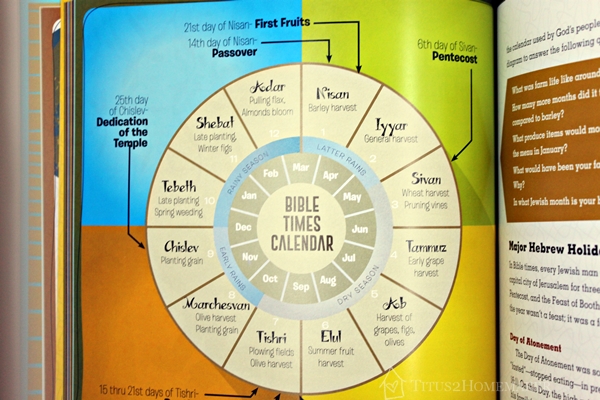 drawings and fun, random fonts, presenting fun, informative stuff. It’s a visual spectacle but not so much that it becomes a distraction.
drawings and fun, random fonts, presenting fun, informative stuff. It’s a visual spectacle but not so much that it becomes a distraction.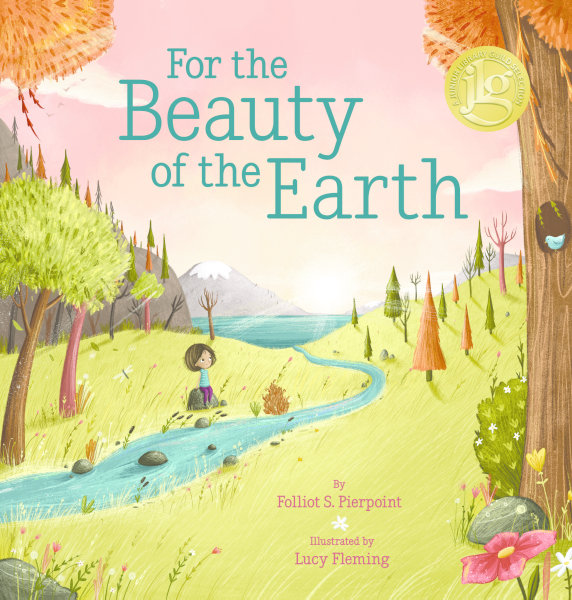 For the Beauty of the Earth Folliot S. Pierpoint, illustrated by Lucy Fleming (Spark House Family) $16.99 I hope you know the hymn, written in 1864, For the Beauty of the Earth (and, while I’m out it, the top-of-the-line, best book on eco-theology, the very wonderful For the Beauty of the Earth: A Christian Vision for Creation Care by Steven Bouma-Prediger; Baker Academic; $26.00.) Both the brilliant creation care text and the beautiful hymn have been important to me, formative, even. It was one of my mother’s favorites, too.
For the Beauty of the Earth Folliot S. Pierpoint, illustrated by Lucy Fleming (Spark House Family) $16.99 I hope you know the hymn, written in 1864, For the Beauty of the Earth (and, while I’m out it, the top-of-the-line, best book on eco-theology, the very wonderful For the Beauty of the Earth: A Christian Vision for Creation Care by Steven Bouma-Prediger; Baker Academic; $26.00.) Both the brilliant creation care text and the beautiful hymn have been important to me, formative, even. It was one of my mother’s favorites, too. 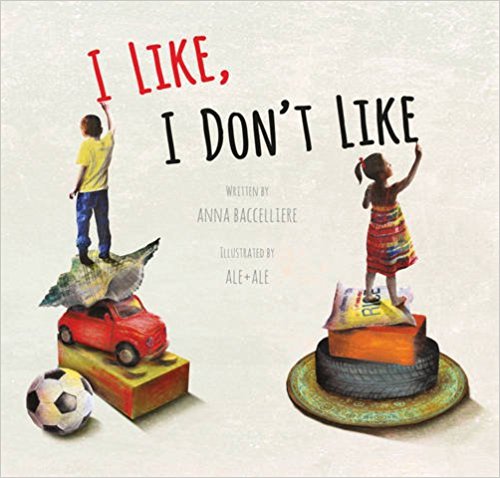 I Like, I Don’t Like Anna Baccelliere, illustrated by Ale + Ale (Eerdmans Books for Young Readers) $16.00 Perhaps offering this in the Easter basket isn’t quite the right time and place but perhaps for some families it would be very useful to have around during Easter celebrations. I hope I can tell you more about this book (and the series of which it is a part) another time as we want to champion it. For now, just know it is beautiful, moving, although a bit disturbing. The counter-facing pages are a study in contrast between rich and less privileged children. For instance, one spread shows a fairly normal child form the middle class or privileged West that likes “cars” (showing the child playing with toy cars) but that is contrasted with another child shown working washing car windows, saying “I don’t like cars.” One spread shows a child eating a nice bowl of rice saying “I like rice” but another child, perhaps in Viet Nam, saying “I don’t like rice” as she is working in the paddies. The one about soccer balls, which shows some kids playing happily and another child working to manufacture the ball, is stunning.
I Like, I Don’t Like Anna Baccelliere, illustrated by Ale + Ale (Eerdmans Books for Young Readers) $16.00 Perhaps offering this in the Easter basket isn’t quite the right time and place but perhaps for some families it would be very useful to have around during Easter celebrations. I hope I can tell you more about this book (and the series of which it is a part) another time as we want to champion it. For now, just know it is beautiful, moving, although a bit disturbing. The counter-facing pages are a study in contrast between rich and less privileged children. For instance, one spread shows a fairly normal child form the middle class or privileged West that likes “cars” (showing the child playing with toy cars) but that is contrasted with another child shown working washing car windows, saying “I don’t like cars.” One spread shows a child eating a nice bowl of rice saying “I like rice” but another child, perhaps in Viet Nam, saying “I don’t like rice” as she is working in the paddies. The one about soccer balls, which shows some kids playing happily and another child working to manufacture the ball, is stunning.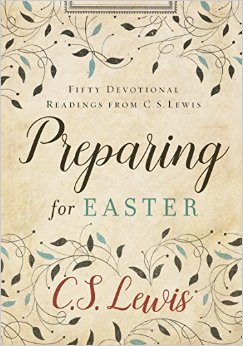 Preparing for Easter: Fifty Devotional Readings from C.S. Lewis C.S. Lewis (HarperOne) $17.99 We’ve blogged before about good Lent books, and this obviously, at first glance, is designed to be read during this time before Easter. However — come on, people — it’s C.S. Lewis, by jove. And he didn’t write this as a Lenten resource, but it was compiled from his various readings. I’ve looked at this carefully, and I’m more than confident to say that this totally would work any time of any season. The marketing is genius to select readings that point us to the cross and resurrection, but it is Lewisy enough to be a great Easter gift.
Preparing for Easter: Fifty Devotional Readings from C.S. Lewis C.S. Lewis (HarperOne) $17.99 We’ve blogged before about good Lent books, and this obviously, at first glance, is designed to be read during this time before Easter. However — come on, people — it’s C.S. Lewis, by jove. And he didn’t write this as a Lenten resource, but it was compiled from his various readings. I’ve looked at this carefully, and I’m more than confident to say that this totally would work any time of any season. The marketing is genius to select readings that point us to the cross and resurrection, but it is Lewisy enough to be a great Easter gift.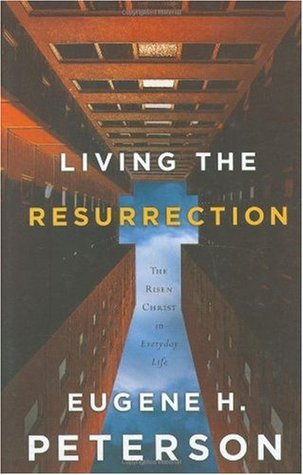 Living the Resurrection: The Risen Christ in Everyday Life Eugene Peterson (NavPress) $11.99 paperback/$14.99 hardback I recommend this book every year about this time as I so appreciate it. There are three great chapters on post-Easter appearances of Jesus described in the gospels, “Resurrection Wonder”, “Resurrection Friends”, and “Resurrection Meals.” Each is linked to Christian practices, things we should do more intentionally and attentively as we live out the power of resurrection in our ordinary lives. This is a great, great book, and would make a fabulous little gift for anyone in the next few weeks.
Living the Resurrection: The Risen Christ in Everyday Life Eugene Peterson (NavPress) $11.99 paperback/$14.99 hardback I recommend this book every year about this time as I so appreciate it. There are three great chapters on post-Easter appearances of Jesus described in the gospels, “Resurrection Wonder”, “Resurrection Friends”, and “Resurrection Meals.” Each is linked to Christian practices, things we should do more intentionally and attentively as we live out the power of resurrection in our ordinary lives. This is a great, great book, and would make a fabulous little gift for anyone in the next few weeks.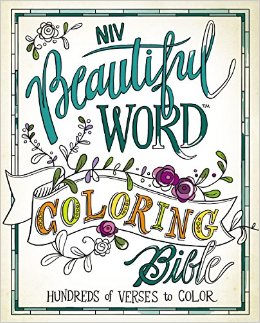 The NIV Beautiful Word Coloring Bible (Zondervan) $39.99 Okay, there are obviously more scholarly and useful study editions available, but this is might make a perfect gift for a special person, so figured we should mention it. There are hundreds of verses illustrated in detailed, ready-to-color line art and, as they say “employs the proven stress-relieving benefits of coloring to help quiet your soul so you can reflect on the precious truths of Scripture.” (The thicker white paper with lightly ruled lines in the extra-wide margins provides ample space for journaling or extra artistic expressions, too.) There are hundreds of verses illustrated so even in the act of coloring them you are engaging thoughtfully and intentionally with the Word.
The NIV Beautiful Word Coloring Bible (Zondervan) $39.99 Okay, there are obviously more scholarly and useful study editions available, but this is might make a perfect gift for a special person, so figured we should mention it. There are hundreds of verses illustrated in detailed, ready-to-color line art and, as they say “employs the proven stress-relieving benefits of coloring to help quiet your soul so you can reflect on the precious truths of Scripture.” (The thicker white paper with lightly ruled lines in the extra-wide margins provides ample space for journaling or extra artistic expressions, too.) There are hundreds of verses illustrated so even in the act of coloring them you are engaging thoughtfully and intentionally with the Word. 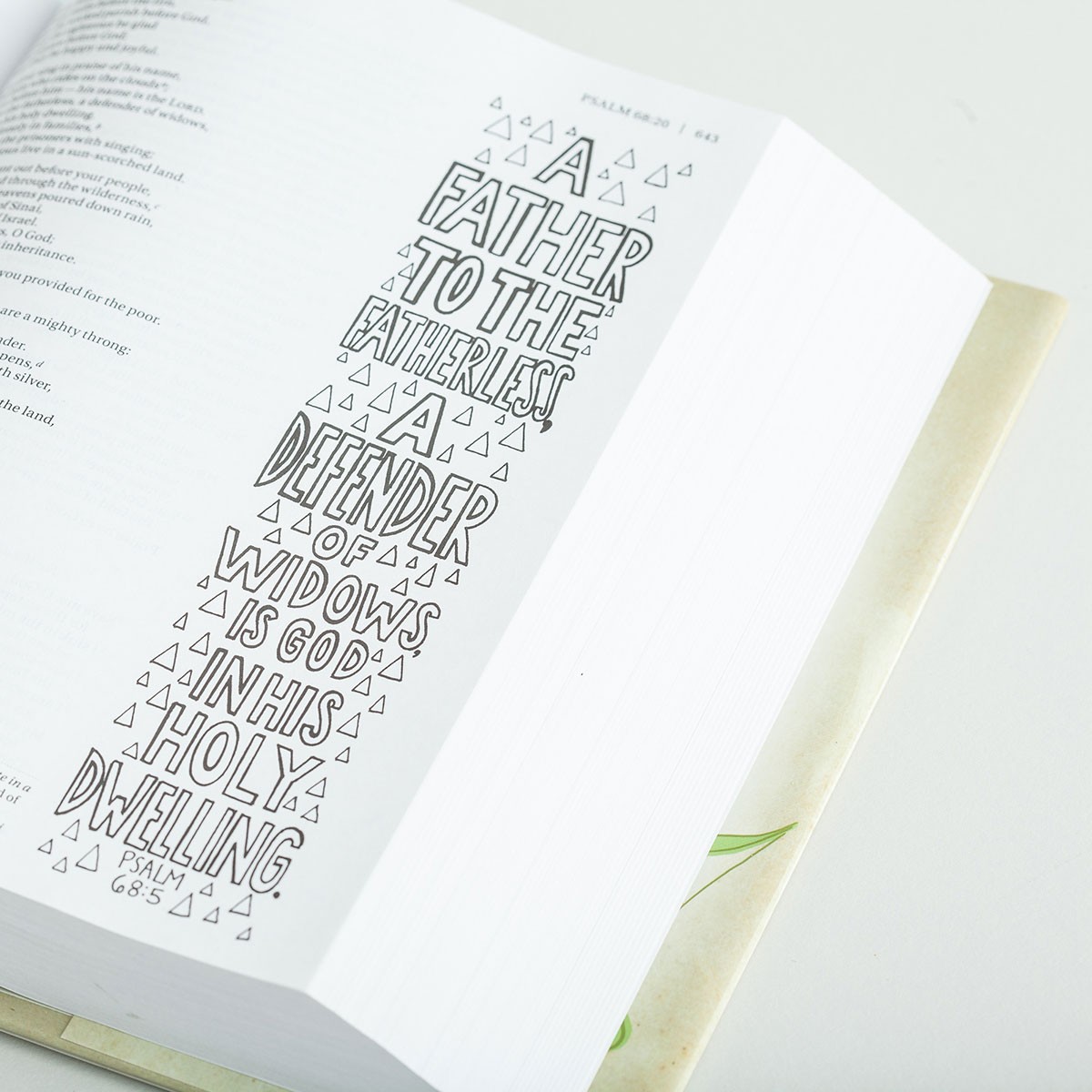 There’s a nice ribbon marker and, as with other well made Zondervan Bibles, it has a good binding that allows it to lay flat in your hand or desk. Nice.
There’s a nice ribbon marker and, as with other well made Zondervan Bibles, it has a good binding that allows it to lay flat in your hand or desk. Nice.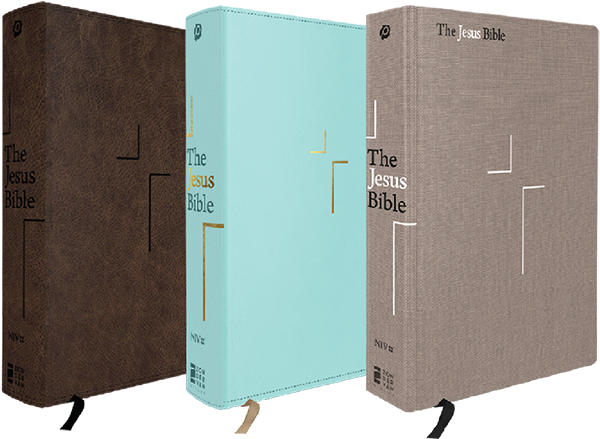 The NIV Jesus Bible: Sixty Six Books. One Story. All About One Name (Passion Publishing /Zondervan) $44.99 in sturdy linen hardback; $69.99 in Brown Leathersoft or a Robin’s Egg pale blue Leathersoft. All have a 8.7 font size with a nice ribbon marker.
The NIV Jesus Bible: Sixty Six Books. One Story. All About One Name (Passion Publishing /Zondervan) $44.99 in sturdy linen hardback; $69.99 in Brown Leathersoft or a Robin’s Egg pale blue Leathersoft. All have a 8.7 font size with a nice ribbon marker. 

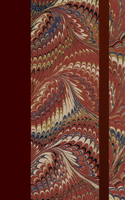
 ESV
ESV 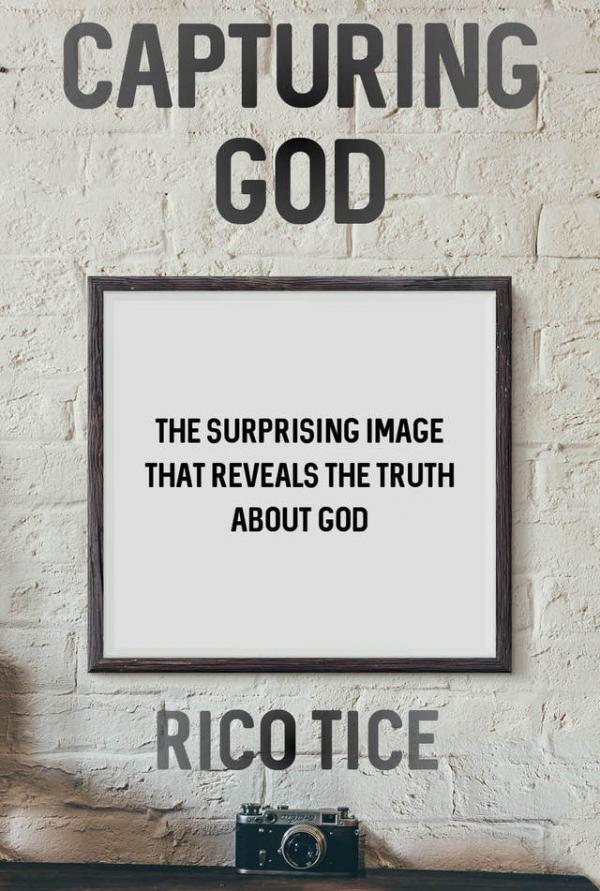 Capturing God: The Surprising Image That Reveals the Truth About God Rico Tice (The Good Books Company) $4.99 The premise of this short little paperback is simple: if somebody said that actually had a picture of God, wouldn’t you want to see it? Who wouldn’t? Tice goes from there suggesting that the story of Jesus on the cross reveals the best picture of God we’ve got: why he loved us so much, why he sacrificed for us, what the cross reveals about the extraordinary love of God. It simply walks readers through the passion and death and — yes — the resurrection of Jesus. It ends with Christ offering the amazing offer of grace and peace. Becky Pippert asks, “Ever read a book so gripping you can’t put it down?” Shen then insists — “This is one of them!”
Capturing God: The Surprising Image That Reveals the Truth About God Rico Tice (The Good Books Company) $4.99 The premise of this short little paperback is simple: if somebody said that actually had a picture of God, wouldn’t you want to see it? Who wouldn’t? Tice goes from there suggesting that the story of Jesus on the cross reveals the best picture of God we’ve got: why he loved us so much, why he sacrificed for us, what the cross reveals about the extraordinary love of God. It simply walks readers through the passion and death and — yes — the resurrection of Jesus. It ends with Christ offering the amazing offer of grace and peace. Becky Pippert asks, “Ever read a book so gripping you can’t put it down?” Shen then insists — “This is one of them!”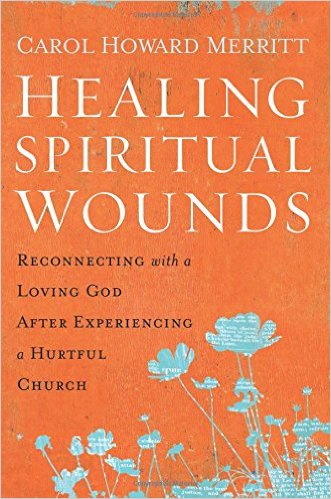
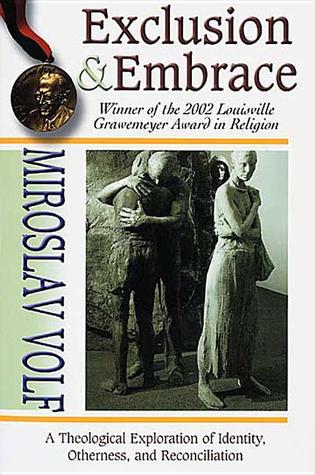
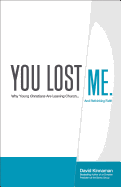 You Lost Me: Why Young Christians Are Leaving Church . . . and Rethinking Faith by David Kinnaman (Baker; $15.99) and was reminded again of how important it is, how I wish a handful of folks in every church would read it and discuss its proposals for retaining young adults in the life of the church. Or gather to watch the DVD which is very good. His previous book, co-written with Gabe Lyon, UnChristian: What a New Generation Really Thinks about Christianity… and Why It Matters (Baker; $15.99) is well worth reading as it was one of the groundbreaking bits of research (released just five years ago) of what young adults thought about Christianity. And, yes, some of the perception is that Christianity teaches stuff that is bigoted, unsavory, unkind, untrue.
You Lost Me: Why Young Christians Are Leaving Church . . . and Rethinking Faith by David Kinnaman (Baker; $15.99) and was reminded again of how important it is, how I wish a handful of folks in every church would read it and discuss its proposals for retaining young adults in the life of the church. Or gather to watch the DVD which is very good. His previous book, co-written with Gabe Lyon, UnChristian: What a New Generation Really Thinks about Christianity… and Why It Matters (Baker; $15.99) is well worth reading as it was one of the groundbreaking bits of research (released just five years ago) of what young adults thought about Christianity. And, yes, some of the perception is that Christianity teaches stuff that is bigoted, unsavory, unkind, untrue.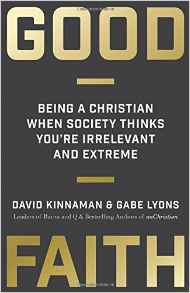
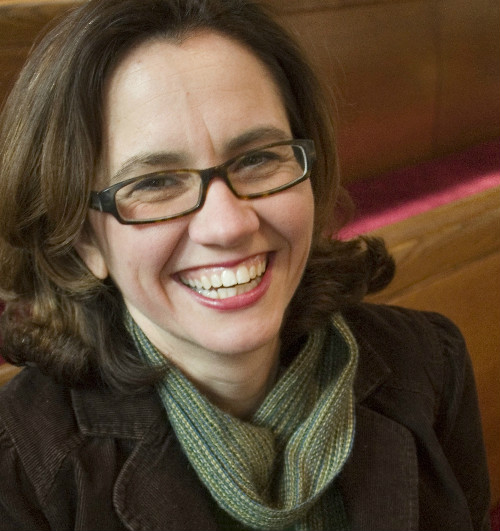 Healing Spiritual Wounds is full of stories, well told and often painful testimonials of folks who have gone through hurtful stuff. Much of this is grounded in Merritt’s own narrative, making this nearly a spiritual memoir. She tells of her own journey in a pretty strict church, in a complicated family, with a violent father. She reveals something else significant about her father later in the book – I don’t want to spoil the literary power of his one small reveal – but she is both empathetic and remains resolute to not justify domestic violence, let alone religious-motivated violence. She writes well about parts of her life and it is at times riveting, sometimes anguishing, sometimes entertaining.
Healing Spiritual Wounds is full of stories, well told and often painful testimonials of folks who have gone through hurtful stuff. Much of this is grounded in Merritt’s own narrative, making this nearly a spiritual memoir. She tells of her own journey in a pretty strict church, in a complicated family, with a violent father. She reveals something else significant about her father later in the book – I don’t want to spoil the literary power of his one small reveal – but she is both empathetic and remains resolute to not justify domestic violence, let alone religious-motivated violence. She writes well about parts of her life and it is at times riveting, sometimes anguishing, sometimes entertaining.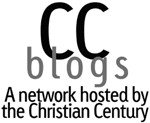 gender roles. Granted, she used her blog at the Christian Century to rail against the award being given by Princeton Theological Seminary to Timothy Keller who, as she saw it, was hostile to the basic theological task of PTS which includes preparing women and members of the LGTBQ+ community for Christian ministry and ordination. (I wrote about that in a previous BookNotes newsletter, trying to respect both those who disagree with Keller’s view, as I do, and to yet affirm his mostly excellent contributions for which the Kuyper Award was to have been given.) But my point here is that Healing Spiritual Wounds is not only, or not even mostly, about this kind of faith which she names as toxic that excludes gays and women from leadership. This is part of her agenda, of course, but the book covers much, much, more.
gender roles. Granted, she used her blog at the Christian Century to rail against the award being given by Princeton Theological Seminary to Timothy Keller who, as she saw it, was hostile to the basic theological task of PTS which includes preparing women and members of the LGTBQ+ community for Christian ministry and ordination. (I wrote about that in a previous BookNotes newsletter, trying to respect both those who disagree with Keller’s view, as I do, and to yet affirm his mostly excellent contributions for which the Kuyper Award was to have been given.) But my point here is that Healing Spiritual Wounds is not only, or not even mostly, about this kind of faith which she names as toxic that excludes gays and women from leadership. This is part of her agenda, of course, but the book covers much, much, more.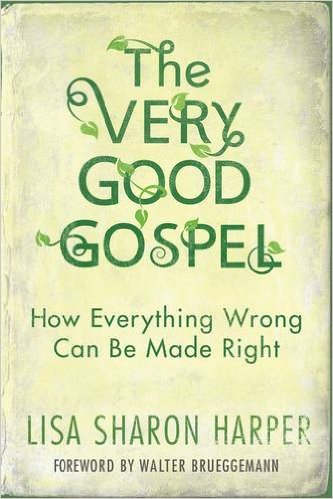
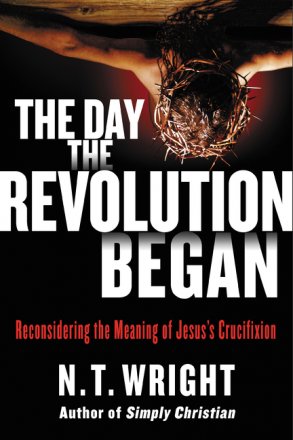 out to get you, and we have to formulate our creeds and doctrines in ways that are consistent with the gospel itself.
out to get you, and we have to formulate our creeds and doctrines in ways that are consistent with the gospel itself. 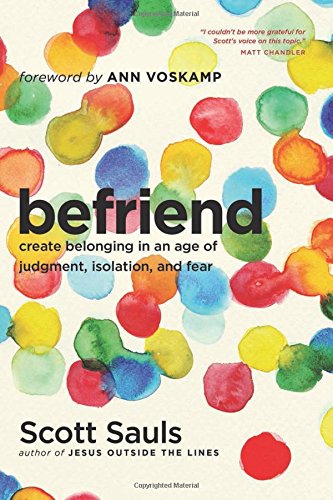 Sauls wonderful Befriend: Create Belonging in an Age of Judgement, Isolation, and Fear (Tyndale; $15.99) or Steve Brown’s book called Three Free Sins: God’s Not Mad at You (Howard Books; $14.99) or Margot Starbuck’s wonderfully-written Not Who I Imagined: Surprised by a Loving God (Baker; $14.99.) Jonathan Merritt (no relation to Carol, by the way) has a fantastic, moving set of pieces in Jesus Is Better Than You Imagined (FaithWords; $20.00.) Carol Merritt might have been wise to connect her therapeutic efforts and progressive effort to re-imagine faith with these other less dramatic resources, rooting her within the on-going conversation among evangelicals that are working for similar goals.)
Sauls wonderful Befriend: Create Belonging in an Age of Judgement, Isolation, and Fear (Tyndale; $15.99) or Steve Brown’s book called Three Free Sins: God’s Not Mad at You (Howard Books; $14.99) or Margot Starbuck’s wonderfully-written Not Who I Imagined: Surprised by a Loving God (Baker; $14.99.) Jonathan Merritt (no relation to Carol, by the way) has a fantastic, moving set of pieces in Jesus Is Better Than You Imagined (FaithWords; $20.00.) Carol Merritt might have been wise to connect her therapeutic efforts and progressive effort to re-imagine faith with these other less dramatic resources, rooting her within the on-going conversation among evangelicals that are working for similar goals.) 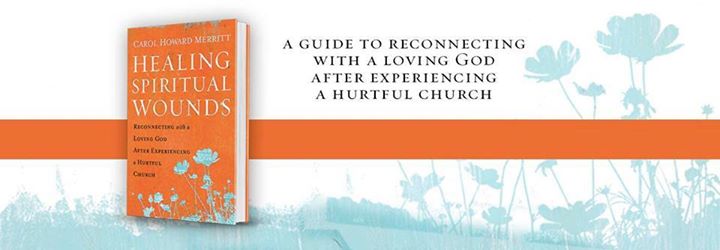
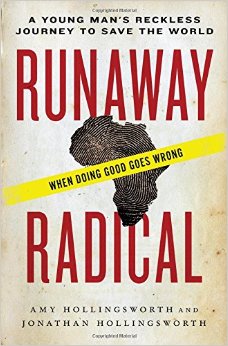 Runaway Radical: When Doing Good Goes Wrong Amy Hollingsworth and Jonathan Hollingsworth (Thomas Nelson) $15.99 I have reviewed this before and recommend it often. It is a riveting story of “a young man’s reckless journey to save the world” inspired, as he was, by passionate leaders, popular books, serious views of radical discipleship and a demanding God (even if what was demanded was social justice, simple living, and a global concern.) Much good is perverted by harsh leaders and legalistic readings, and this fascinating memoir — co-written in alternating chapters by a son and his mother — tells of distorted expectations, a missionary calling that goes awry, a faith almost lost, and a very, very corrupt, authoritarian church. Wow.
Runaway Radical: When Doing Good Goes Wrong Amy Hollingsworth and Jonathan Hollingsworth (Thomas Nelson) $15.99 I have reviewed this before and recommend it often. It is a riveting story of “a young man’s reckless journey to save the world” inspired, as he was, by passionate leaders, popular books, serious views of radical discipleship and a demanding God (even if what was demanded was social justice, simple living, and a global concern.) Much good is perverted by harsh leaders and legalistic readings, and this fascinating memoir — co-written in alternating chapters by a son and his mother — tells of distorted expectations, a missionary calling that goes awry, a faith almost lost, and a very, very corrupt, authoritarian church. Wow.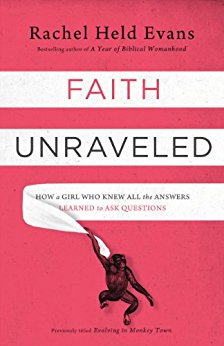 Faith Unraveled: How a Girl Who Knew All The Answers Learned to Ask Questions Rachel Held Evans (Thomas Nelson) $15.99 Evans is somewhat of a poster-girl of young, formerly evangelical women who’s faith journey has been documented on blogs and in books and at conferences, and this, her first, is a great example of coping with styles of strict faith that shuts down questions, and insists on pat answers and social conformity. Evans was raised in the town famous for the Scopes “Monkey Trials” and this is her telling of her coming of age in that milieu, facing trials of her own, and realizing how her own faith had to adapt and evolve if it was to survive. So, yep, this is one good example of less than helpful understandings of evangelical faith and the reflections of a woman whose voice is needed in these kinds of conversations. Previously released as Evolving in Monkey Town.
Faith Unraveled: How a Girl Who Knew All The Answers Learned to Ask Questions Rachel Held Evans (Thomas Nelson) $15.99 Evans is somewhat of a poster-girl of young, formerly evangelical women who’s faith journey has been documented on blogs and in books and at conferences, and this, her first, is a great example of coping with styles of strict faith that shuts down questions, and insists on pat answers and social conformity. Evans was raised in the town famous for the Scopes “Monkey Trials” and this is her telling of her coming of age in that milieu, facing trials of her own, and realizing how her own faith had to adapt and evolve if it was to survive. So, yep, this is one good example of less than helpful understandings of evangelical faith and the reflections of a woman whose voice is needed in these kinds of conversations. Previously released as Evolving in Monkey Town.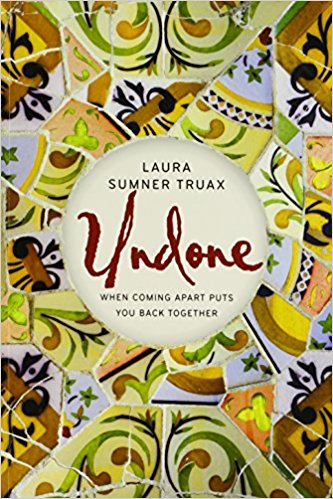 Undone: When Coming Apart Puts You Back Together Laura Sumner Truax (IVP) $15.00 I’ve often commended this moving story about a woman who felt like her life was falling apart, how Scripture and an encouraging community helped her embrace life with its varying joys and sorrows. She is the pastor of a church that Carol Merritt attended for a season that is described in her book and which was influential for her. Honest, raw, this is a story of owning one’s faith, no matter what.
Undone: When Coming Apart Puts You Back Together Laura Sumner Truax (IVP) $15.00 I’ve often commended this moving story about a woman who felt like her life was falling apart, how Scripture and an encouraging community helped her embrace life with its varying joys and sorrows. She is the pastor of a church that Carol Merritt attended for a season that is described in her book and which was influential for her. Honest, raw, this is a story of owning one’s faith, no matter what.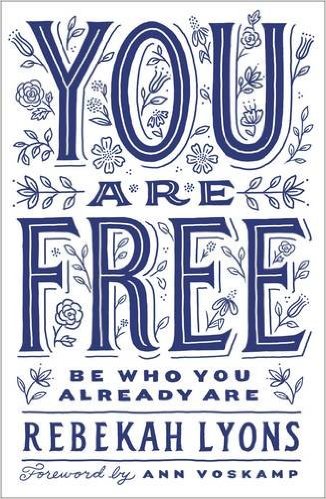 You Are Free: Be Who You Already Are Rebekah Lyons (Zondervan) $19.99 I think if I were convening a rount-table discussion around Carol’s book I’d want Rebekah Lyons there because so much of her new book is just a simple cry for women — and all of us, really — to feel accepted. God loves us, Christ redeems us, we don’t have to fret about what others think (or, what we think) about us. This is a book about freedom and she writes what one author called “an anthem for healing, freedom, and hope.” The ever poetic Ann Voskamp says “Hold these pages like a burning flame in the palm of your hands, like a bit of glowing sun that will grow you into freedom soaring on wind.” So, who doesn’t need a bit of that? I’d recommend Rebekah’s wise book for anyone wanting to grief past disappointments and “discover the courage to begin again — and use your newfound freedom to set others free.” We carry the DVD of this, too, by the way, if you want to gather some folks together and watch her teach this freedom song.
You Are Free: Be Who You Already Are Rebekah Lyons (Zondervan) $19.99 I think if I were convening a rount-table discussion around Carol’s book I’d want Rebekah Lyons there because so much of her new book is just a simple cry for women — and all of us, really — to feel accepted. God loves us, Christ redeems us, we don’t have to fret about what others think (or, what we think) about us. This is a book about freedom and she writes what one author called “an anthem for healing, freedom, and hope.” The ever poetic Ann Voskamp says “Hold these pages like a burning flame in the palm of your hands, like a bit of glowing sun that will grow you into freedom soaring on wind.” So, who doesn’t need a bit of that? I’d recommend Rebekah’s wise book for anyone wanting to grief past disappointments and “discover the courage to begin again — and use your newfound freedom to set others free.” We carry the DVD of this, too, by the way, if you want to gather some folks together and watch her teach this freedom song.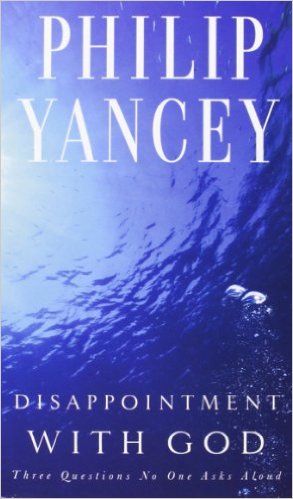
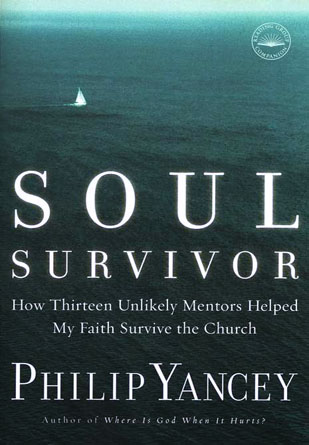 Disappointment with God: Three Questions No One Asks Aloud Philip Yancey (Zondervan) $14.99 I sometimes am reluctant to recommend Yancey just because so many do; he is considered a smart, thoughtful, open-minded evangelical, and like, oh, say, Frederick Beuchner, is an author intelligent folks like. Well, there’s a reason for that: he is often brilliant, really interesting, an excellent writer, and he has a lot to say. I have revisited this over and over and really do recommend it. By the way, he tells of his own struggle to maintain commitment to the faith and to church in his great Soul Survivor: How Thirteen Unlikely Mentors Helped My Faith Survive the Church (Waterbrook) $14.99. His voice and approach — offering great thinkers and leaders with edgy integrity as inspiration for how to heal and why to endure — is a different approach than Merritt’s and would be a good contribution in our strategies to help others recovery from bad church experiences. And I suppose you know his classic What’s So Amazing About Grace. Get a few and give ’em out!
Disappointment with God: Three Questions No One Asks Aloud Philip Yancey (Zondervan) $14.99 I sometimes am reluctant to recommend Yancey just because so many do; he is considered a smart, thoughtful, open-minded evangelical, and like, oh, say, Frederick Beuchner, is an author intelligent folks like. Well, there’s a reason for that: he is often brilliant, really interesting, an excellent writer, and he has a lot to say. I have revisited this over and over and really do recommend it. By the way, he tells of his own struggle to maintain commitment to the faith and to church in his great Soul Survivor: How Thirteen Unlikely Mentors Helped My Faith Survive the Church (Waterbrook) $14.99. His voice and approach — offering great thinkers and leaders with edgy integrity as inspiration for how to heal and why to endure — is a different approach than Merritt’s and would be a good contribution in our strategies to help others recovery from bad church experiences. And I suppose you know his classic What’s So Amazing About Grace. Get a few and give ’em out!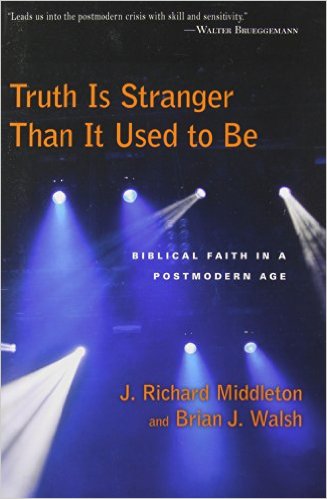 Truth Is Stranger Than It Used to Be: Biblical Faith in a Postmodern Age Brian Walsh & Richard Middleton (IVP Academic) $22.00 Let’s get this said at some point in our round-table conversation: the rise in disaffected folks from conventional religion is at least in some ways a consequence of post-modernity, not to mention the postmodern teachings about the marginalized, the dangers of power, the way those in charge tend to oppress others with their totalizing narratives that squeeze out all others. Not everyone needs to grapple with postmodern philosophers and this huge cultural shift but for those that do, I think this is still the best — and certainly the most Biblical — engagement with that stream of thought and cultural posture. Walsh & Middleton were deeply, deeply touched by the marginalized in their own settings and by listening well to postmodern scholars, the cries from the streets, artists like Bruce Cockburn, and, naturally, the women in their lives who were often less than accepted among male-dominated faith-based institutions, they came to grapple well with the ideas and orientations and opportunities of postmodernism. The heavy last half of the book shows how an opened up understanding of the drama of Scripture — perhaps a la Walter Brueggemann’s The Prophetic Imagination and Israel’s Praise with the potent sub-title “Doxology Against Idolatry and Ideology” — is, in fact, the way to engage our postmodern culture and those soured on conventional arrangements. Brian and his wife, Bible scholar Sylvia Keesmaat, continued this project in their nearly revolutionary Colossians Remixed: Subverting the Empire (IVP Academic; $24.00) which I also think would be very, very helpful for those working their way into more liberating and healthy understandings.
Truth Is Stranger Than It Used to Be: Biblical Faith in a Postmodern Age Brian Walsh & Richard Middleton (IVP Academic) $22.00 Let’s get this said at some point in our round-table conversation: the rise in disaffected folks from conventional religion is at least in some ways a consequence of post-modernity, not to mention the postmodern teachings about the marginalized, the dangers of power, the way those in charge tend to oppress others with their totalizing narratives that squeeze out all others. Not everyone needs to grapple with postmodern philosophers and this huge cultural shift but for those that do, I think this is still the best — and certainly the most Biblical — engagement with that stream of thought and cultural posture. Walsh & Middleton were deeply, deeply touched by the marginalized in their own settings and by listening well to postmodern scholars, the cries from the streets, artists like Bruce Cockburn, and, naturally, the women in their lives who were often less than accepted among male-dominated faith-based institutions, they came to grapple well with the ideas and orientations and opportunities of postmodernism. The heavy last half of the book shows how an opened up understanding of the drama of Scripture — perhaps a la Walter Brueggemann’s The Prophetic Imagination and Israel’s Praise with the potent sub-title “Doxology Against Idolatry and Ideology” — is, in fact, the way to engage our postmodern culture and those soured on conventional arrangements. Brian and his wife, Bible scholar Sylvia Keesmaat, continued this project in their nearly revolutionary Colossians Remixed: Subverting the Empire (IVP Academic; $24.00) which I also think would be very, very helpful for those working their way into more liberating and healthy understandings. 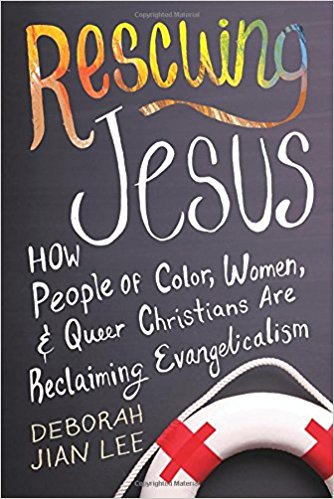 Rescuing Jesus: How People of Color, Women, & Queer Christians Are Reclaiming Evangelicalism Deborah Jian Lee (Beacon Press) $26.95 Yes, Deborah Lee should be at this conversation as she has listened well — for years, all over the country, as she was writing this book. She embraced evangelical faith as a youth and matured in faith in her college years. Slowly, though, she came to have that faith eroded by the injustices and inconsistencies she witnesses within the evangelical young adult campus ministry cultures at college and elsewhere. After leaving the faith, though, she couldn’t shake this sense that things are changing within evangelicalism as people on the margins — women, people of color and LGBTQ persons — are seen and sometimes heard. As I said when I awarded this one of the Best Books of 2016, I found it deeply moving, an extraordinary read and, agree or not with her evaluations, the stories of people in this book are stories that must be taken seriously. I am grateful for her work; here’s hoping she herself might find a refreshed sort of Christian experience. Perhaps she is the sort of person who might benefit from Carol’s book.
Rescuing Jesus: How People of Color, Women, & Queer Christians Are Reclaiming Evangelicalism Deborah Jian Lee (Beacon Press) $26.95 Yes, Deborah Lee should be at this conversation as she has listened well — for years, all over the country, as she was writing this book. She embraced evangelical faith as a youth and matured in faith in her college years. Slowly, though, she came to have that faith eroded by the injustices and inconsistencies she witnesses within the evangelical young adult campus ministry cultures at college and elsewhere. After leaving the faith, though, she couldn’t shake this sense that things are changing within evangelicalism as people on the margins — women, people of color and LGBTQ persons — are seen and sometimes heard. As I said when I awarded this one of the Best Books of 2016, I found it deeply moving, an extraordinary read and, agree or not with her evaluations, the stories of people in this book are stories that must be taken seriously. I am grateful for her work; here’s hoping she herself might find a refreshed sort of Christian experience. Perhaps she is the sort of person who might benefit from Carol’s book.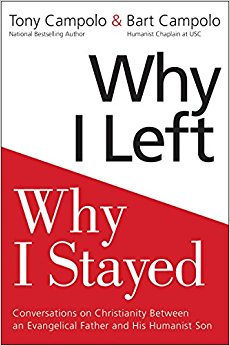 Why I Left, Why I Stayed: Conversations on Christianity Between an Evangelical Father and His Humanist Son Tony Campolo & Bart Campolo (HarperOne) $24.99 These two might add insight to our conversation, and certainly they bring a unique perspective. Campolo, as you know, is an evangelical with progressive leanings and in recent years his son, Bart, could no longer intellectually accept the tenants of the Christian faith. I’m not sure Bart was hurt by Christians, but he just found the core essentials of Christianity no longer tenable. He is now a humanist chaplain at a big college, offering some sort of pastoral, ethical guidance to those who are not aligned with a more conventional religion. This new book is a powerful back and forth, heartbreaking and raw, honest and thought-provoking. There is much to be learned here for those who have the ears to hear.
Why I Left, Why I Stayed: Conversations on Christianity Between an Evangelical Father and His Humanist Son Tony Campolo & Bart Campolo (HarperOne) $24.99 These two might add insight to our conversation, and certainly they bring a unique perspective. Campolo, as you know, is an evangelical with progressive leanings and in recent years his son, Bart, could no longer intellectually accept the tenants of the Christian faith. I’m not sure Bart was hurt by Christians, but he just found the core essentials of Christianity no longer tenable. He is now a humanist chaplain at a big college, offering some sort of pastoral, ethical guidance to those who are not aligned with a more conventional religion. This new book is a powerful back and forth, heartbreaking and raw, honest and thought-provoking. There is much to be learned here for those who have the ears to hear.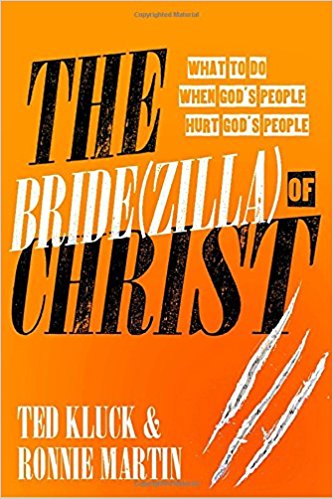 The Bride(zilla) of Christ Ted Kluck & Ronnie Martin (Multnomah) $15.99 This has a different tone — upbeat, clever, and quite theologically evangelical — but is nonetheless honest about the wounds inflicted by the church and steps we can take to move forward in those times when the church hurts. There is much mercy here, good stuff about hope and grace. Kluck teaches at Union University in Tennessee and has worked in sports journalism; Ronnie Martin has been a pastor in small town Pennsylvania and Ohio and previously was known in the Christian music scene, doing electronica music under the name Joy Electric.
The Bride(zilla) of Christ Ted Kluck & Ronnie Martin (Multnomah) $15.99 This has a different tone — upbeat, clever, and quite theologically evangelical — but is nonetheless honest about the wounds inflicted by the church and steps we can take to move forward in those times when the church hurts. There is much mercy here, good stuff about hope and grace. Kluck teaches at Union University in Tennessee and has worked in sports journalism; Ronnie Martin has been a pastor in small town Pennsylvania and Ohio and previously was known in the Christian music scene, doing electronica music under the name Joy Electric. 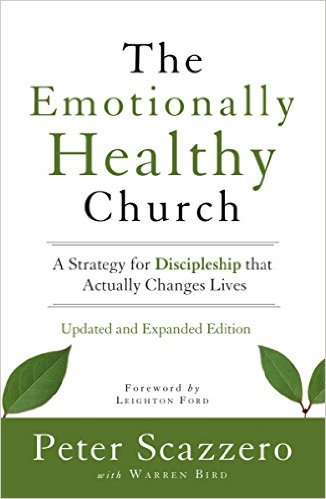 The Emotionally Healthy Church: A Strategy for Discipleship that Actually Changes Lives Peter Scazzero (Zondervan) $22.99 Yes, yes, most Christians do want to be transformed by Christ and we want to be eager disciples, not just casual church attendees. This book invites us, as so many do, to find the power and programming to actually help folks grow in their faith. But here’s the thing: we need healthy people to create healthy communities. This is a very important book, balanced, clear, helpful; it’s not terribly sophisticated or heavy. Fostering some emotional intelligence and becoming more of a safe place won’t prevent all hurtful ideas, but it is a good start, no? See also his Emotionally Healthy Leader, Emotionally Healthy Spirituality and Geri Scazzero’s Emotionally Healthy Woman. I think Peter and Geri Scazzero have something to teach us, a bit more than “common sense” and needed today.
The Emotionally Healthy Church: A Strategy for Discipleship that Actually Changes Lives Peter Scazzero (Zondervan) $22.99 Yes, yes, most Christians do want to be transformed by Christ and we want to be eager disciples, not just casual church attendees. This book invites us, as so many do, to find the power and programming to actually help folks grow in their faith. But here’s the thing: we need healthy people to create healthy communities. This is a very important book, balanced, clear, helpful; it’s not terribly sophisticated or heavy. Fostering some emotional intelligence and becoming more of a safe place won’t prevent all hurtful ideas, but it is a good start, no? See also his Emotionally Healthy Leader, Emotionally Healthy Spirituality and Geri Scazzero’s Emotionally Healthy Woman. I think Peter and Geri Scazzero have something to teach us, a bit more than “common sense” and needed today.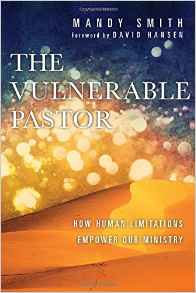 The Vulnerable Pastor: How Human Limitations Empower Our Ministry Mandy Smith (IVP) $16.00 I think that sometimes pastors are particularly hurtful — at least in some of the stories we hear — as they are necessarily authority figures and formative for their flock. Humility is important, but it seems that Smith — herself a successful pastor of a church in Cincinnati — is on to something here by insisting, firstly, that “pastors are human, too” and that sharing vulnerability, admitting limits and failures and weakness, opens up a generative space for real faith development to occur. We don’t need clergy with all the answers or authoritarian teachers who tell us what to believe. We need people of integrity to walk with us in our brokenness, modeling a Christ-like faith. This is a great book and would go a long way to heal the harsh view some have of Christian leaders.
The Vulnerable Pastor: How Human Limitations Empower Our Ministry Mandy Smith (IVP) $16.00 I think that sometimes pastors are particularly hurtful — at least in some of the stories we hear — as they are necessarily authority figures and formative for their flock. Humility is important, but it seems that Smith — herself a successful pastor of a church in Cincinnati — is on to something here by insisting, firstly, that “pastors are human, too” and that sharing vulnerability, admitting limits and failures and weakness, opens up a generative space for real faith development to occur. We don’t need clergy with all the answers or authoritarian teachers who tell us what to believe. We need people of integrity to walk with us in our brokenness, modeling a Christ-like faith. This is a great book and would go a long way to heal the harsh view some have of Christian leaders. 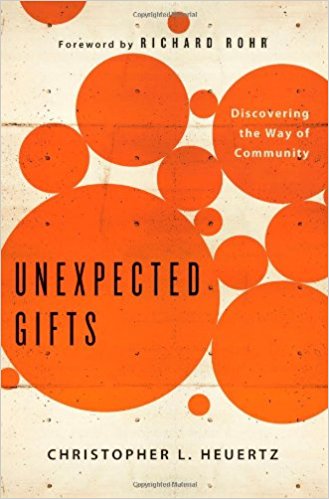 Unexpected Gifts: Discovering the Way of Community Christopher Heuertz (Howard) $14.99 I think any further discussion of Carol’s important book about hurtful faith would have to next explore the nature of Christian community, what it means that we are in this together, and how our betrayals and failures and doubts are part of the mix when one enters into deeper involvement in the lives of faith communities. I don’t think I know a better book that gets at how relationships within our churches and fellowships can be painful, but that staying together can create something beyond the pain. We can take risks being more intentionally commitment to community, receive the gifts that emerge and create something healing and good and beautiful.
Unexpected Gifts: Discovering the Way of Community Christopher Heuertz (Howard) $14.99 I think any further discussion of Carol’s important book about hurtful faith would have to next explore the nature of Christian community, what it means that we are in this together, and how our betrayals and failures and doubts are part of the mix when one enters into deeper involvement in the lives of faith communities. I don’t think I know a better book that gets at how relationships within our churches and fellowships can be painful, but that staying together can create something beyond the pain. We can take risks being more intentionally commitment to community, receive the gifts that emerge and create something healing and good and beautiful.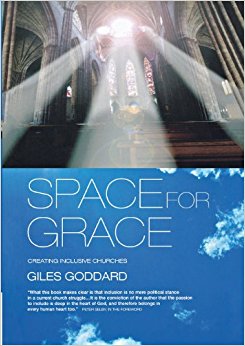 Space for Grace: Creating Inclusive Churches Giles Goddard (Canterbury) $20.99 Why not bring a British voice into this conversation, a Rector in South London who has struggled with this, thought it through, researched much about various models of being both pastoral and prophetic and offering a grace-filled view of the good news within mainline churches. How can we share leadership, treat everyone as equal before God, balance freedom and limits, drawing people from the margins to the center? (Or, as this UK book puts it, the centre.)
Space for Grace: Creating Inclusive Churches Giles Goddard (Canterbury) $20.99 Why not bring a British voice into this conversation, a Rector in South London who has struggled with this, thought it through, researched much about various models of being both pastoral and prophetic and offering a grace-filled view of the good news within mainline churches. How can we share leadership, treat everyone as equal before God, balance freedom and limits, drawing people from the margins to the center? (Or, as this UK book puts it, the centre.)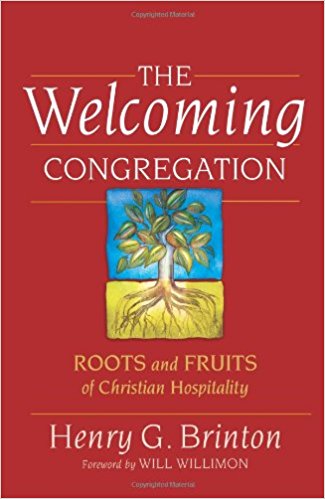 The Welcoming Congregation: Roots and Fruits of Christian Hospitality Henry G. Brinton (WJK) $17.00 There are bunches of books that we stock about hospitality and some are very, very thoughtful, deep, rich. Others are quite practical and lovely. Some are for individuals, others are for congregations. This is one written by a Presbyterian pastor who looks at the “roots” of hospitality” — the Biblical basis, the locations where we must be attentive to be hospitable, how to think about worship and small groups and meals in hospitable ways. Then he looks at the “fruits” which might include reconciliation, outreach, and fresh perceptions, mostly about “the other.” I think if we are reading Carol’s book about the dangers of hostile forms of religion and ways to help others heal from bad experiences with church, this would be a major step towards reforming our churches. Endorsements by thoughtful scholars like Serene Jones and Amy Oden and a moving foreword by Will Willimon.
The Welcoming Congregation: Roots and Fruits of Christian Hospitality Henry G. Brinton (WJK) $17.00 There are bunches of books that we stock about hospitality and some are very, very thoughtful, deep, rich. Others are quite practical and lovely. Some are for individuals, others are for congregations. This is one written by a Presbyterian pastor who looks at the “roots” of hospitality” — the Biblical basis, the locations where we must be attentive to be hospitable, how to think about worship and small groups and meals in hospitable ways. Then he looks at the “fruits” which might include reconciliation, outreach, and fresh perceptions, mostly about “the other.” I think if we are reading Carol’s book about the dangers of hostile forms of religion and ways to help others heal from bad experiences with church, this would be a major step towards reforming our churches. Endorsements by thoughtful scholars like Serene Jones and Amy Oden and a moving foreword by Will Willimon.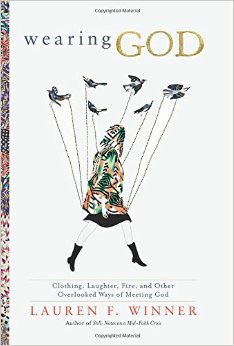 Wearing God: Clothing, Laughter, Fire, and Other Overlooked Ways of Meeting God Lauren Winner (HarperOne) $15.99 You know that we esteem Lauren’s remarkable ability to craft good words into good sentences, and that we read anything she writes. We appreciate her honestly told stories of faith — part memoir, part confession, part teaching — and we’re glad this is out in paperback, offering her insights about various images and metaphors for God. This explains images she finds in the Bible and she not only colorfully describes how these odd-ball images effected her own inner life and faith practices, but how early church, medieval and other mystics down through the ages have used these generative metaphors for the Divine One. Anybody talking about hurtful images of God or bad spiritual teaching or pushy, single-minded churches should spend some time ruminating along with this writer, teacher, and interesting Episcopal priest.
Wearing God: Clothing, Laughter, Fire, and Other Overlooked Ways of Meeting God Lauren Winner (HarperOne) $15.99 You know that we esteem Lauren’s remarkable ability to craft good words into good sentences, and that we read anything she writes. We appreciate her honestly told stories of faith — part memoir, part confession, part teaching — and we’re glad this is out in paperback, offering her insights about various images and metaphors for God. This explains images she finds in the Bible and she not only colorfully describes how these odd-ball images effected her own inner life and faith practices, but how early church, medieval and other mystics down through the ages have used these generative metaphors for the Divine One. Anybody talking about hurtful images of God or bad spiritual teaching or pushy, single-minded churches should spend some time ruminating along with this writer, teacher, and interesting Episcopal priest.  The Wisdom of Tenderness: What Happens When God’s Fierce Mercy Transforms Our Lives Brennan Manning (HarperSanFranciso) $13.95 Oh yes, if he were still with us, this ragamuffin gospel-lover would add much about views of God, about grace and intimacy and trust and risk and faith and hope. This book — despite the lovely, evocative “tenderness” in the title, is a serious call to real religion. As the Publishers Weekly starred review put it “Maning writes for both the individual and the institution, and both will benefit from listening to his words. Especially for those who long to hear more about divine mercy from the pulpit and see it reflected in their leaders and institutions.”
The Wisdom of Tenderness: What Happens When God’s Fierce Mercy Transforms Our Lives Brennan Manning (HarperSanFranciso) $13.95 Oh yes, if he were still with us, this ragamuffin gospel-lover would add much about views of God, about grace and intimacy and trust and risk and faith and hope. This book — despite the lovely, evocative “tenderness” in the title, is a serious call to real religion. As the Publishers Weekly starred review put it “Maning writes for both the individual and the institution, and both will benefit from listening to his words. Especially for those who long to hear more about divine mercy from the pulpit and see it reflected in their leaders and institutions.”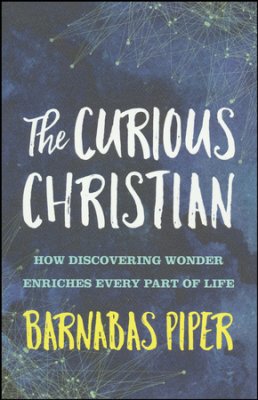
 The Curious Christian: How Discovering Wonder Enriches Every Part of Life Barnabas Piper (Broadman & Holman) $16.99 This author was raised in the home of exceptionally intense theologian/pastor/writer, the controversial John Piper. He tells of some of that in The Pastor’s Kid and has offered wise counsel about doubt in his Help My Unbelief: Why Doubt Is Not the Enemy of Faith. I think in this conversation about hurtful images of faith, I’d invite Barnabas to join in not only because of his own unique experiences in such a passionate home (with such fierce convictions) but because this book offers so much delightful wisdom, so much lovely insight that can counter harsh and unyielding views of faith. His call to wonder, his invitation to ask questions, his spiritual quest for beauty, his insistence that we are all called to deep curiosity, is a transforming counterbalance to those with pat answers, strict rules, unbending data. This nice book is dedicated to his mother.
The Curious Christian: How Discovering Wonder Enriches Every Part of Life Barnabas Piper (Broadman & Holman) $16.99 This author was raised in the home of exceptionally intense theologian/pastor/writer, the controversial John Piper. He tells of some of that in The Pastor’s Kid and has offered wise counsel about doubt in his Help My Unbelief: Why Doubt Is Not the Enemy of Faith. I think in this conversation about hurtful images of faith, I’d invite Barnabas to join in not only because of his own unique experiences in such a passionate home (with such fierce convictions) but because this book offers so much delightful wisdom, so much lovely insight that can counter harsh and unyielding views of faith. His call to wonder, his invitation to ask questions, his spiritual quest for beauty, his insistence that we are all called to deep curiosity, is a transforming counterbalance to those with pat answers, strict rules, unbending data. This nice book is dedicated to his mother.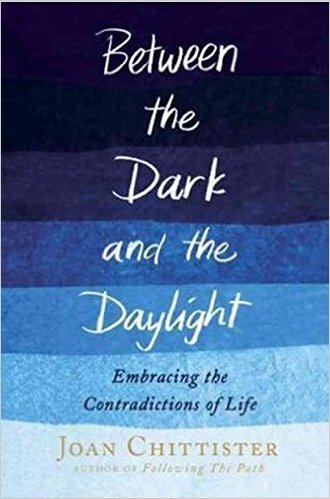 Between the Dark and the Daylight: Embracing the Contradictions of Life Joan Chittister (Image) $20.00 Sister Joan is beloved in many liturgical churches and is admired as a fine writer from within her generous Benedictine tradition. It seems to me she’s always a voice to listen to, but this idea that there are paradoxs at the heart of life, and certainly of faith, could be helpful for many hung up on more rigid systems of belief that they find intolerable. Barbara Brown Taylor says, “Here, at last, is a book for those ready to make peace with the unsolvable riddles of present-day life. Sister Joan has good news for you: these are the questions that make you human, and they can make you more joyously human if you choose.”
Between the Dark and the Daylight: Embracing the Contradictions of Life Joan Chittister (Image) $20.00 Sister Joan is beloved in many liturgical churches and is admired as a fine writer from within her generous Benedictine tradition. It seems to me she’s always a voice to listen to, but this idea that there are paradoxs at the heart of life, and certainly of faith, could be helpful for many hung up on more rigid systems of belief that they find intolerable. Barbara Brown Taylor says, “Here, at last, is a book for those ready to make peace with the unsolvable riddles of present-day life. Sister Joan has good news for you: these are the questions that make you human, and they can make you more joyously human if you choose.” 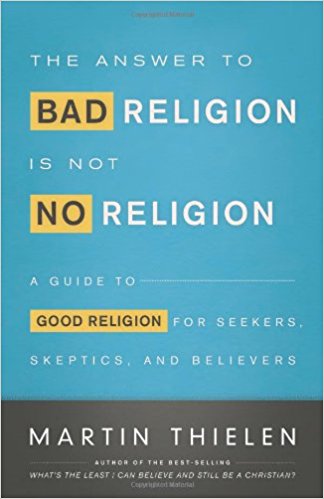 The Answer to Bad Religion Is Not No Religion: A Guide to Good Religion for Seekers, Skeptics and Believers Martin Thielen (WJK) $15.00 I hope you recall us telling of his colorful What’s the Least I Can Believe and Still Be a Christian which differentiates between essential core truths that are pretty much non-negotiable and, well, everything else. Thielen is, like Merritt, concerned about bad religion and here reminds us that “no religion” isn’t the answer. He offers a view of faith that isn’t hurtful or harmful and why we might endure, seeking better spiritual answers and practices. You want a dose of love, grace, forgiveness? You know folks who have been turned off, perhaps almost entirely so? Give this a try or share it with one who might feel that Christianity is more bad news than good.
The Answer to Bad Religion Is Not No Religion: A Guide to Good Religion for Seekers, Skeptics and Believers Martin Thielen (WJK) $15.00 I hope you recall us telling of his colorful What’s the Least I Can Believe and Still Be a Christian which differentiates between essential core truths that are pretty much non-negotiable and, well, everything else. Thielen is, like Merritt, concerned about bad religion and here reminds us that “no religion” isn’t the answer. He offers a view of faith that isn’t hurtful or harmful and why we might endure, seeking better spiritual answers and practices. You want a dose of love, grace, forgiveness? You know folks who have been turned off, perhaps almost entirely so? Give this a try or share it with one who might feel that Christianity is more bad news than good.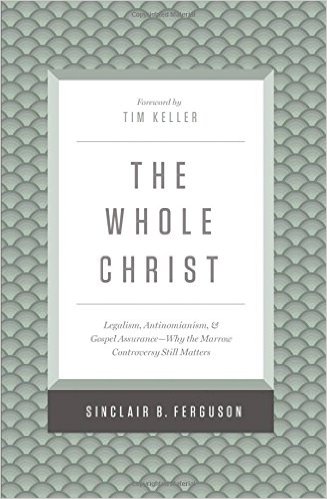 The Whole Christ: Legalism, Antinomianism, and Gospel Assurance–Why the Marrow Controversy Still Matters Sinclair Ferguson (Crossway Books) $24.99 Okay, here me out; I don’t think I’m just being ornery to include this exceedingly weighty tome about an 18th century Scottish Presbyterian controversy. If we’re going to convene a “panel discussion” to explore the insight and wisdom of Carol’s book, we have to sooner or later approach the question of whether her progressive views of God and grace and inclusion that seem so healing and helpful are theologically substantive, Biblically faithful, and how these formulations of faith compare with older more historic views. I don’t know if there is some way to blend her views with, say, historic Reformed thought about guilt and grace, but this book, written by a beloved Scottish theology professor and writer, explores an old controversy about legalism and grace and the role of the law in our spiritual growth. This is heady theological stuff, but some conservative evangelicals have said it is one of the most important books of the decade. Asking questions like this push us to consider first things: what is the gospel? Is talking about God’s good news in these sorts of terms overly harsh? Ferguson is a tough thinker and a kind man. As we journey towards caring for the wounded and offering warm grace to those turned off by toxic faith, we do have to grapple with what these sorts of books have to say. Whew.
The Whole Christ: Legalism, Antinomianism, and Gospel Assurance–Why the Marrow Controversy Still Matters Sinclair Ferguson (Crossway Books) $24.99 Okay, here me out; I don’t think I’m just being ornery to include this exceedingly weighty tome about an 18th century Scottish Presbyterian controversy. If we’re going to convene a “panel discussion” to explore the insight and wisdom of Carol’s book, we have to sooner or later approach the question of whether her progressive views of God and grace and inclusion that seem so healing and helpful are theologically substantive, Biblically faithful, and how these formulations of faith compare with older more historic views. I don’t know if there is some way to blend her views with, say, historic Reformed thought about guilt and grace, but this book, written by a beloved Scottish theology professor and writer, explores an old controversy about legalism and grace and the role of the law in our spiritual growth. This is heady theological stuff, but some conservative evangelicals have said it is one of the most important books of the decade. Asking questions like this push us to consider first things: what is the gospel? Is talking about God’s good news in these sorts of terms overly harsh? Ferguson is a tough thinker and a kind man. As we journey towards caring for the wounded and offering warm grace to those turned off by toxic faith, we do have to grapple with what these sorts of books have to say. Whew.